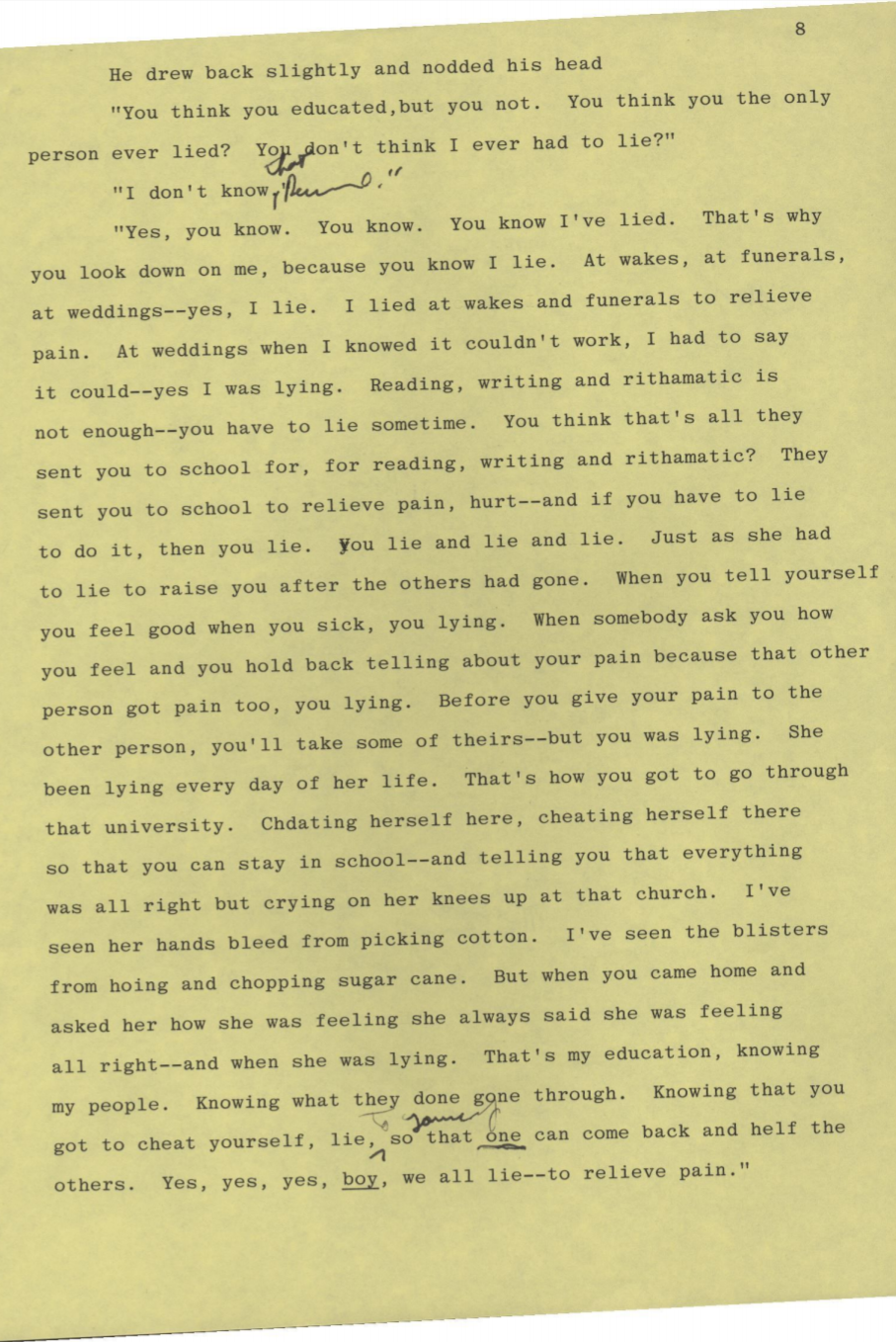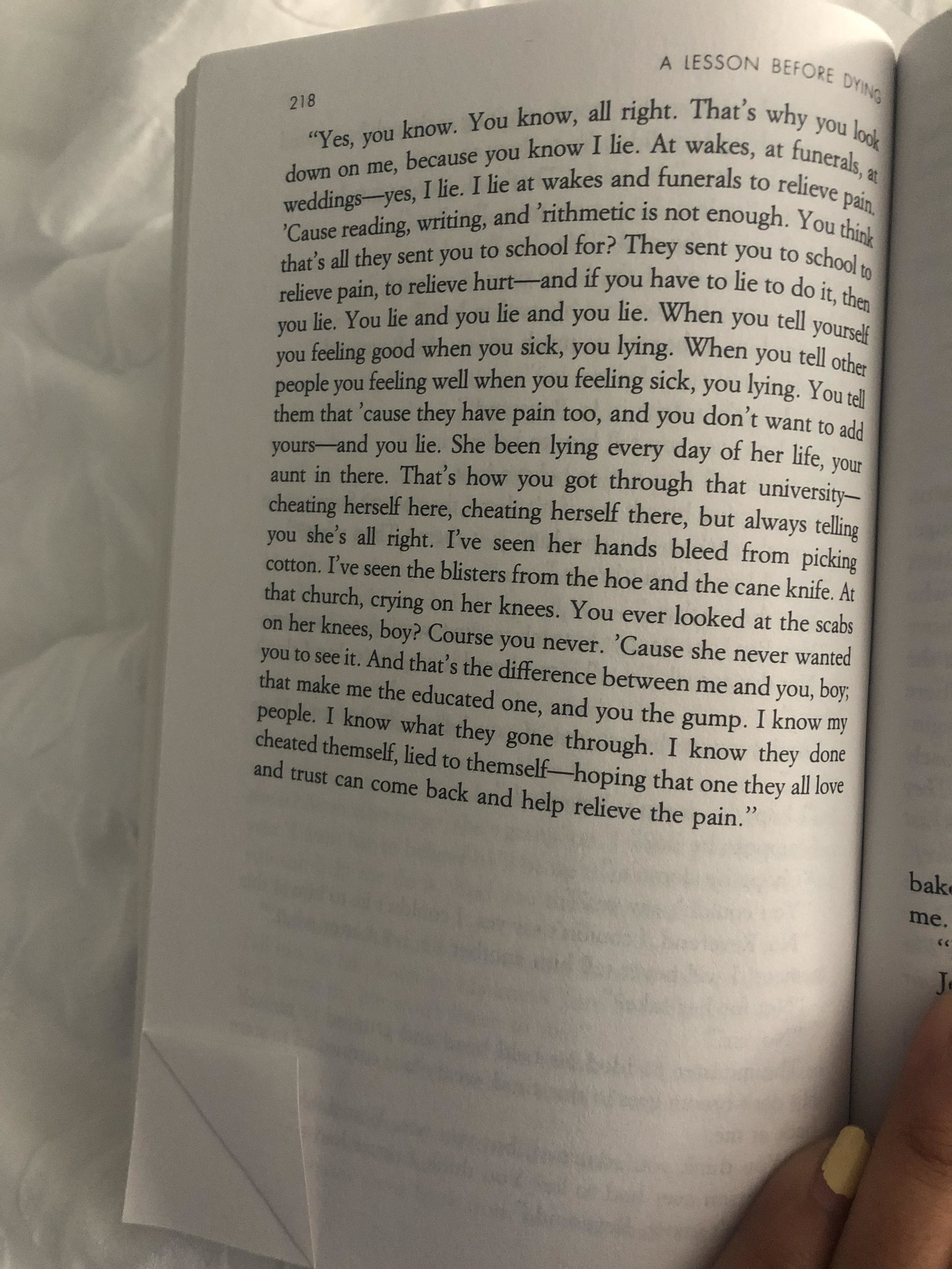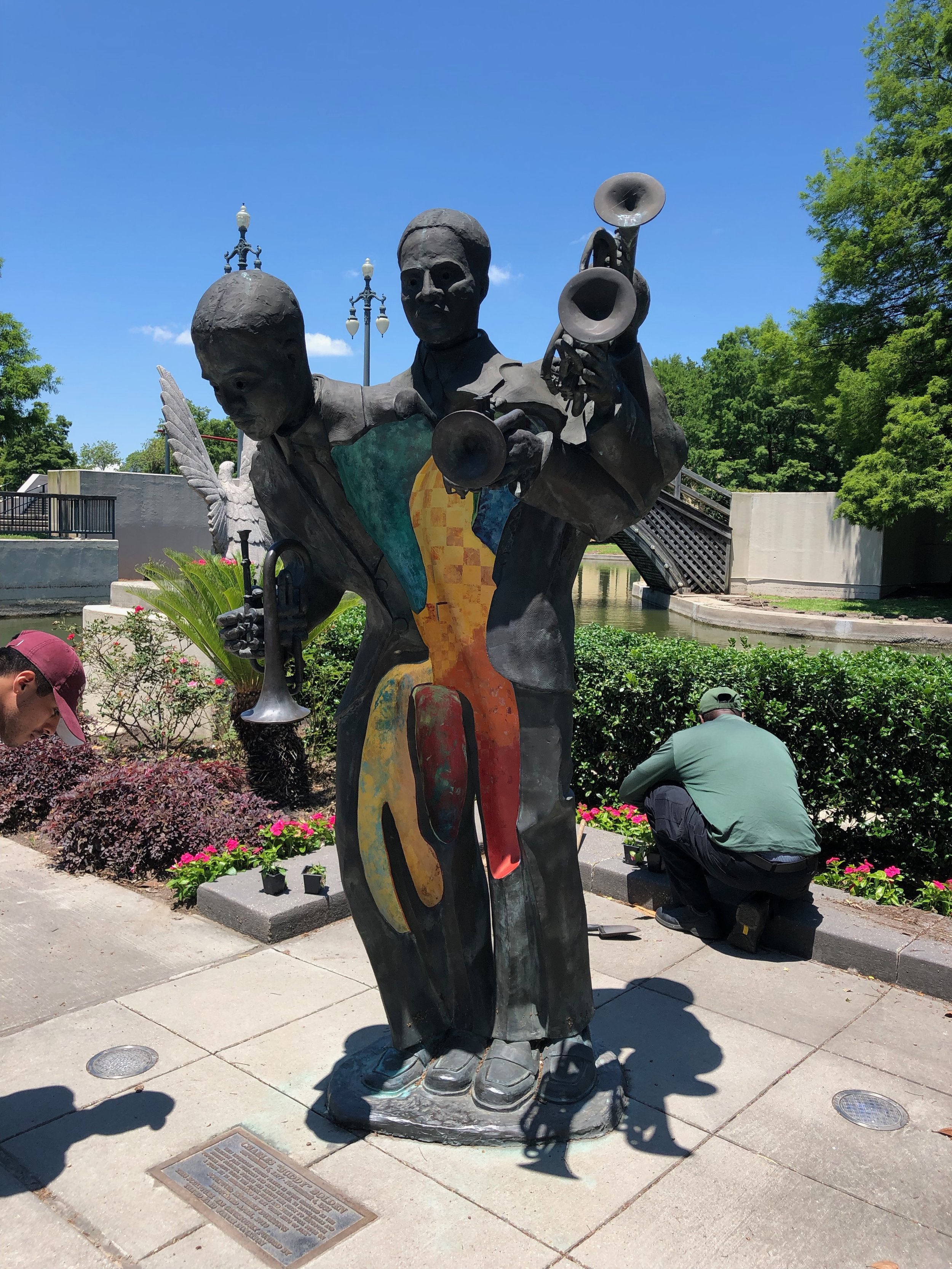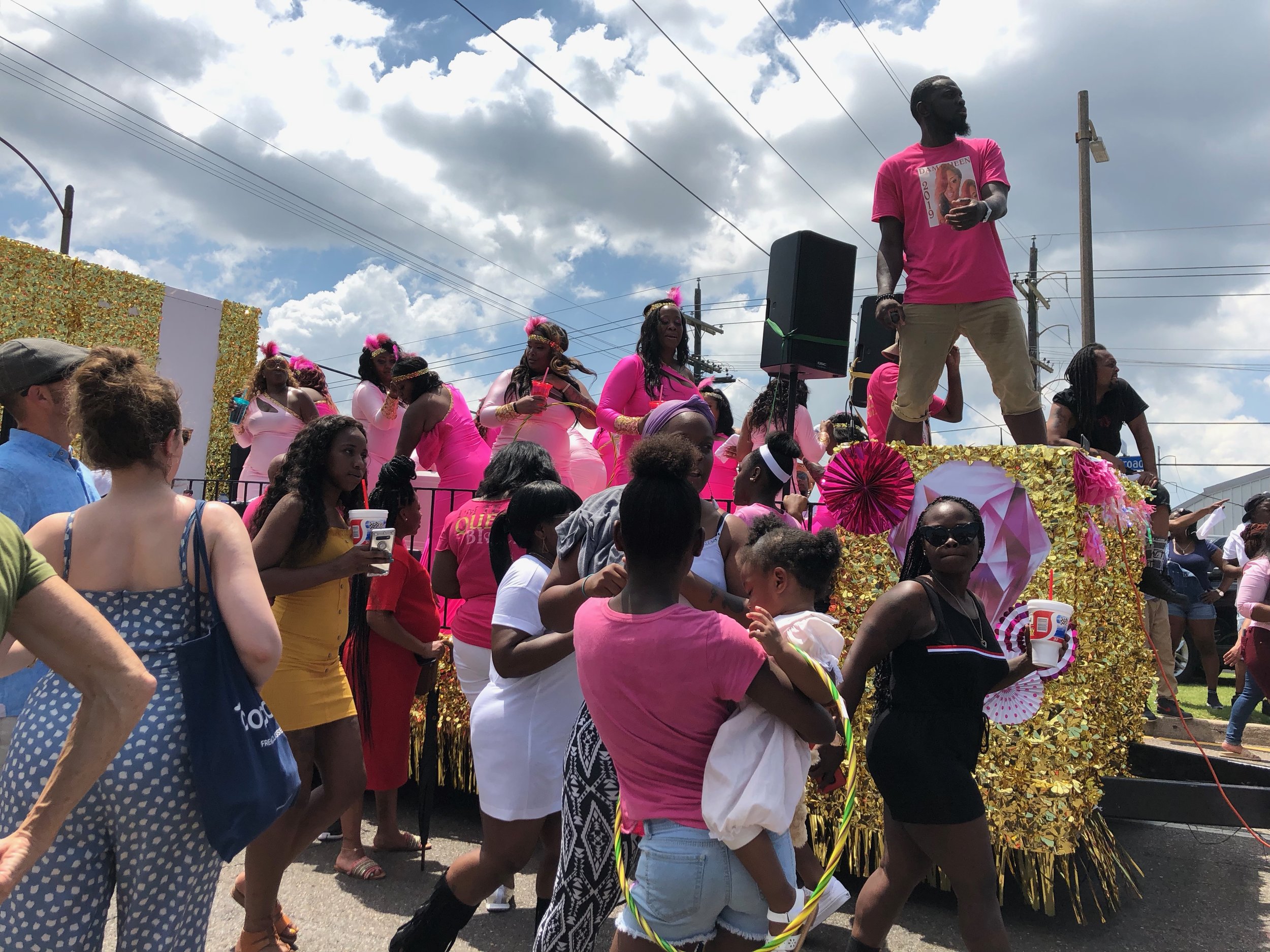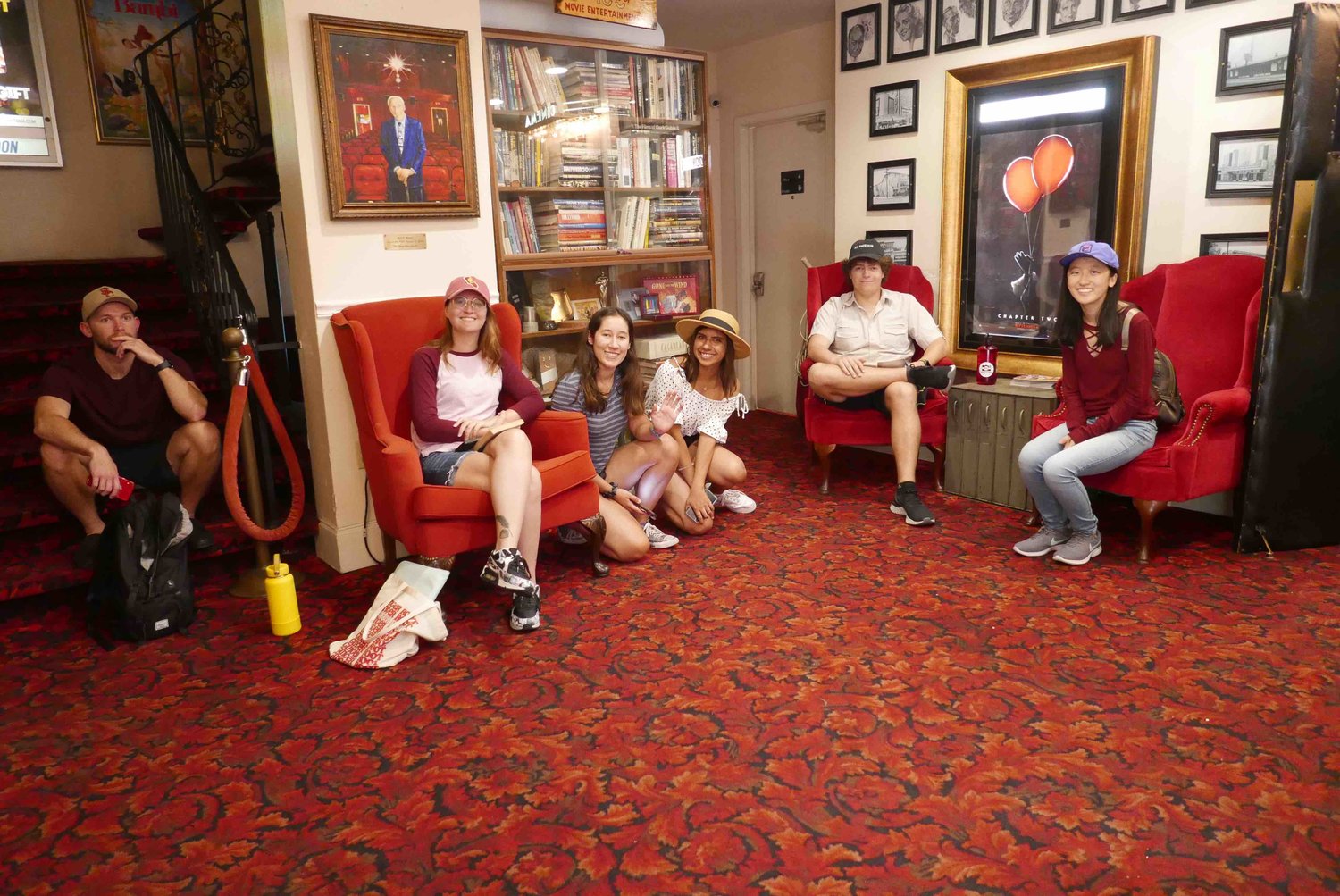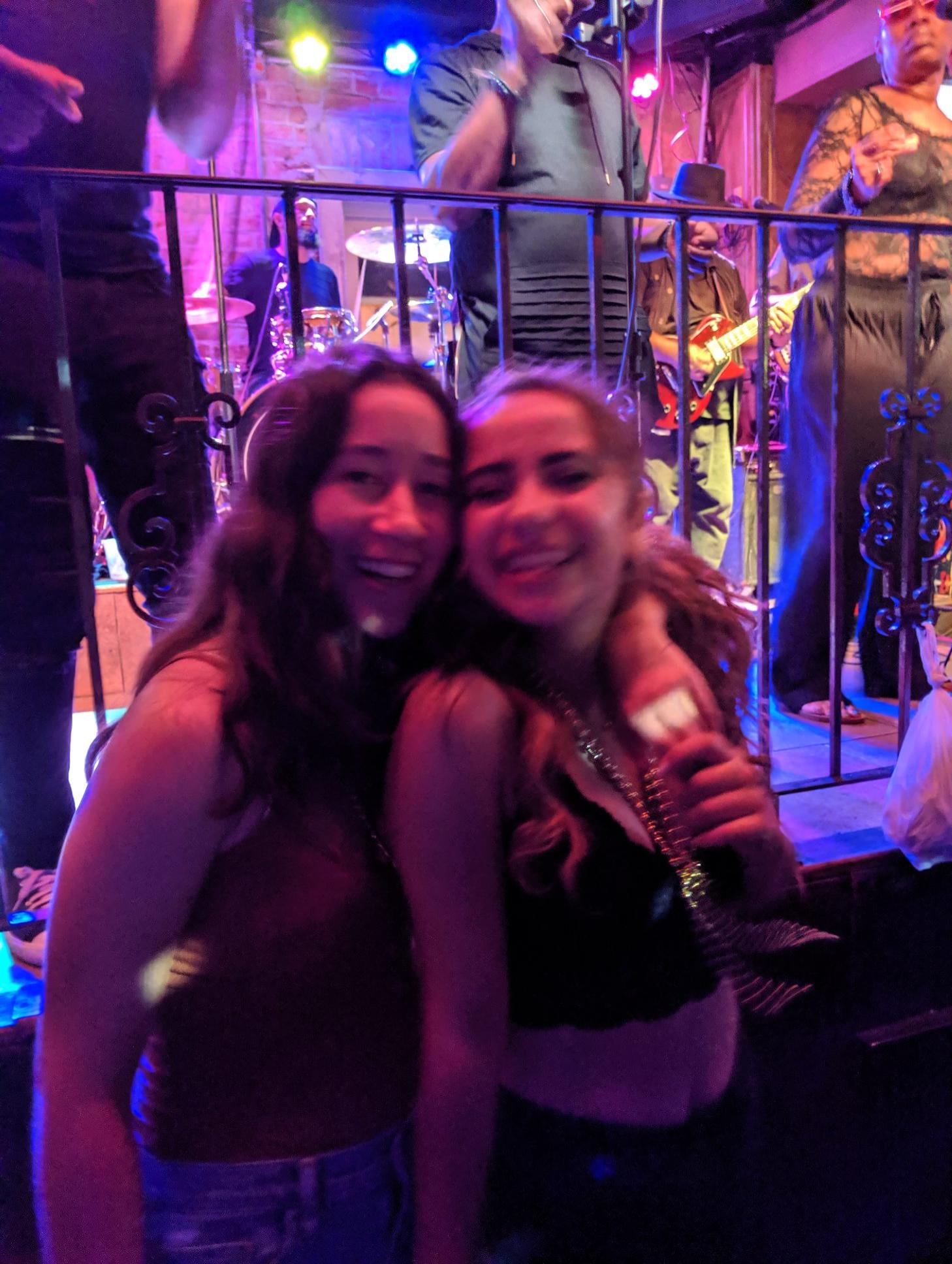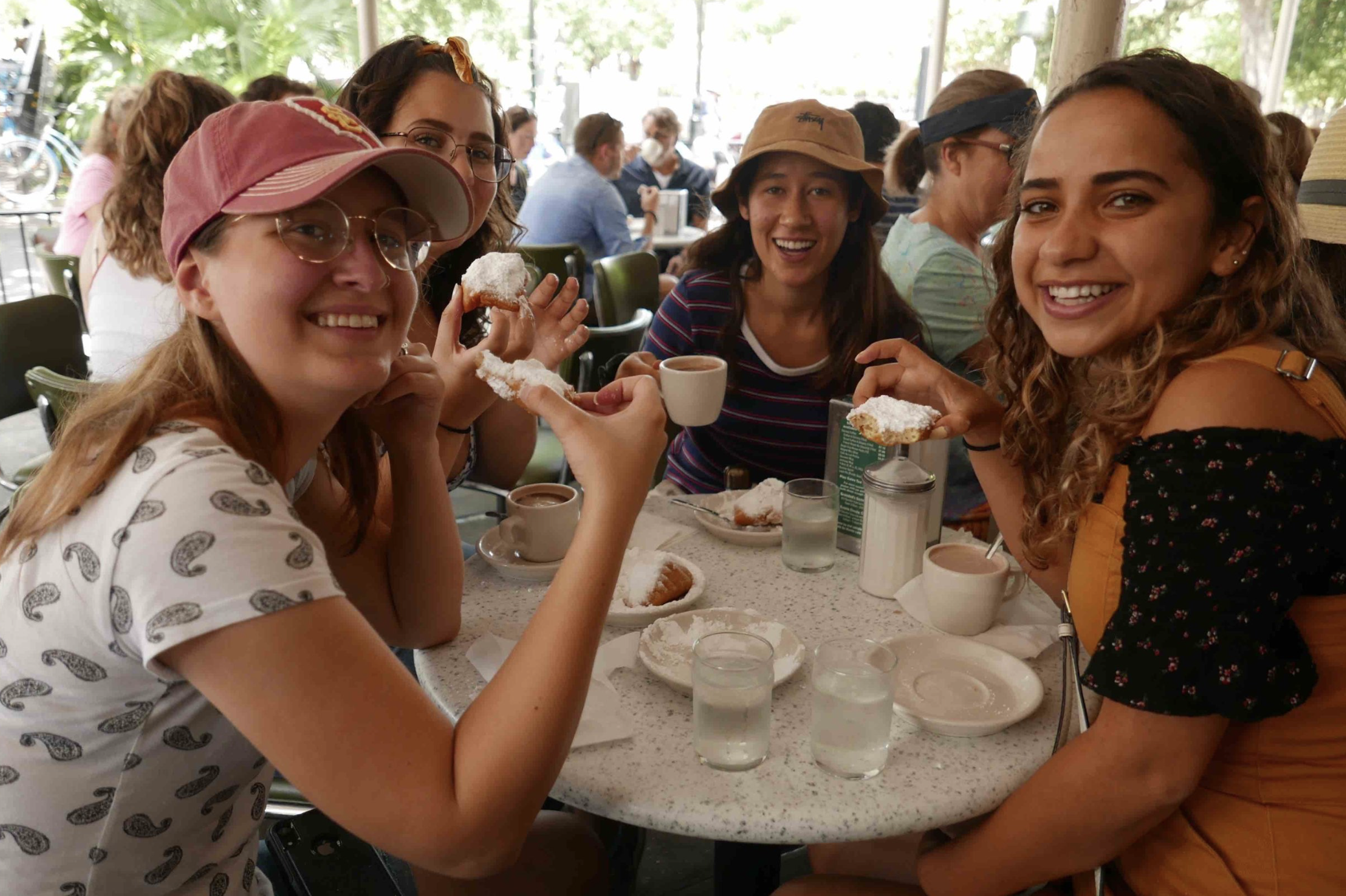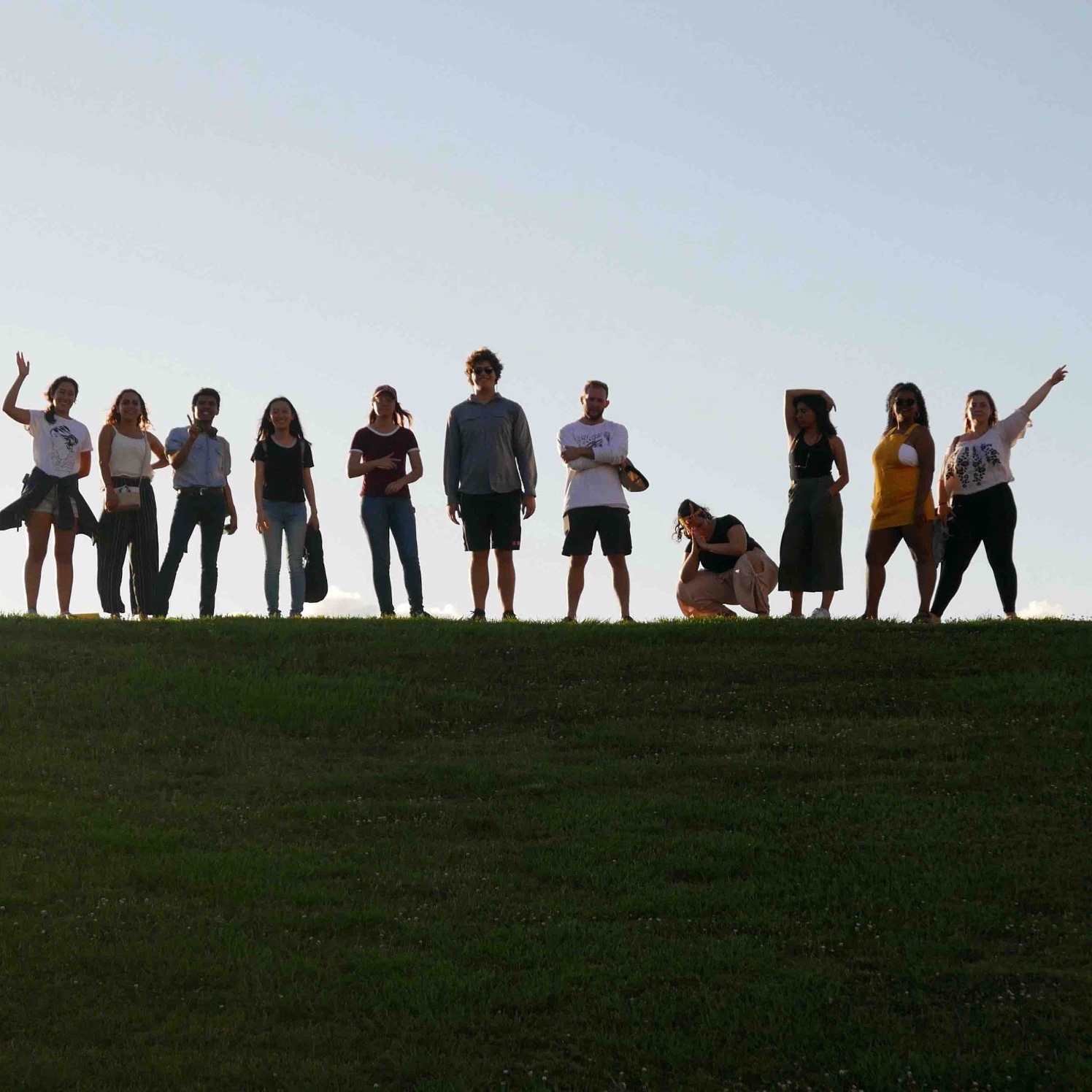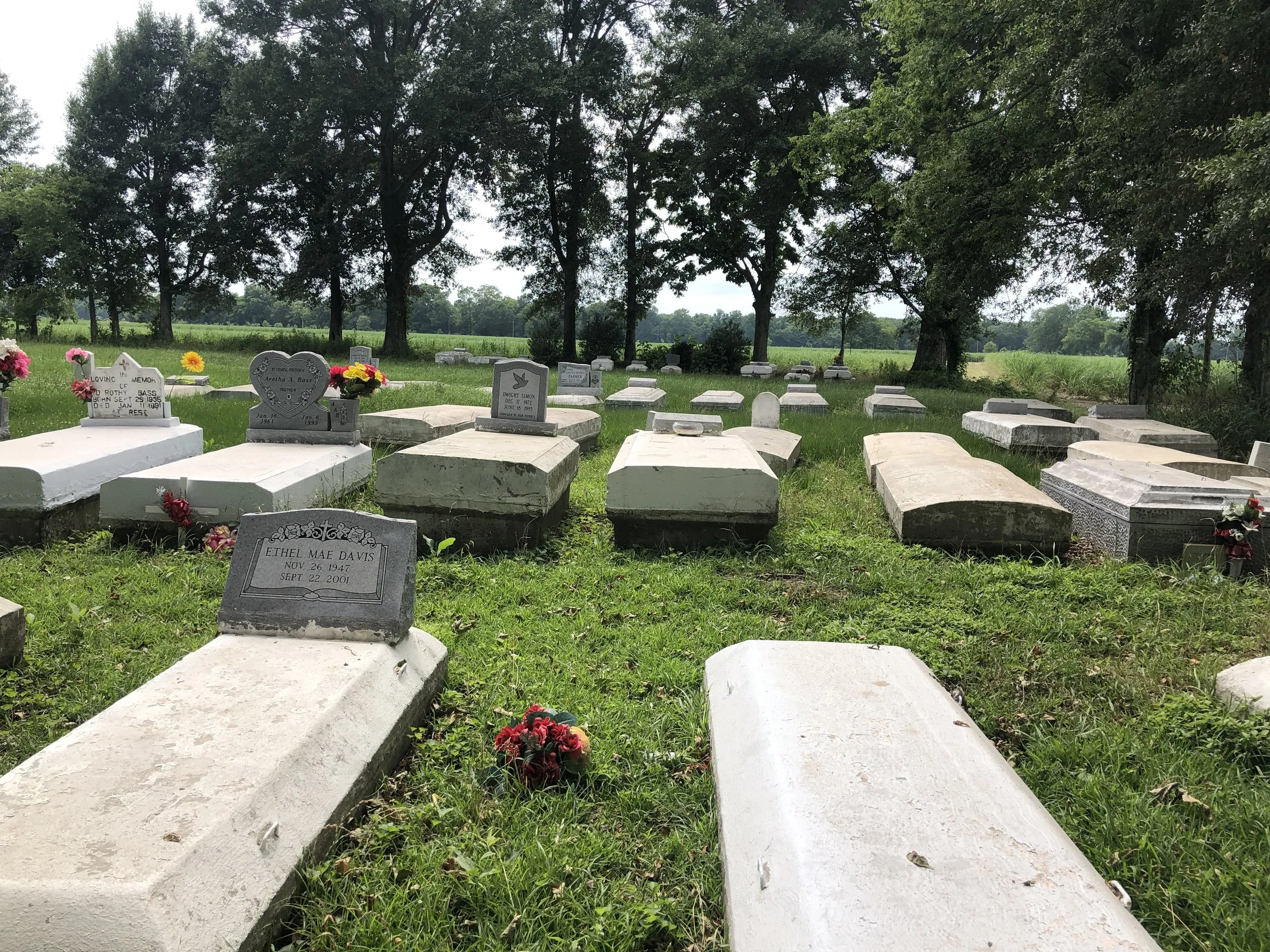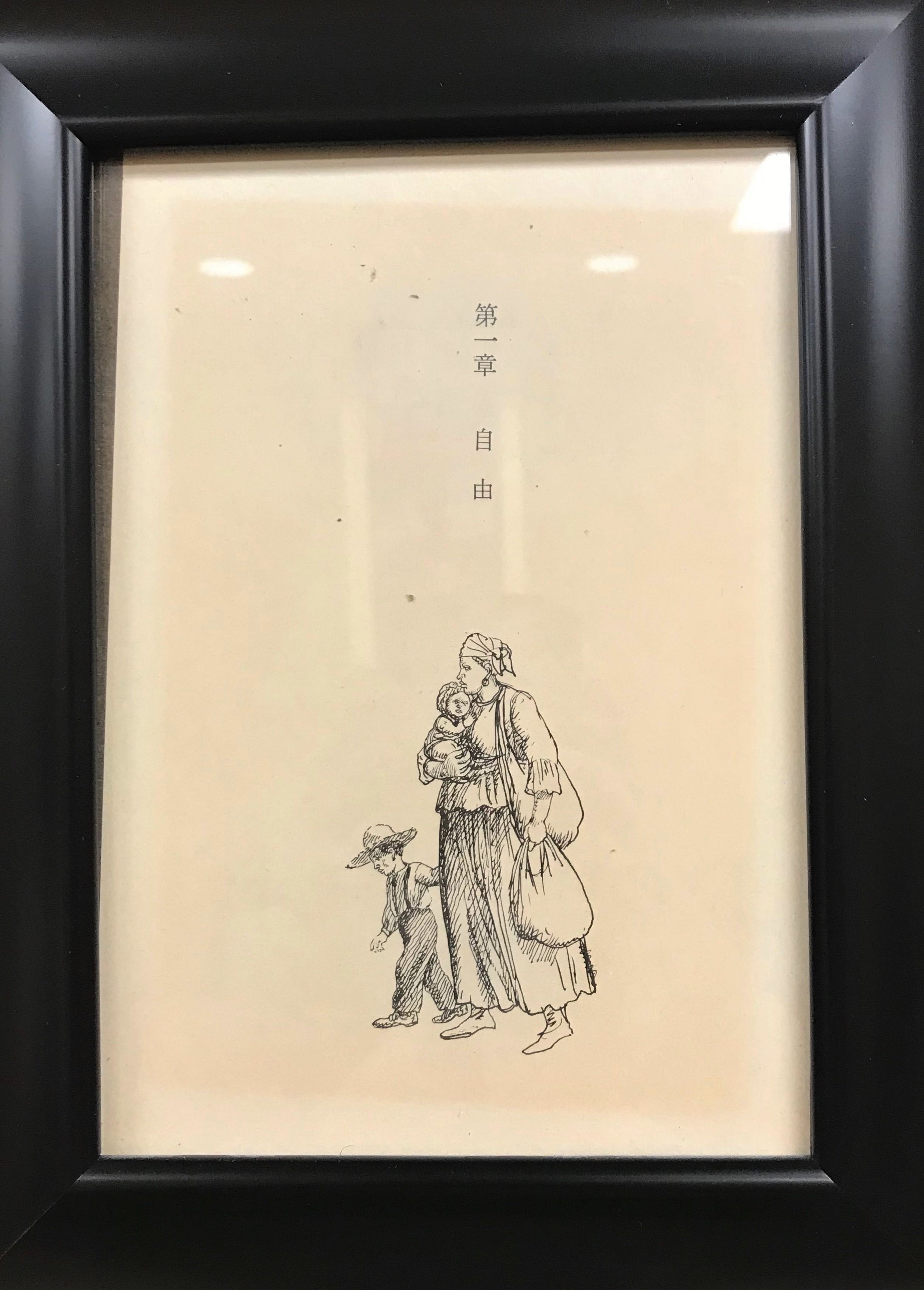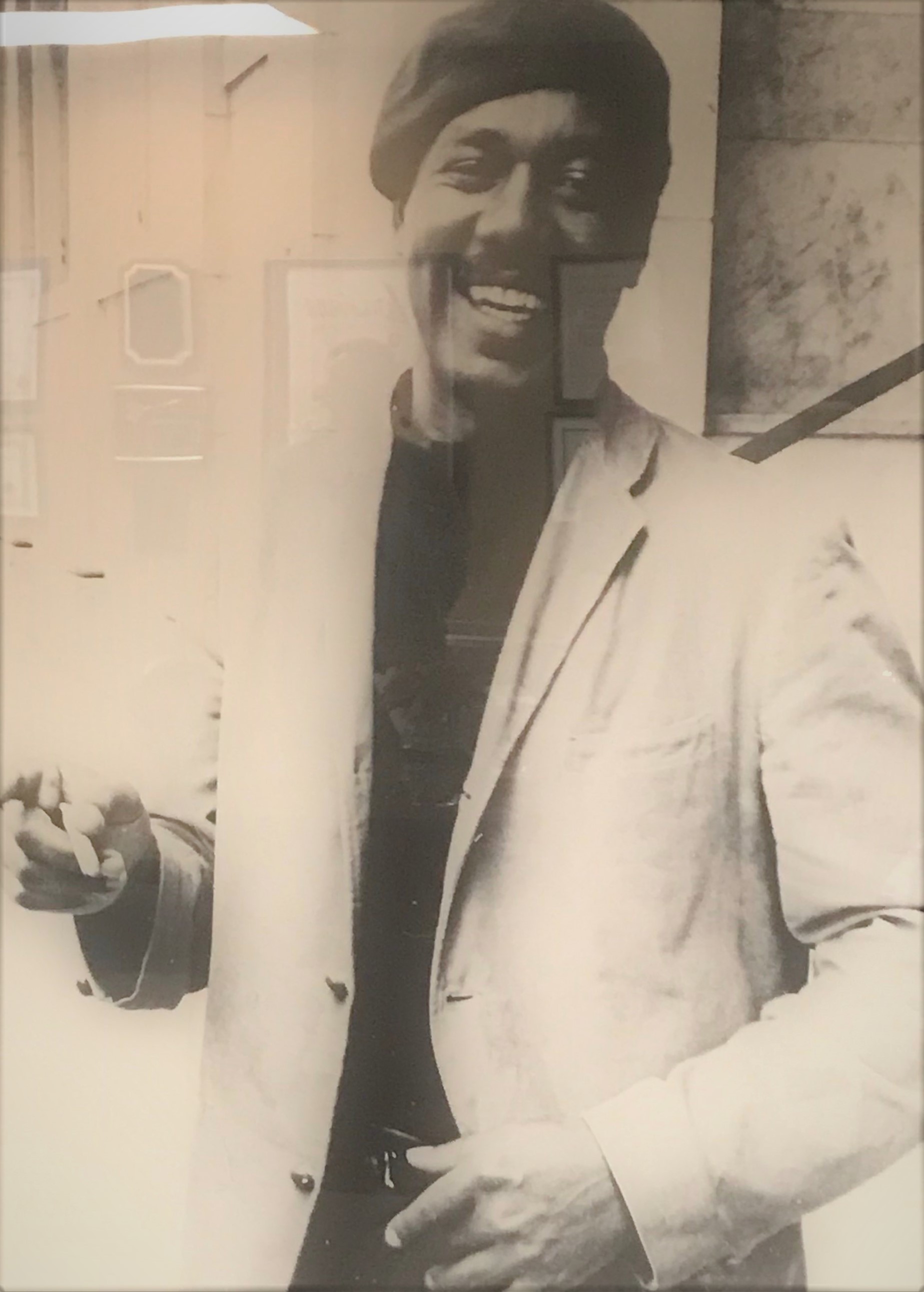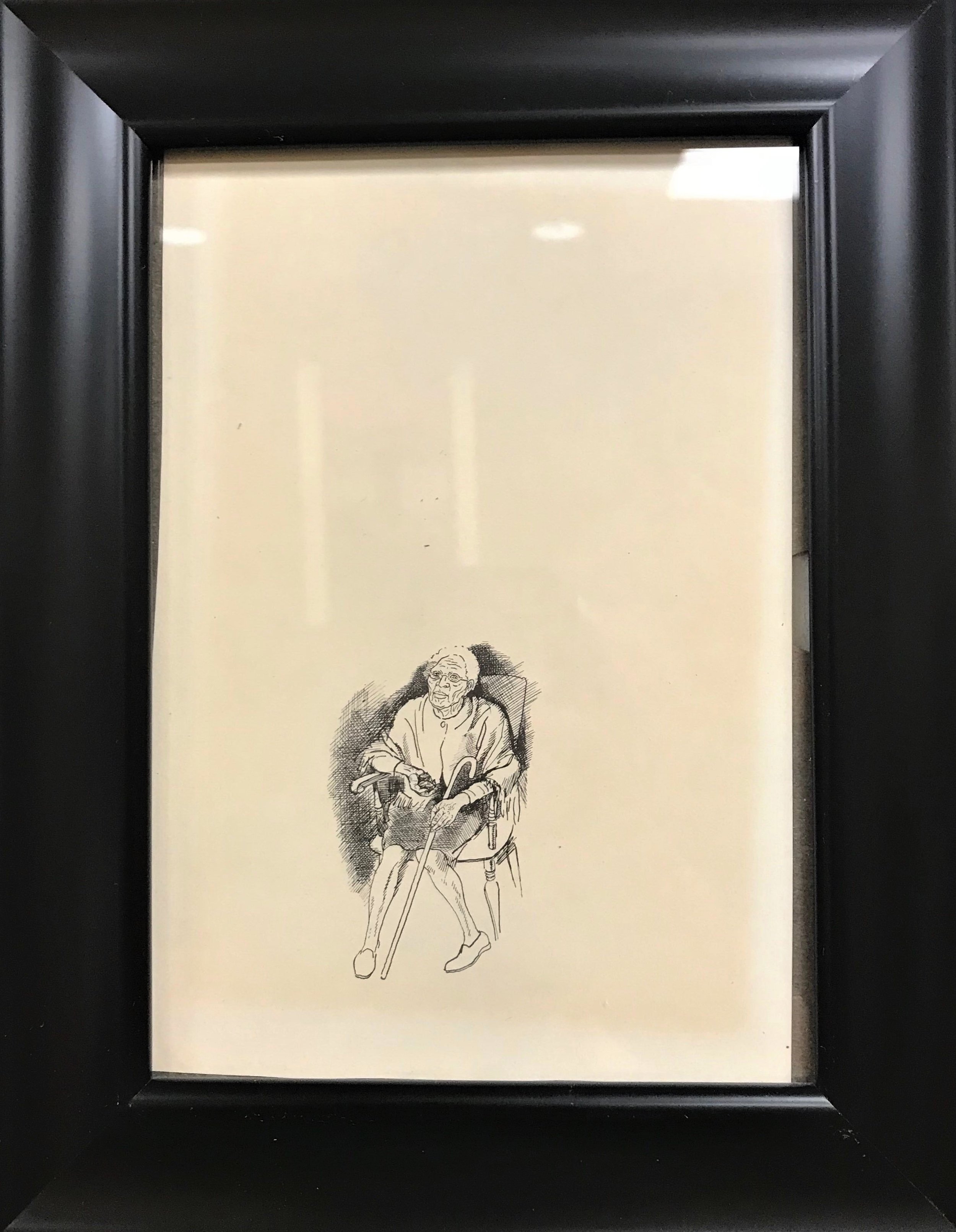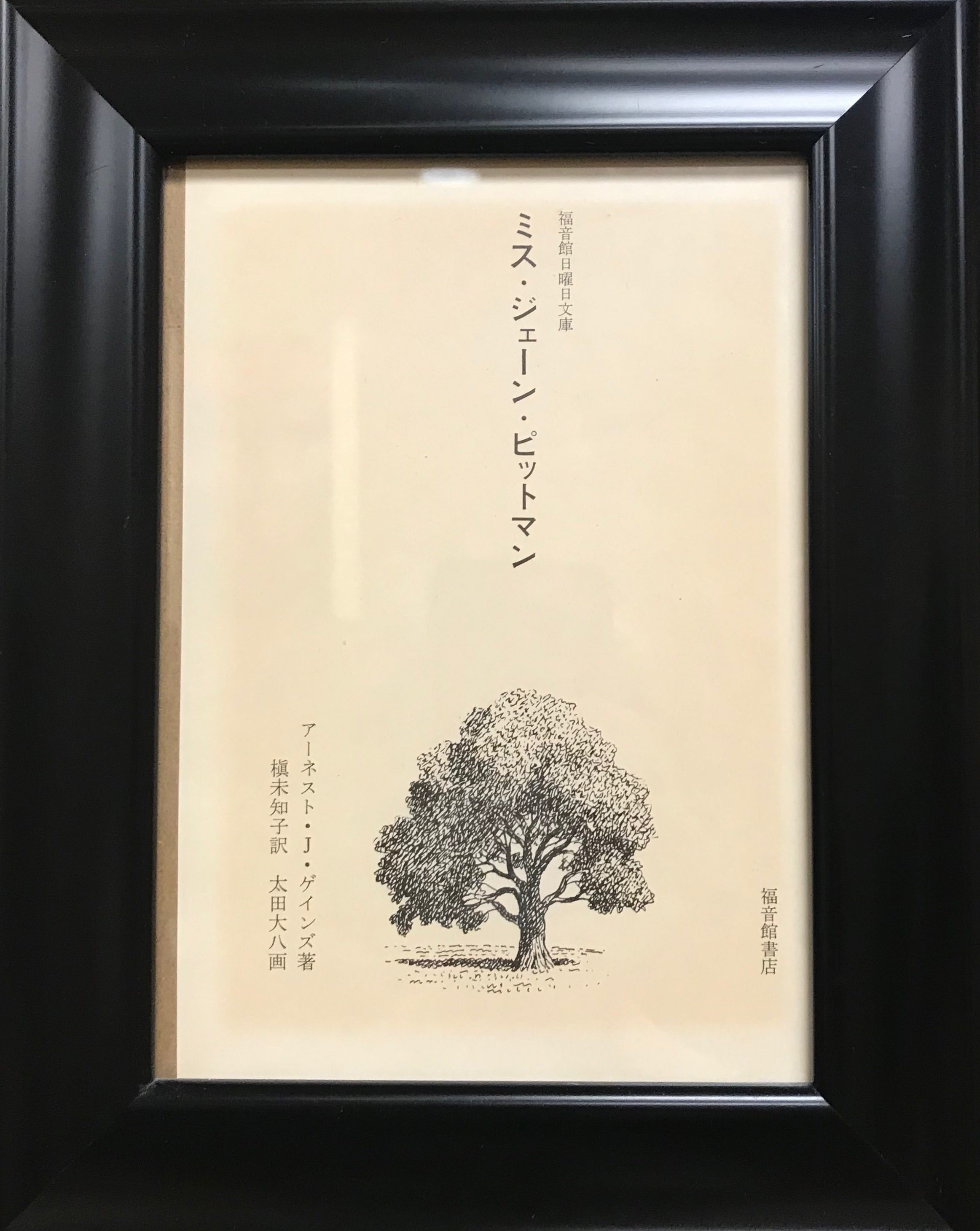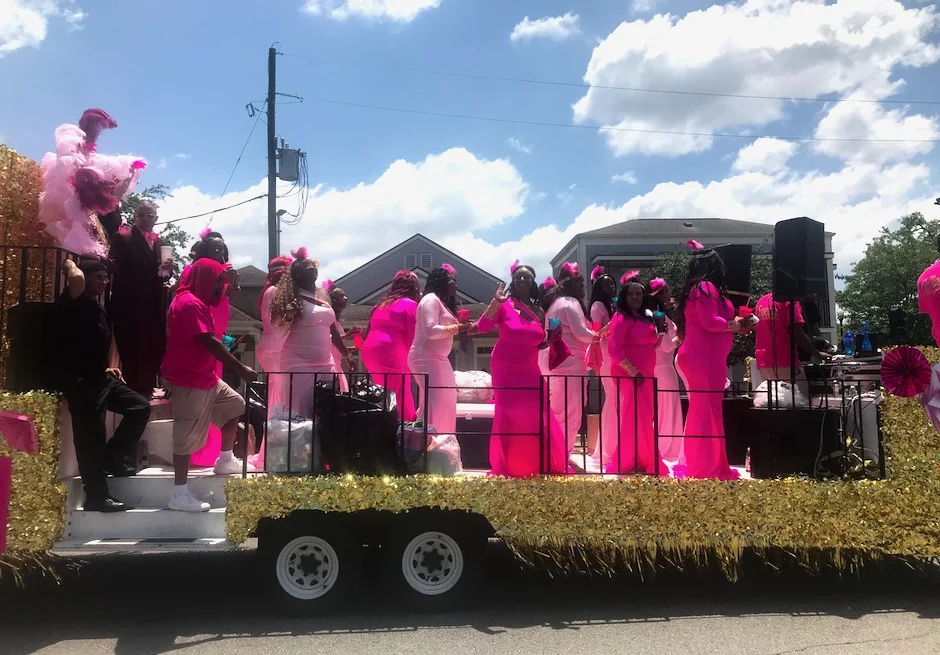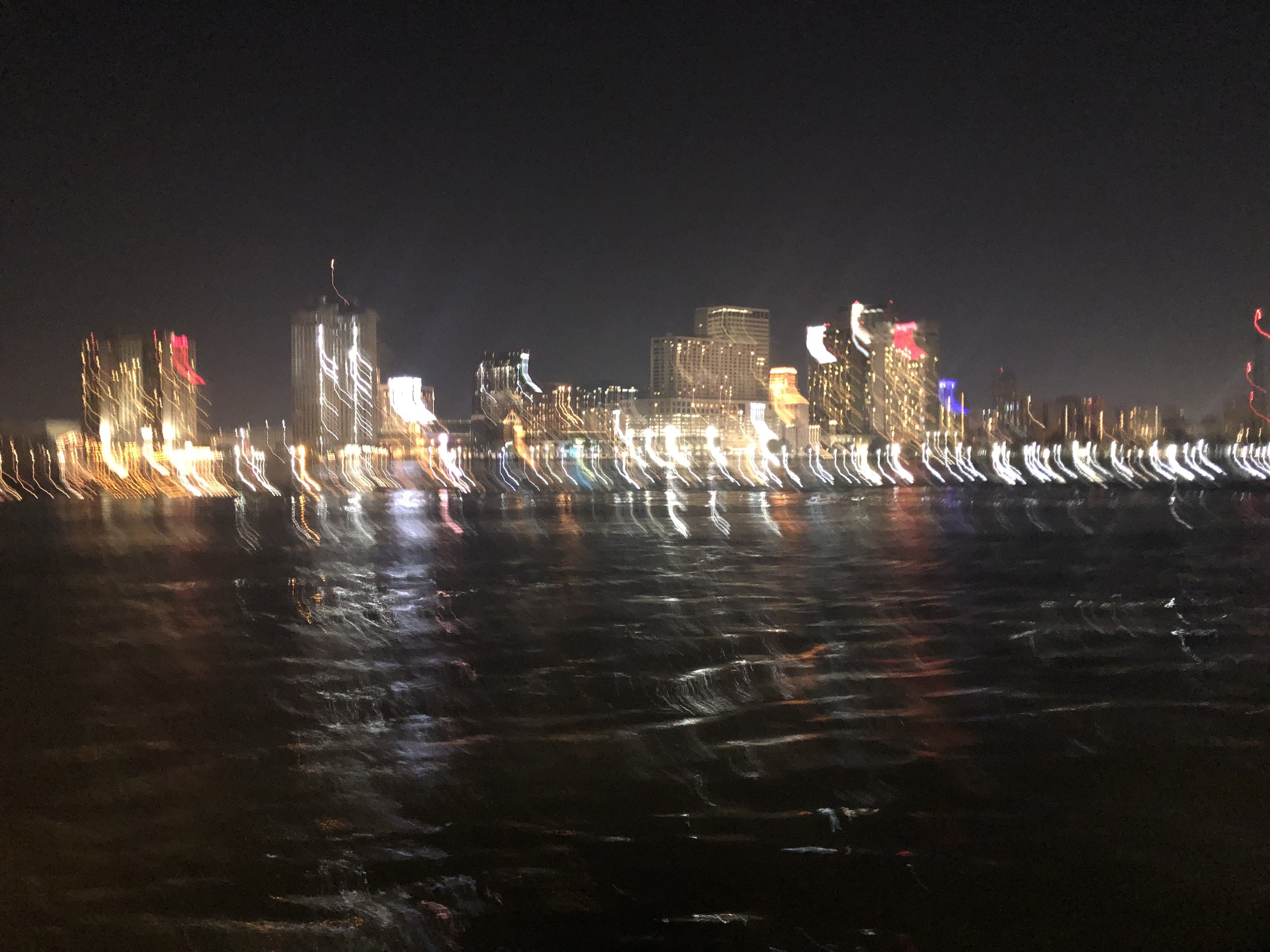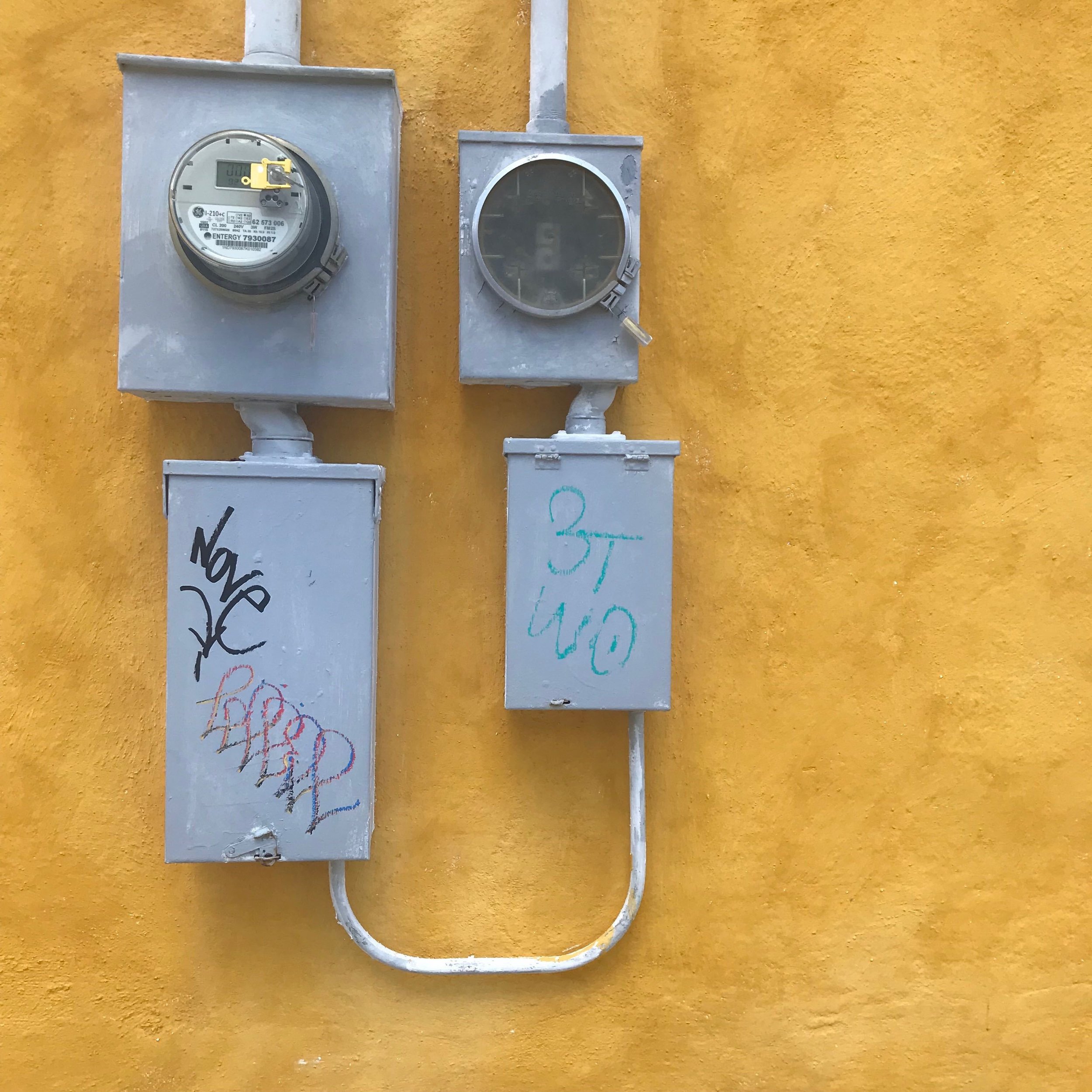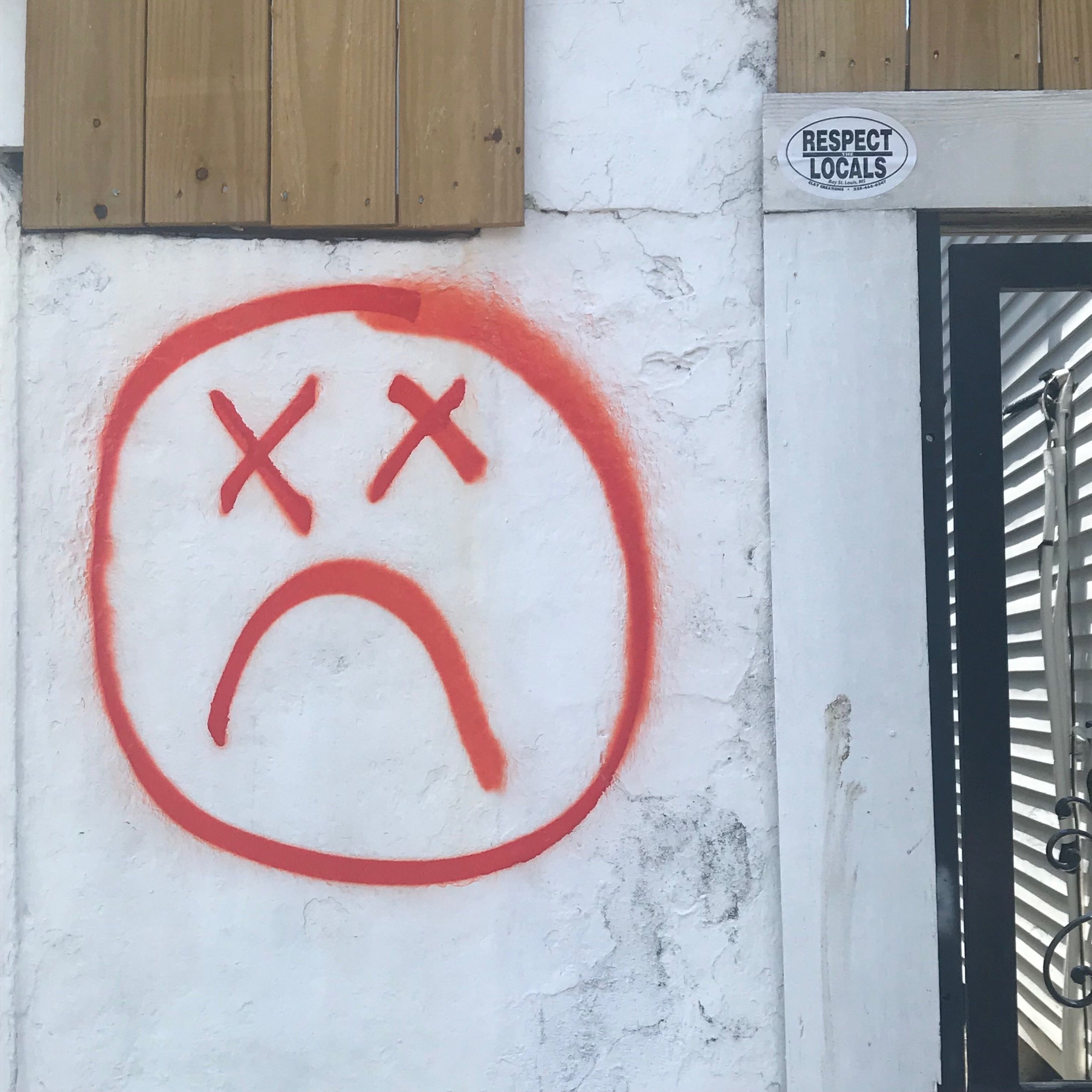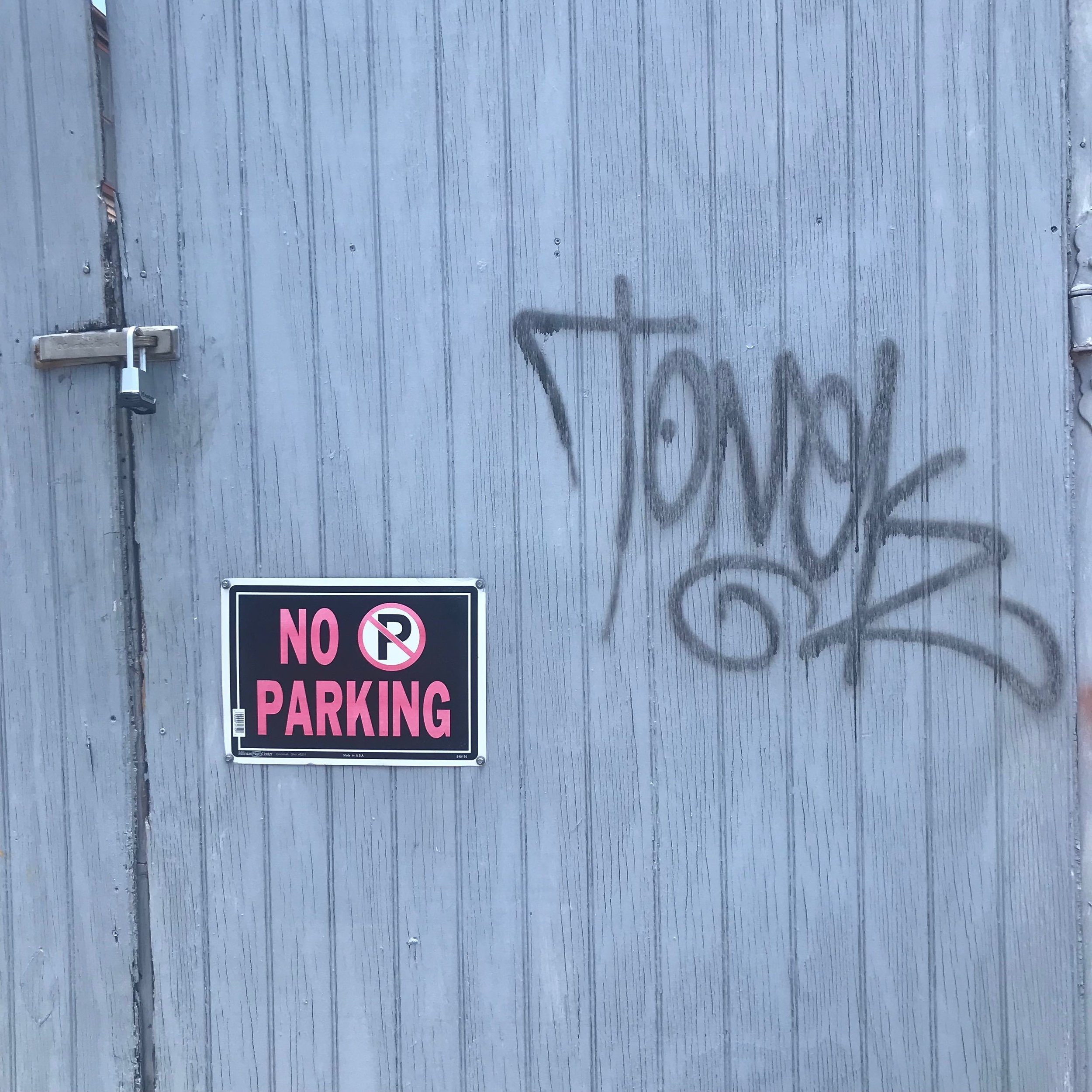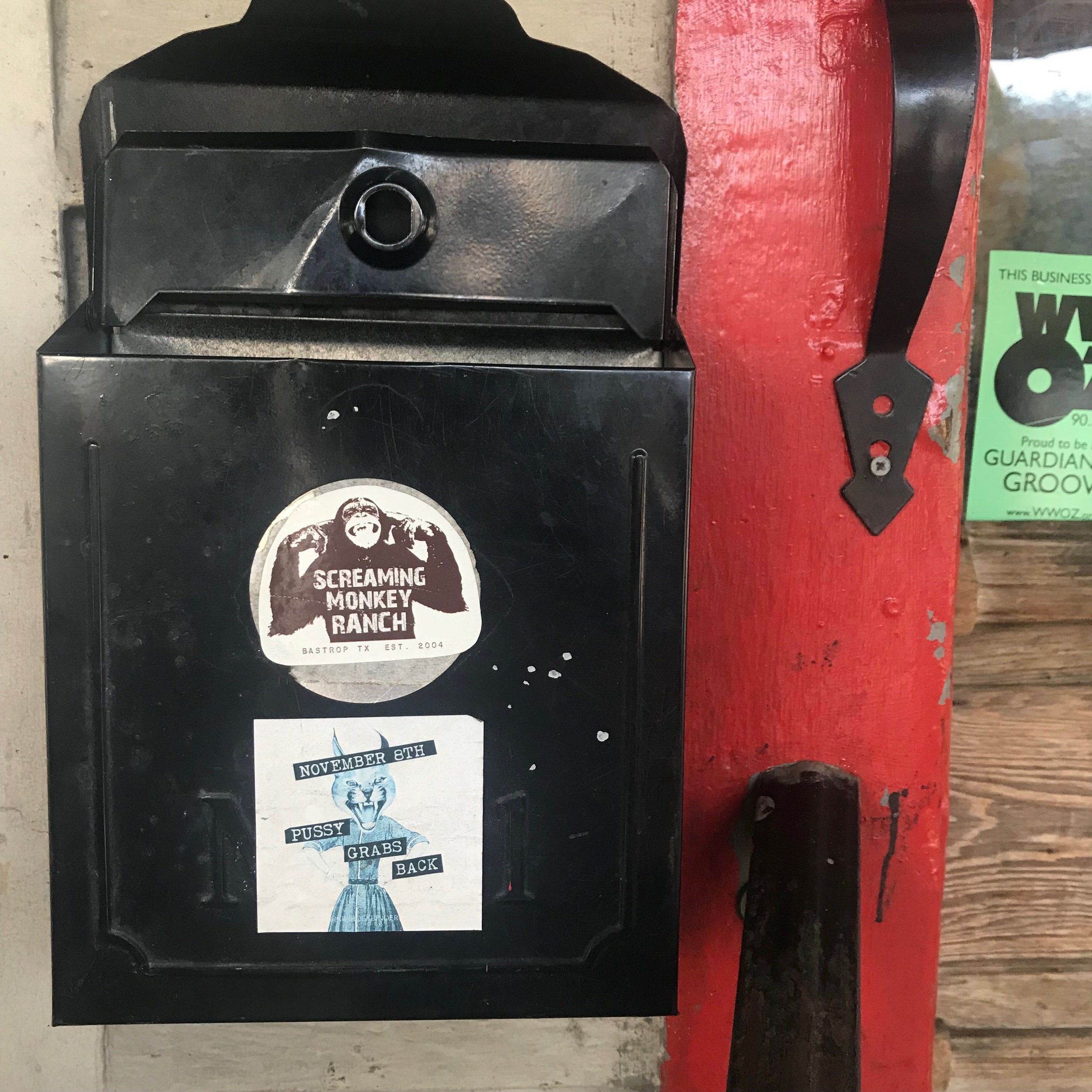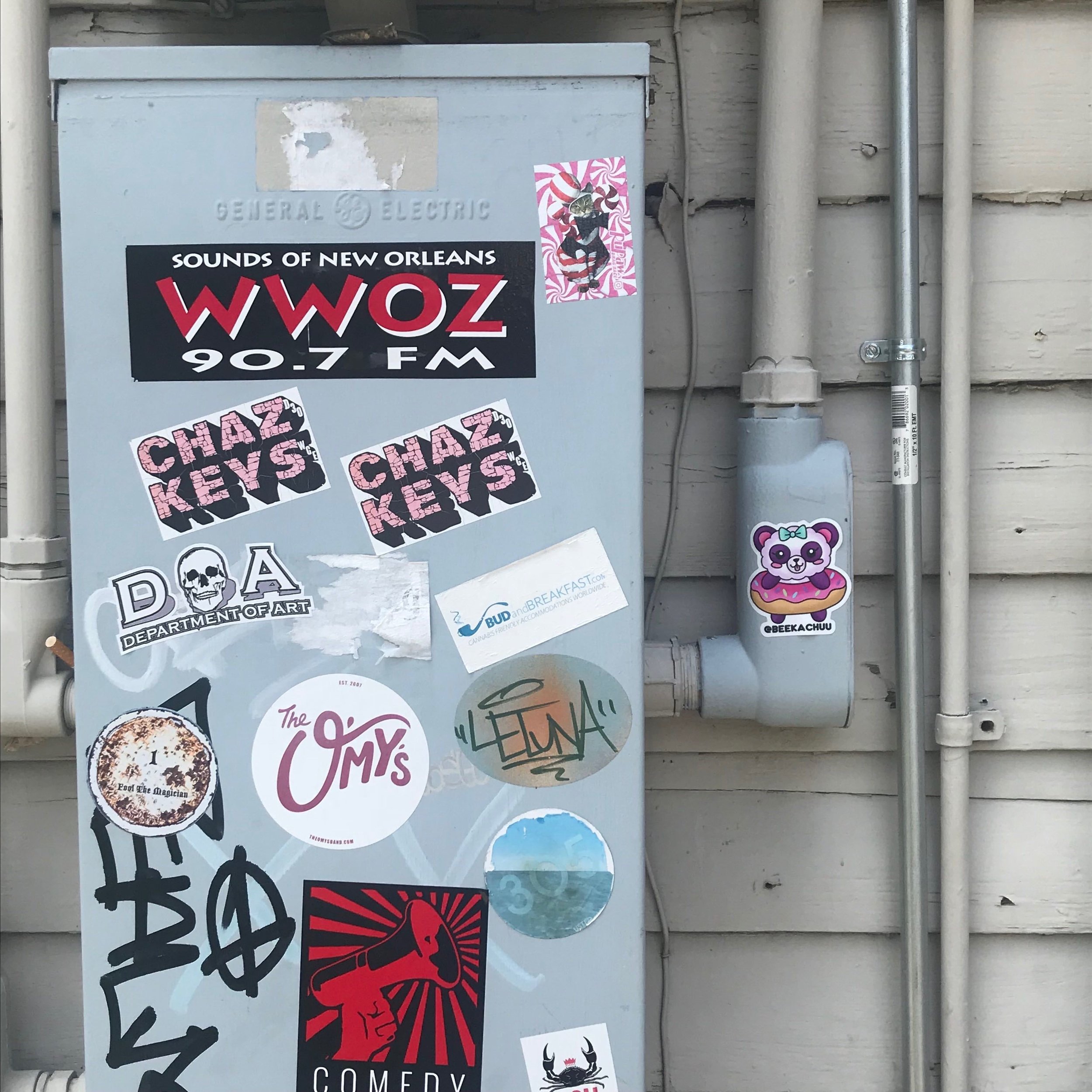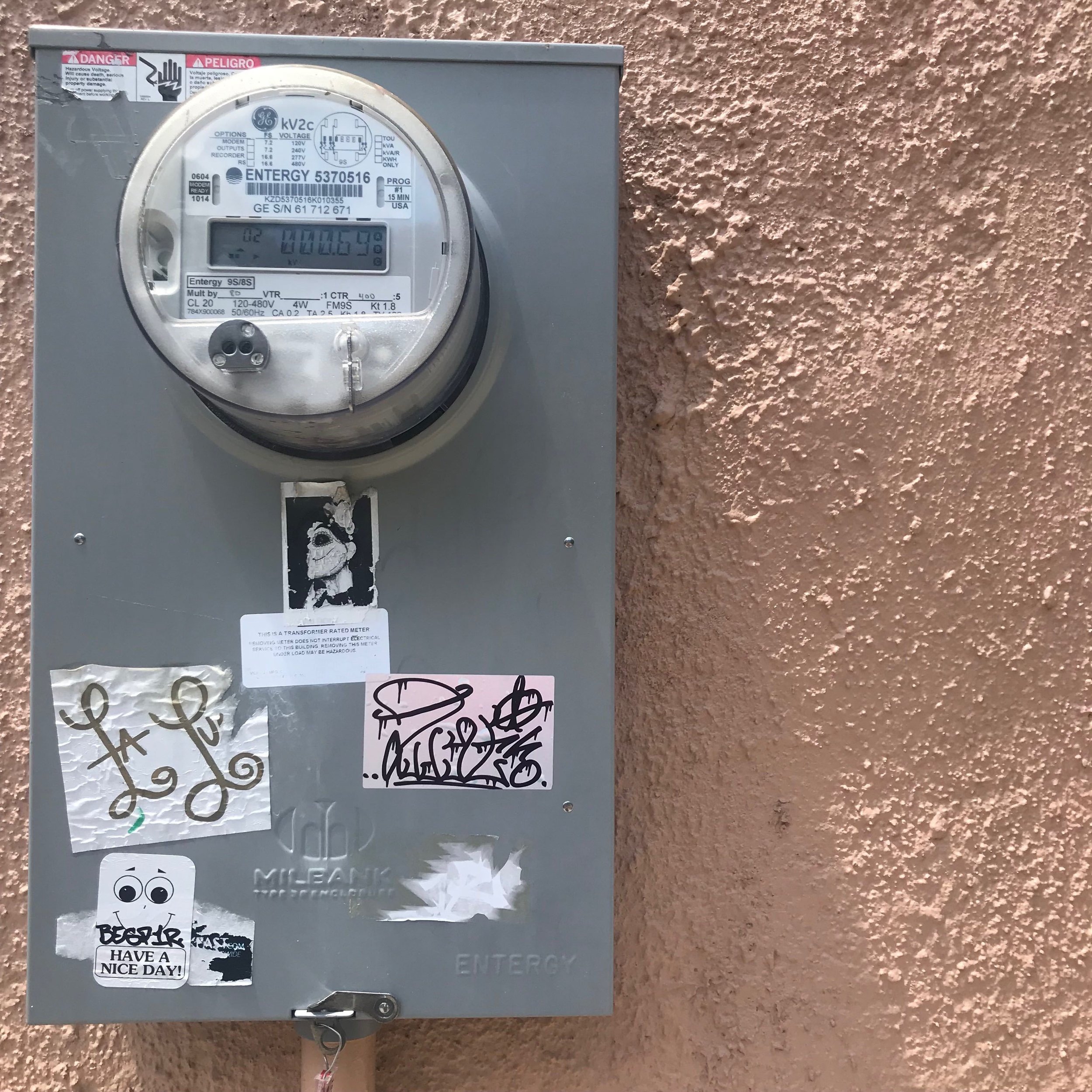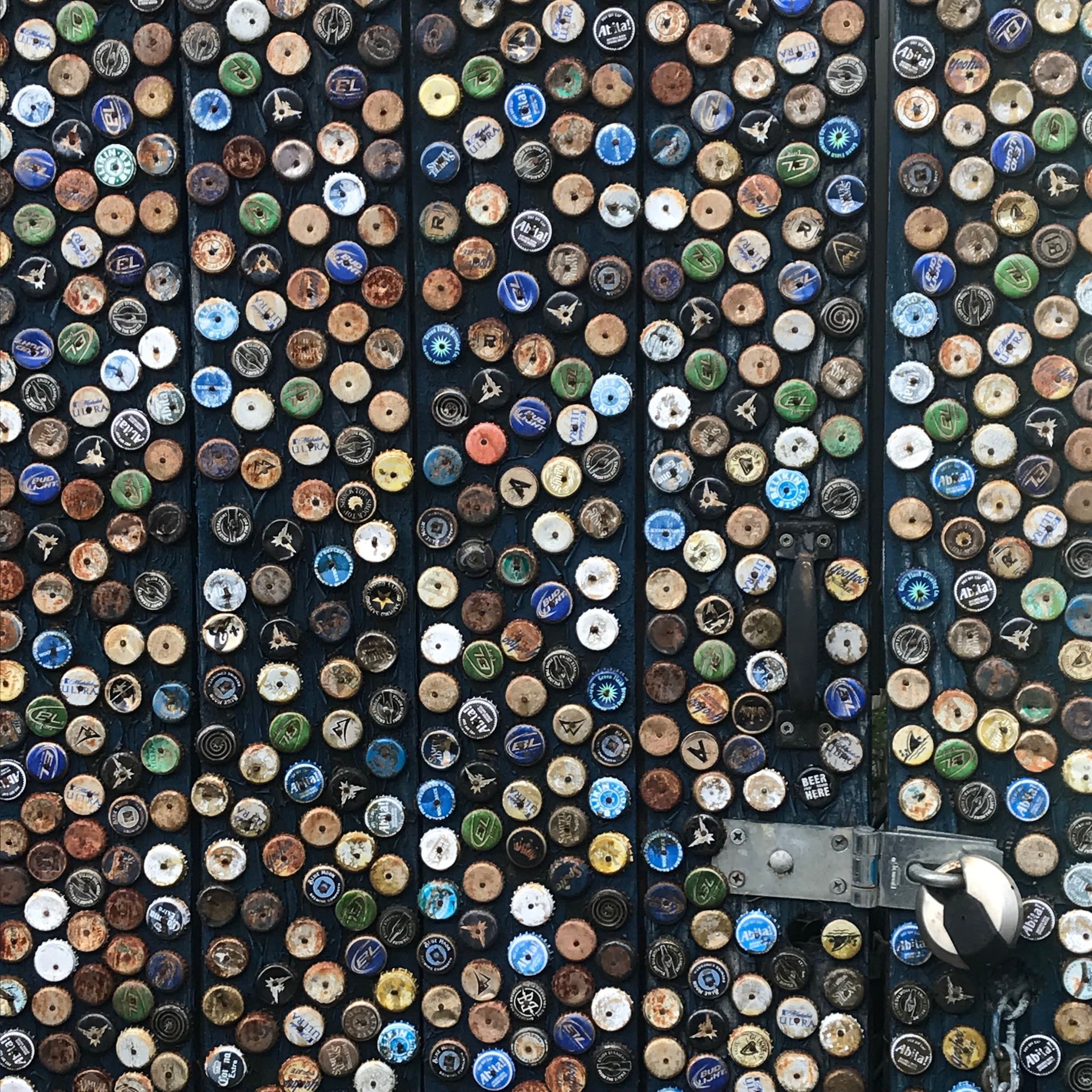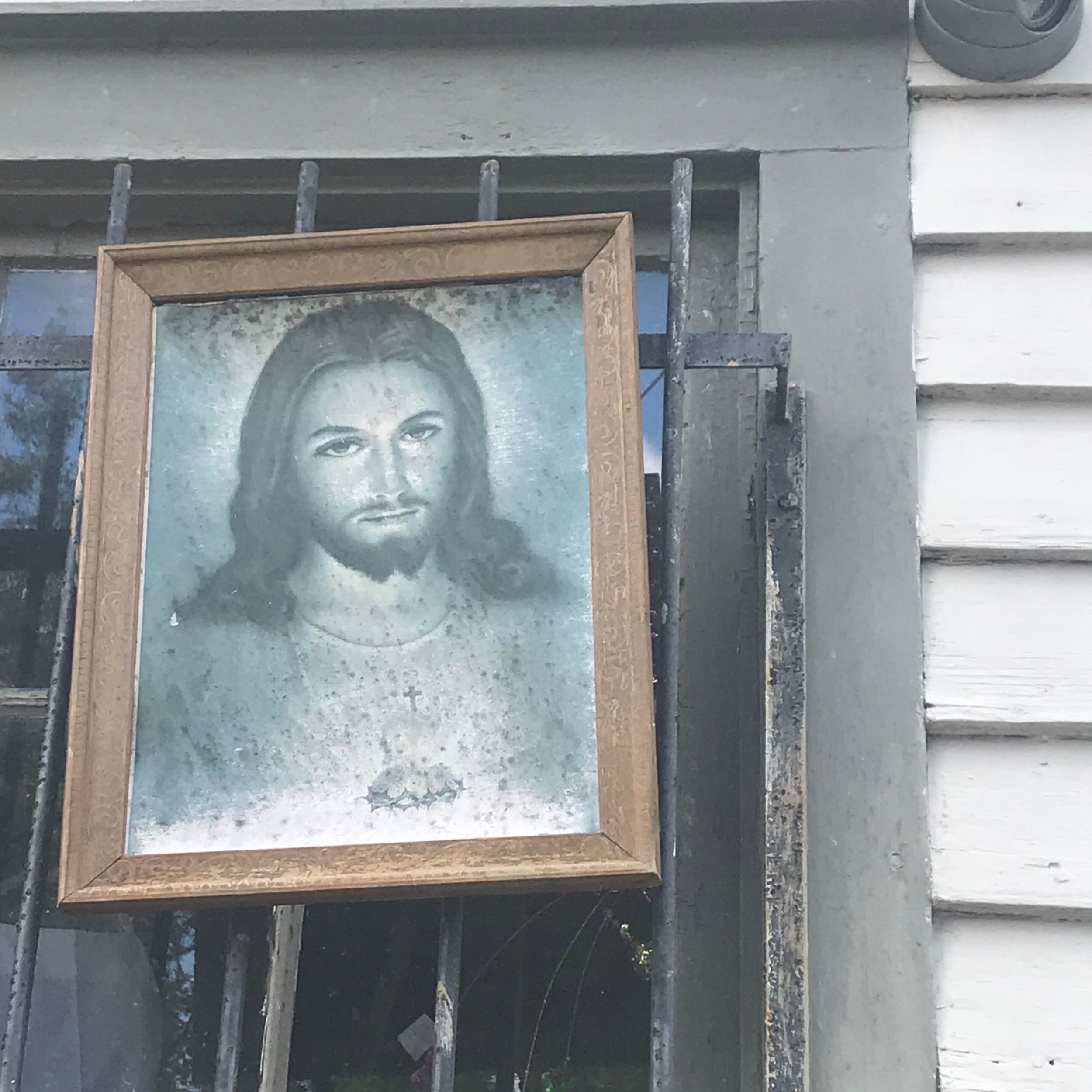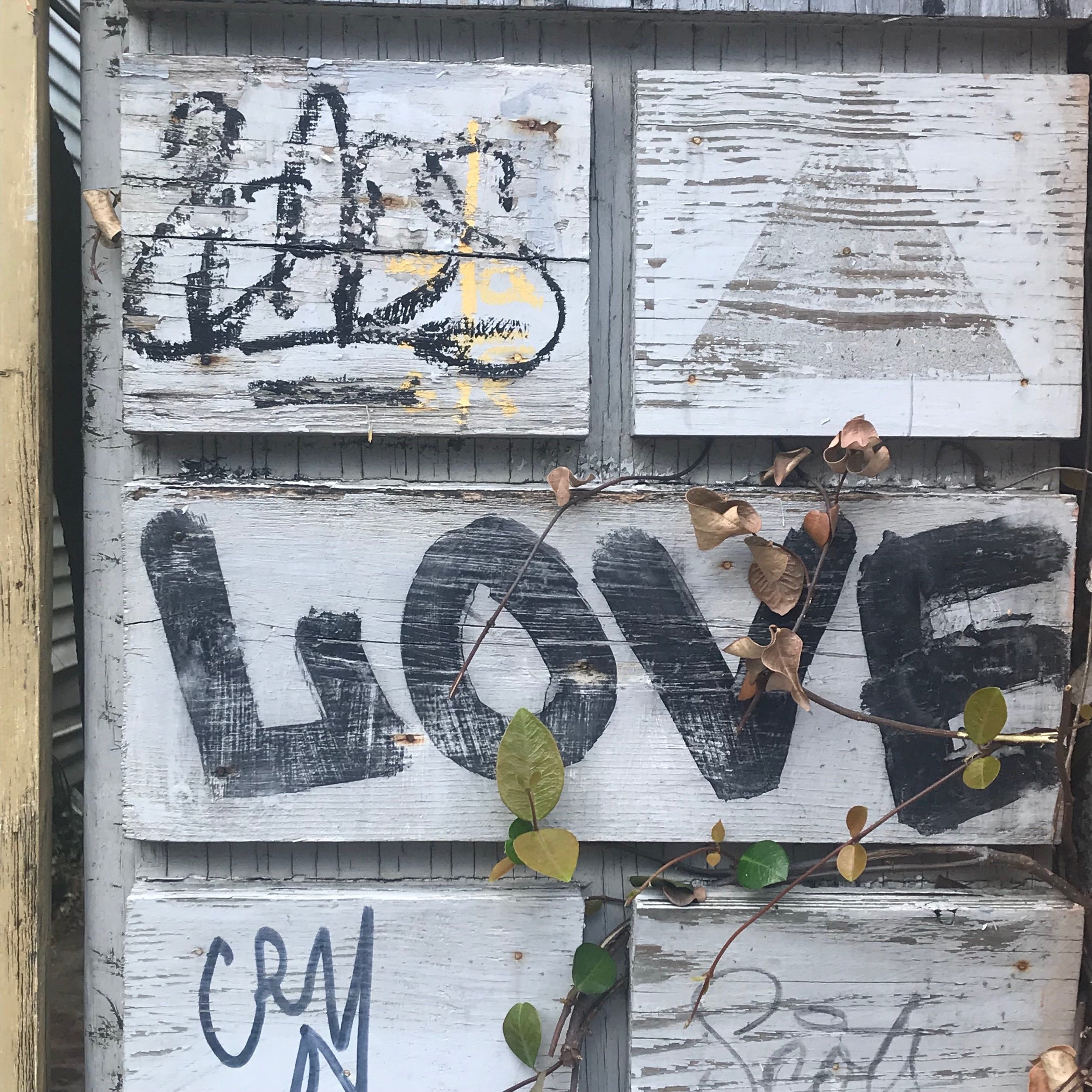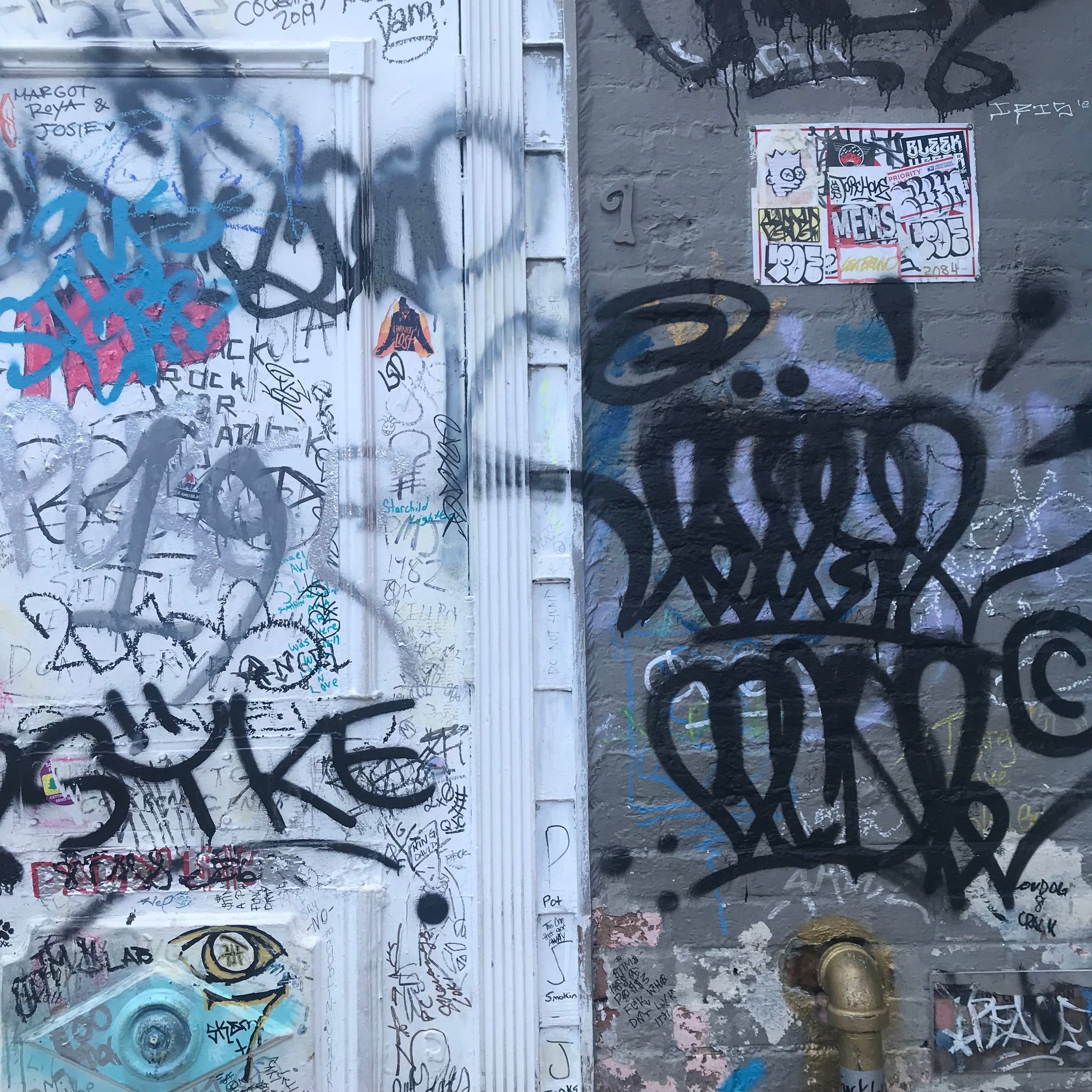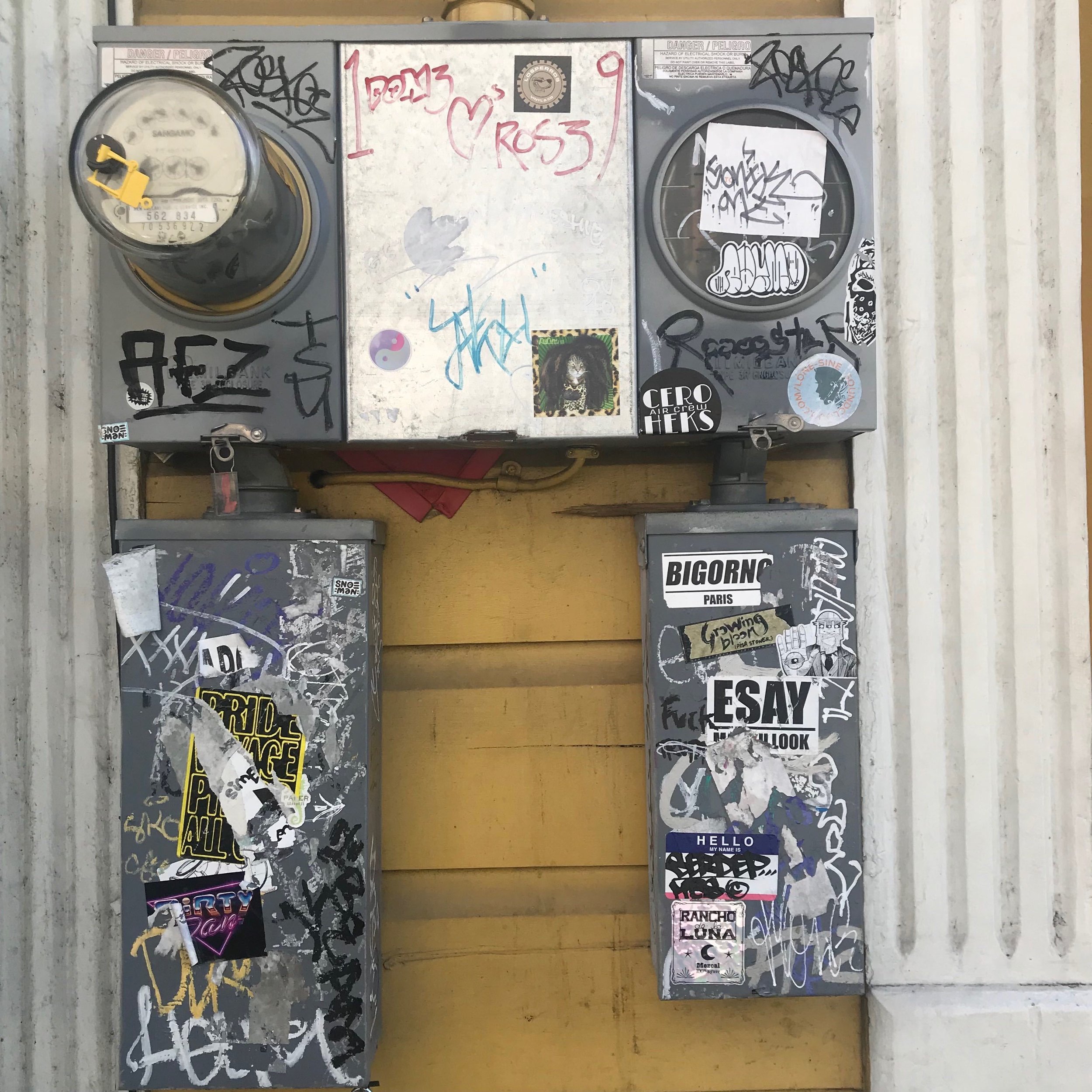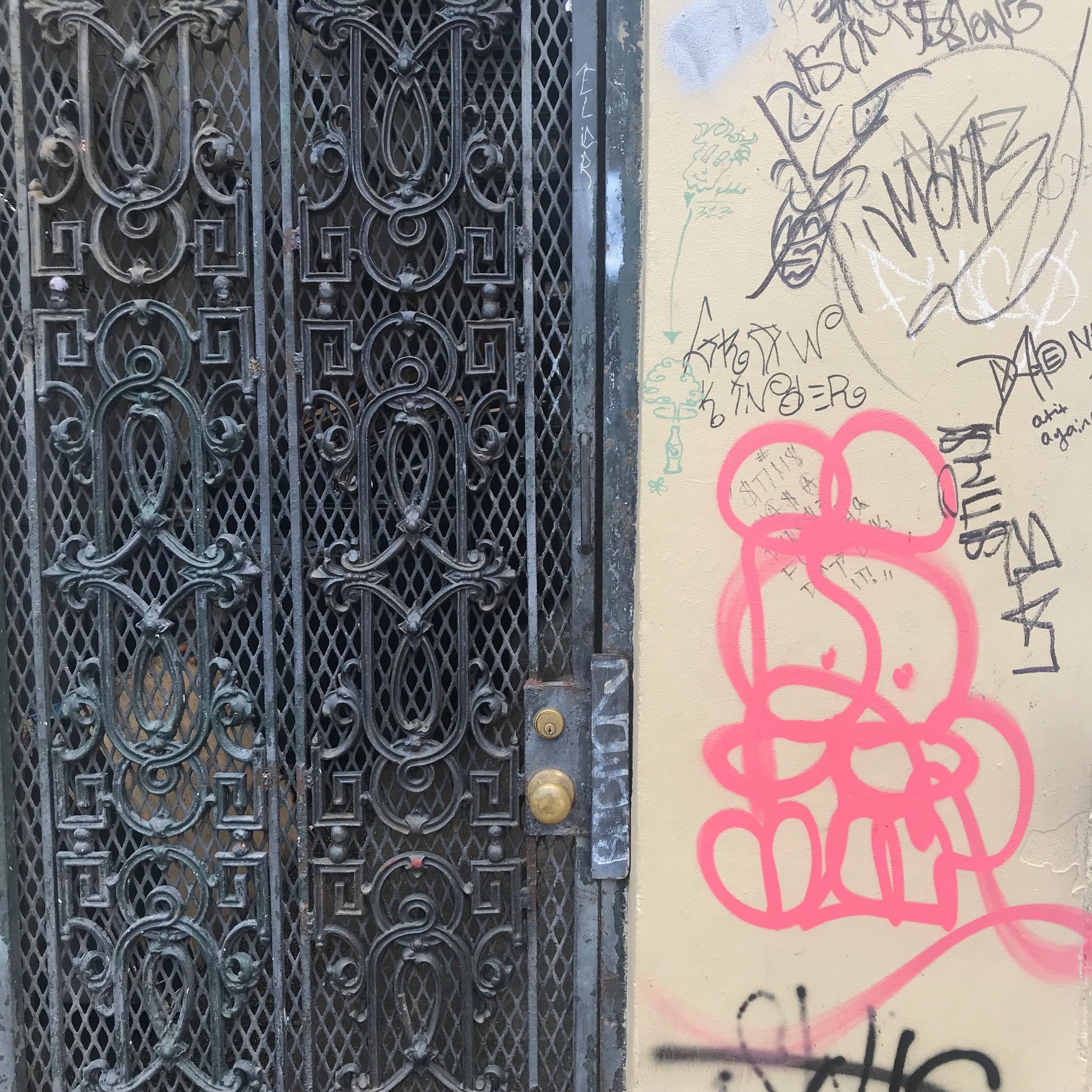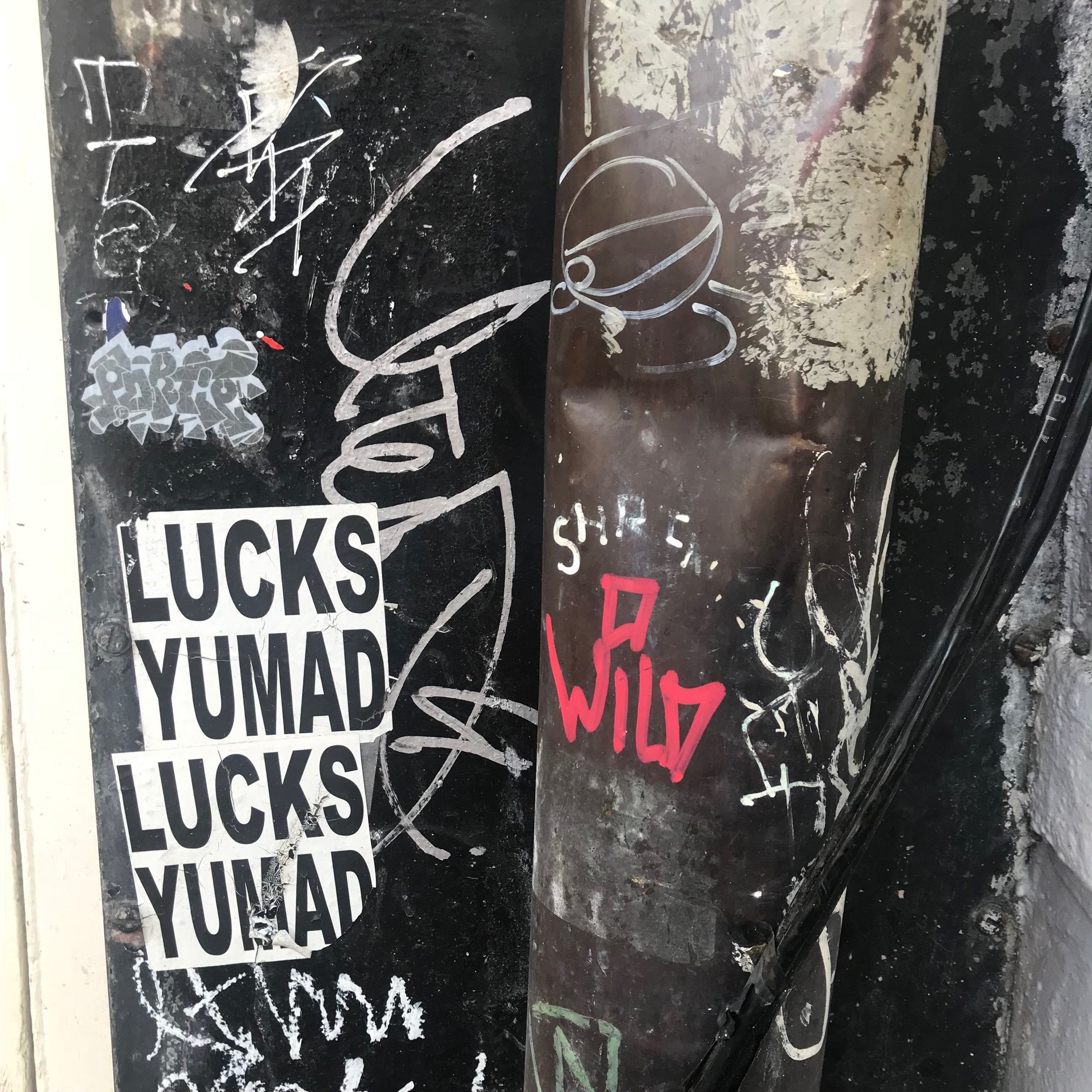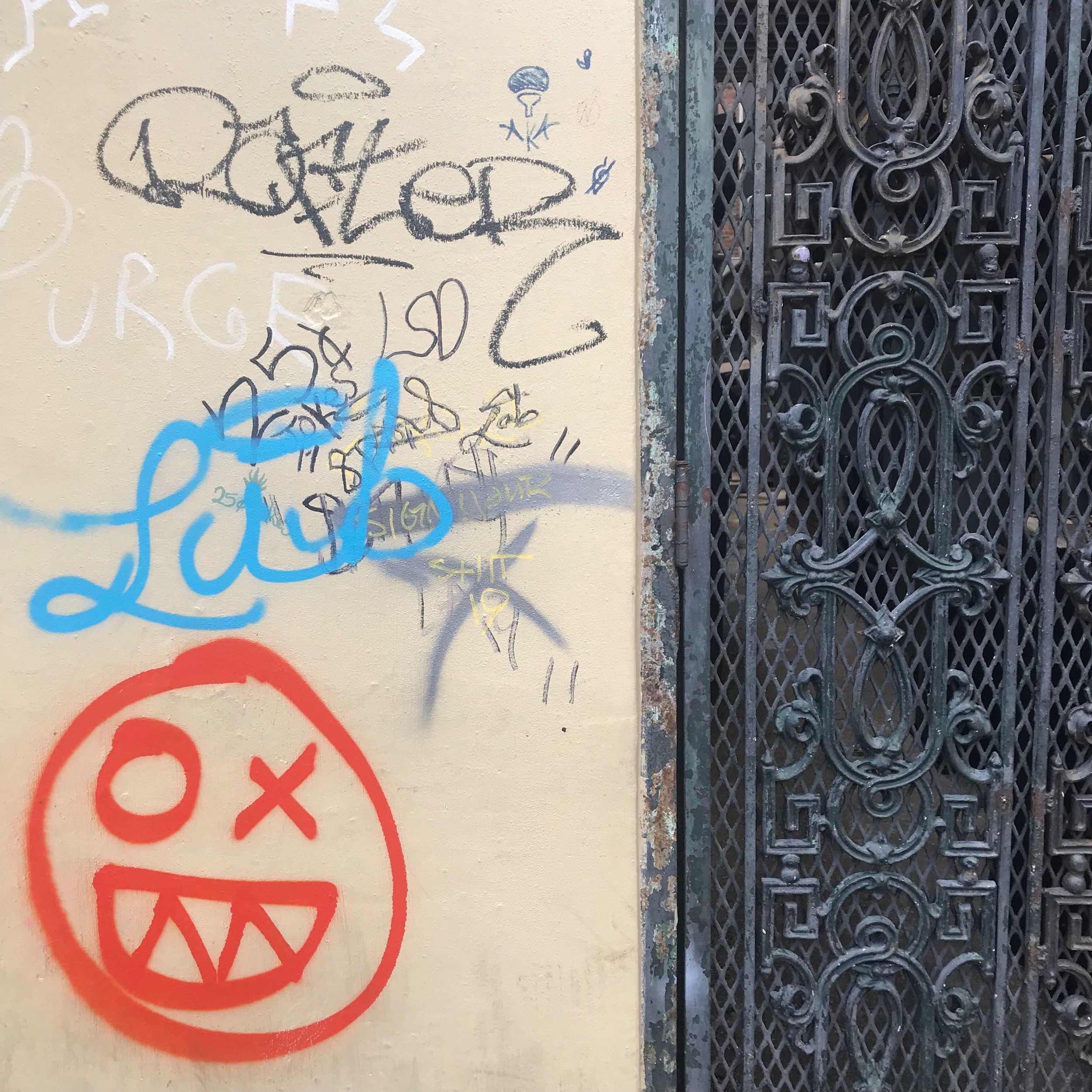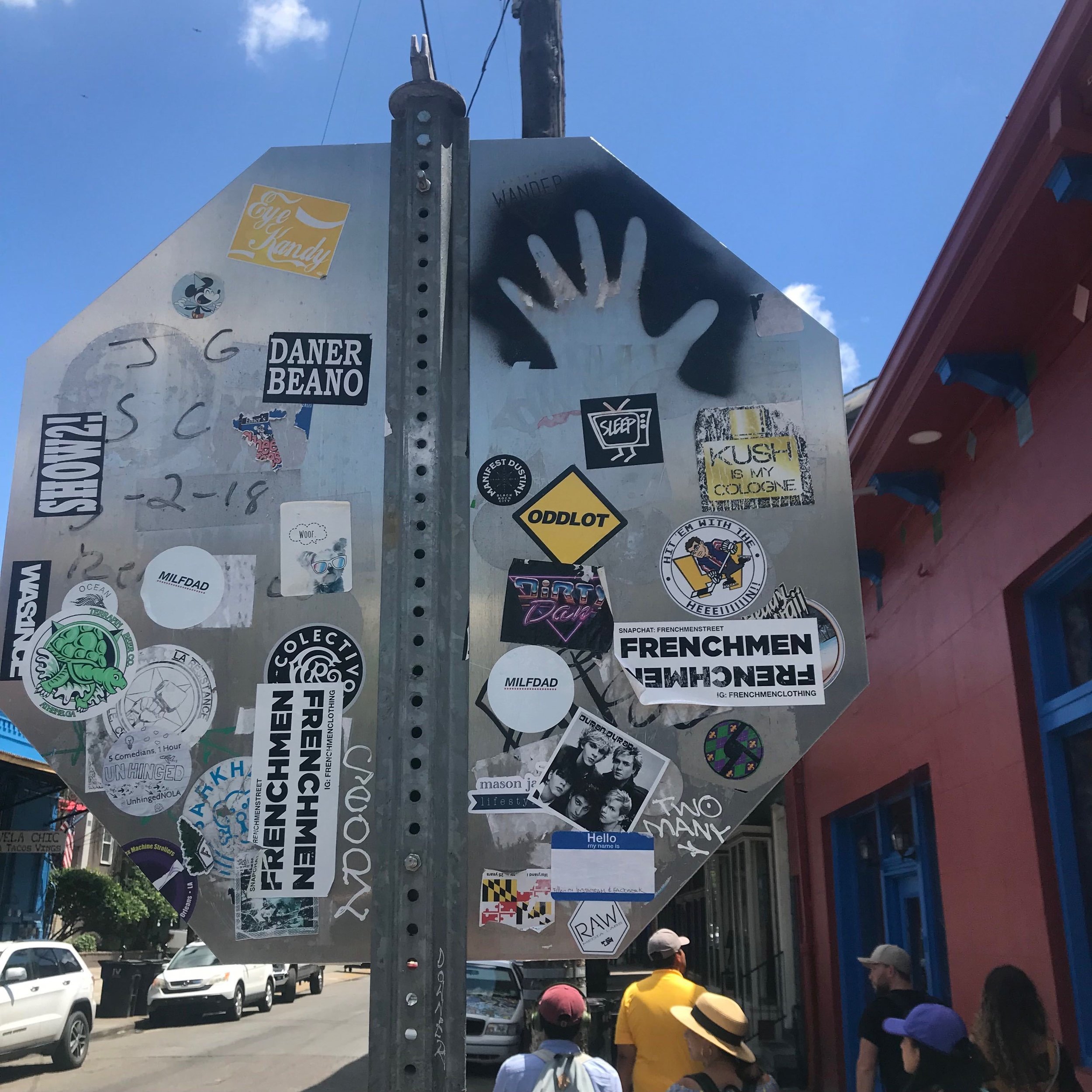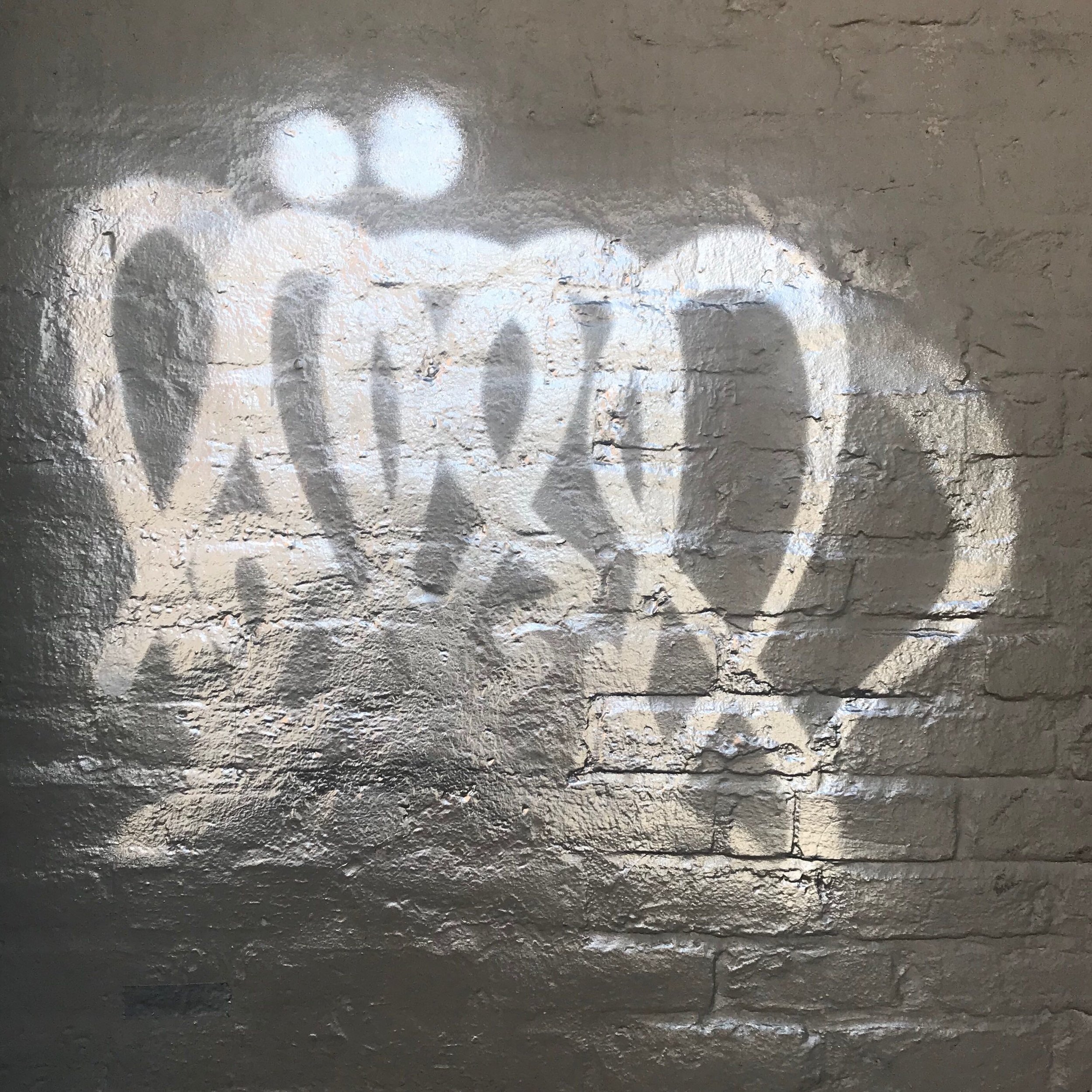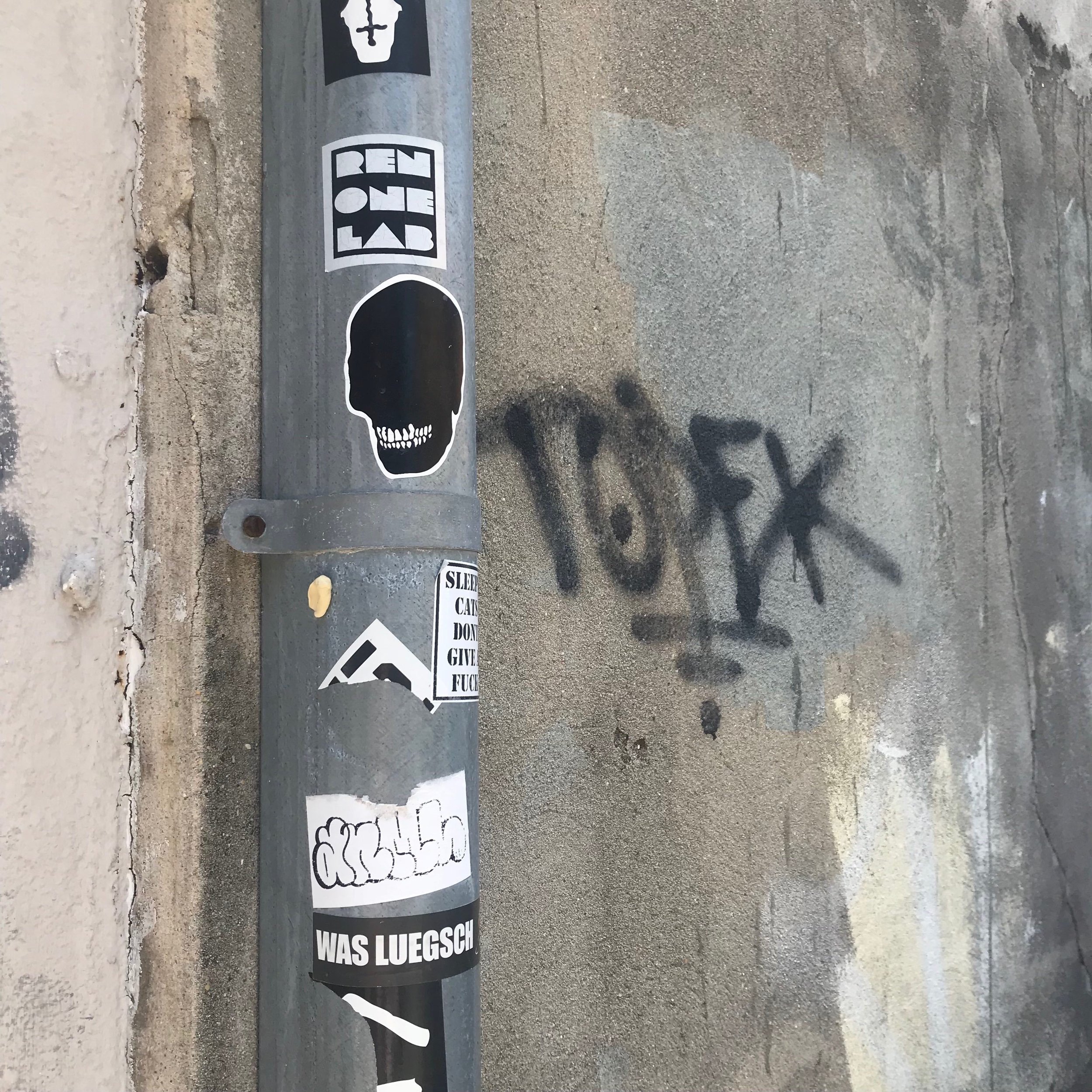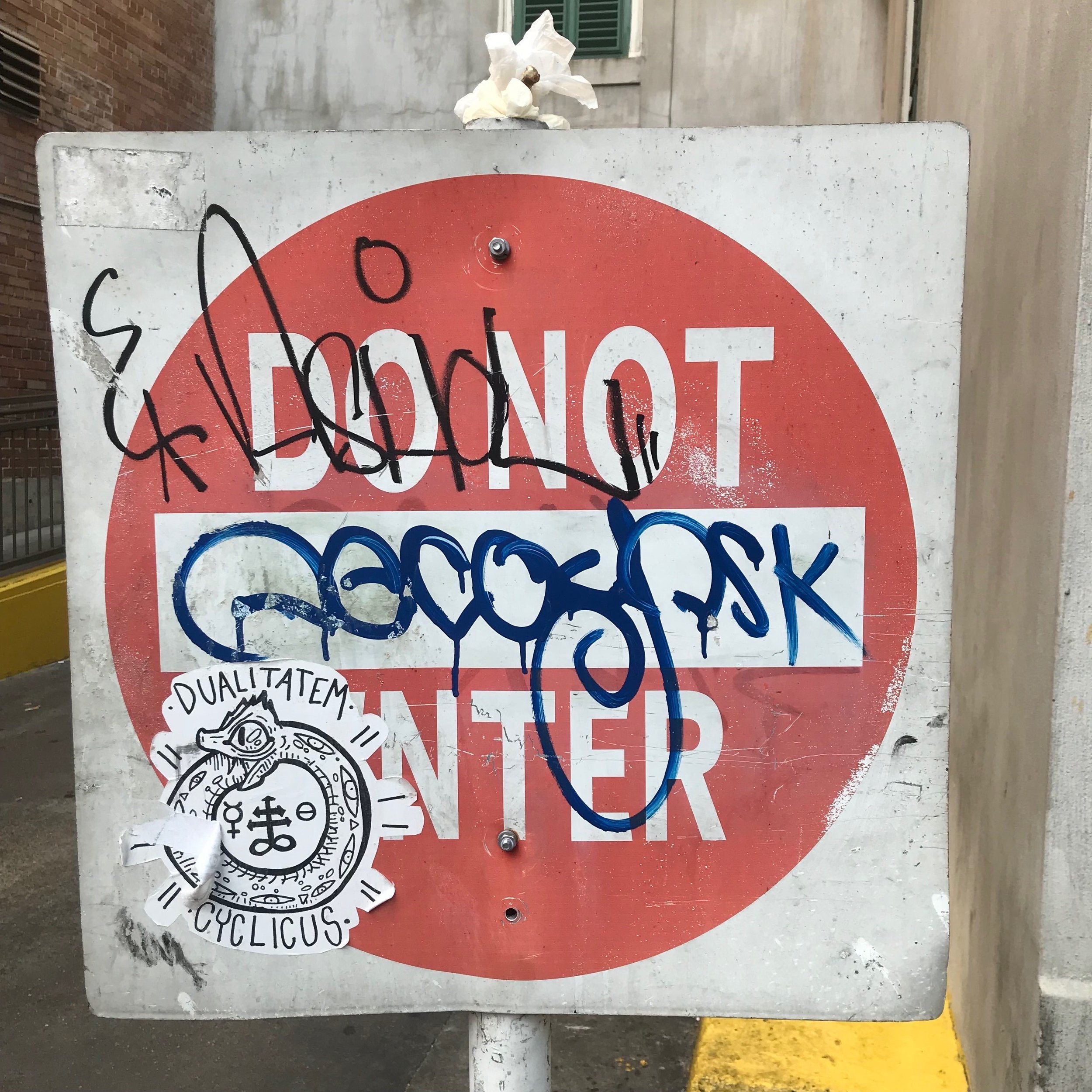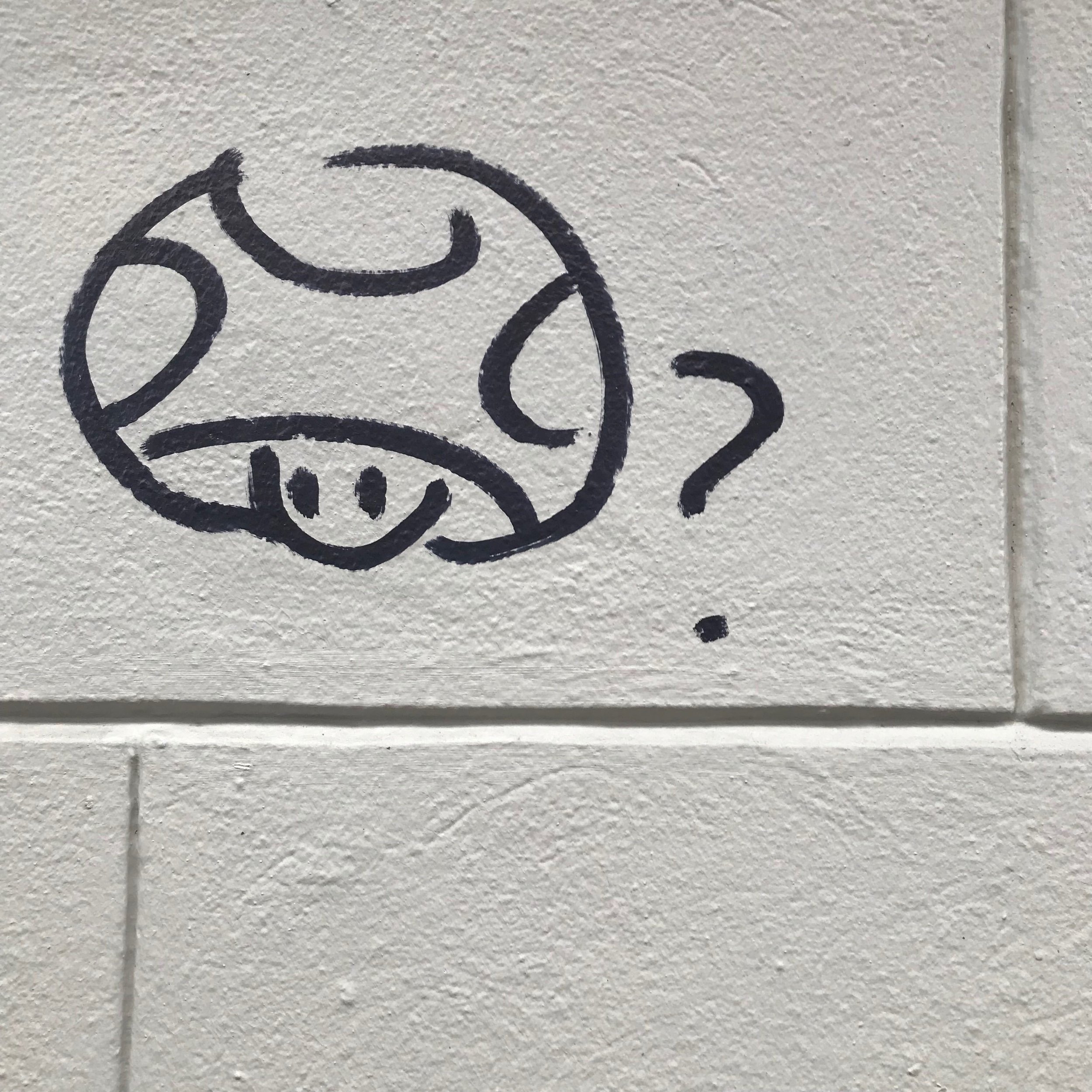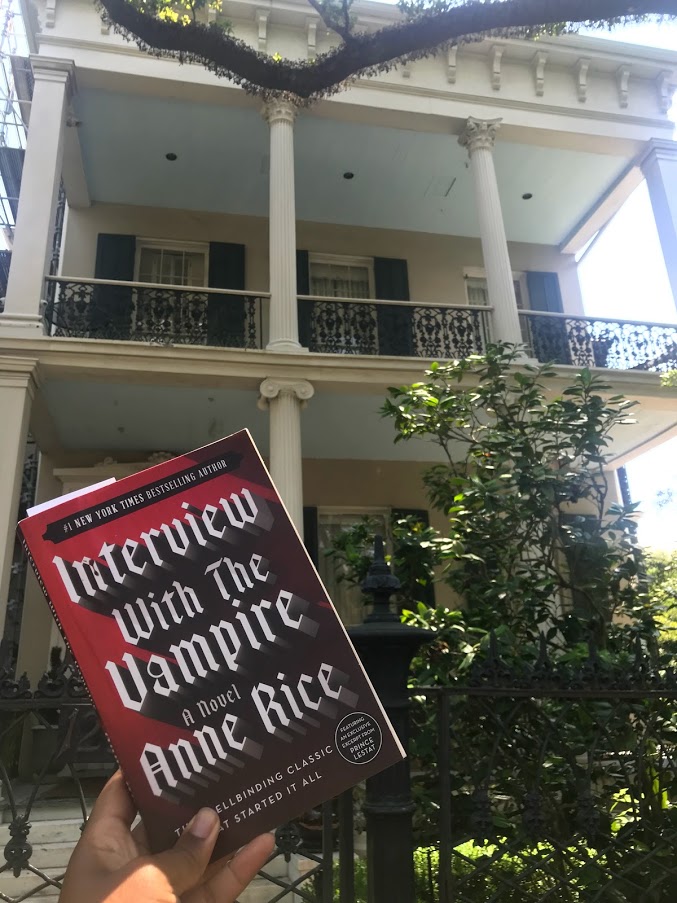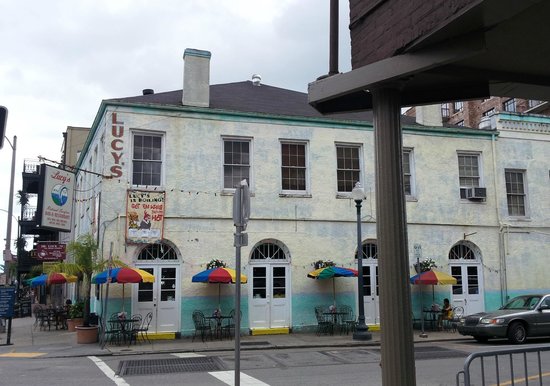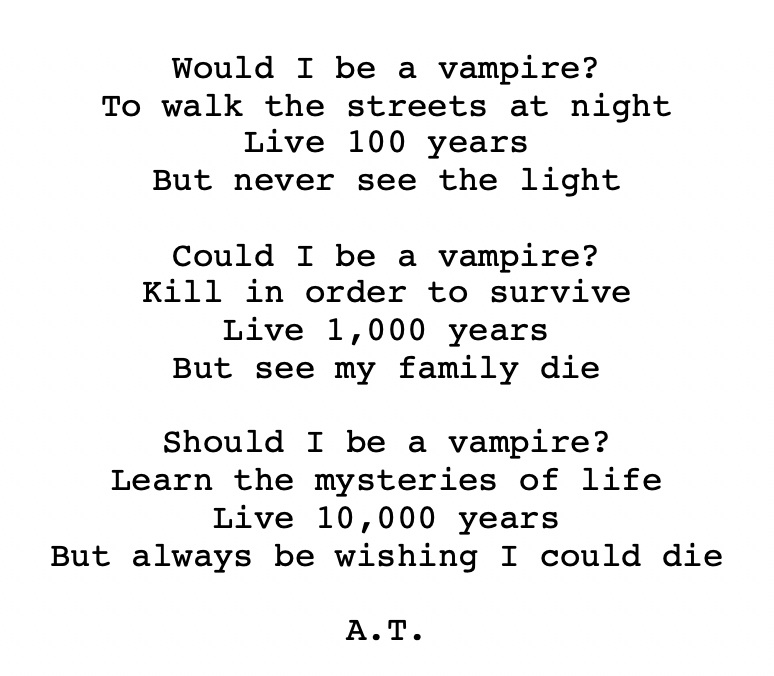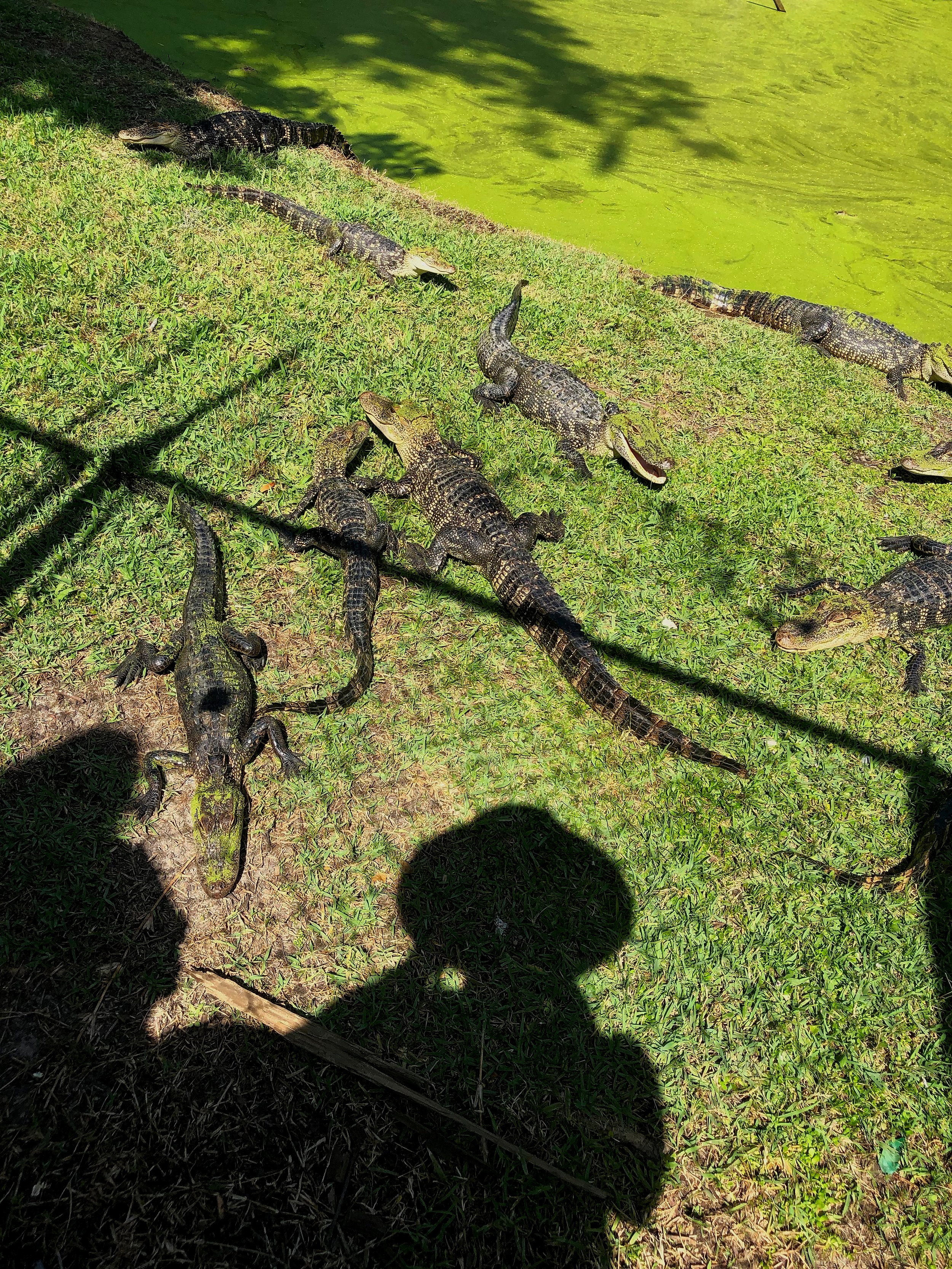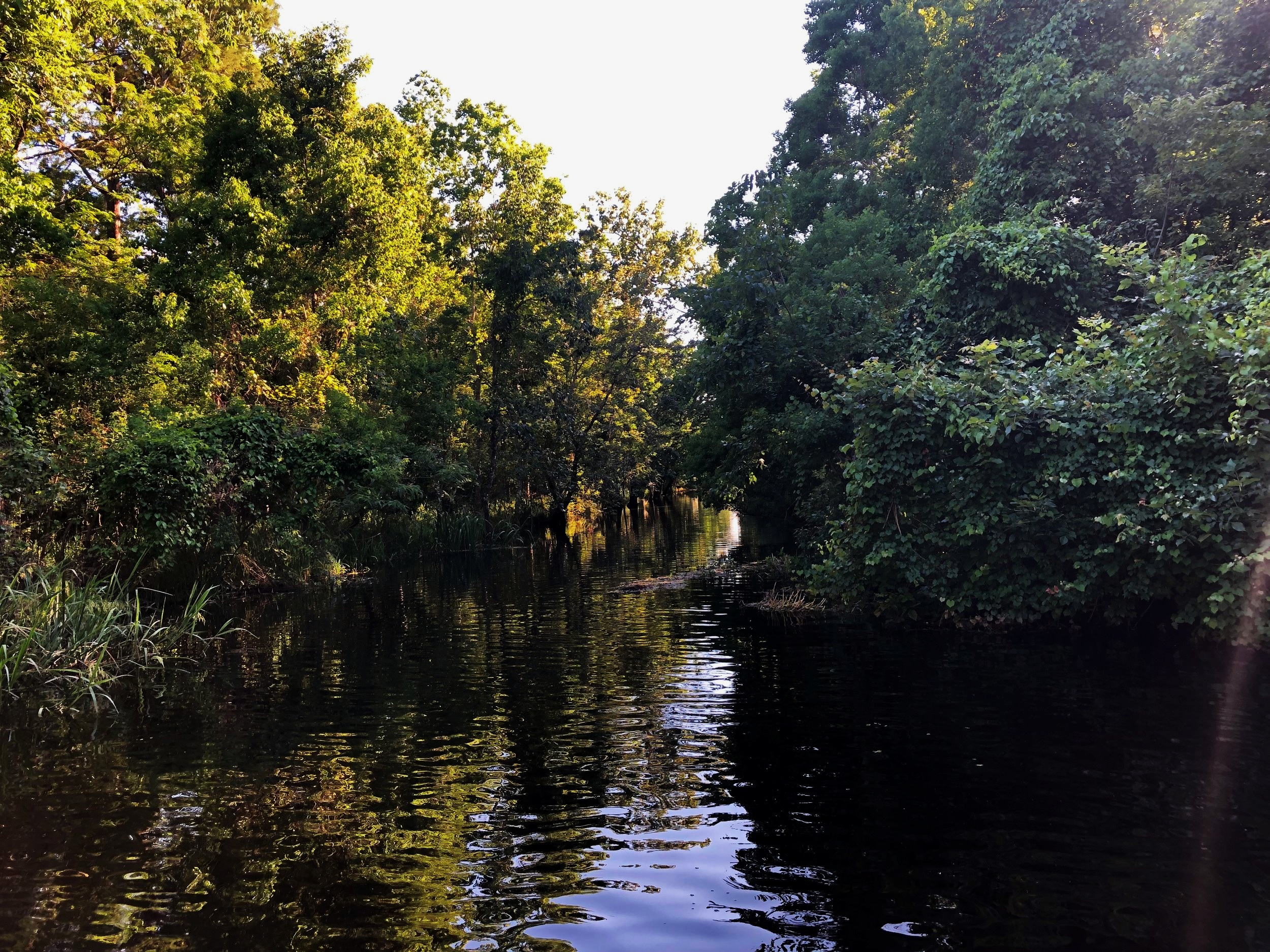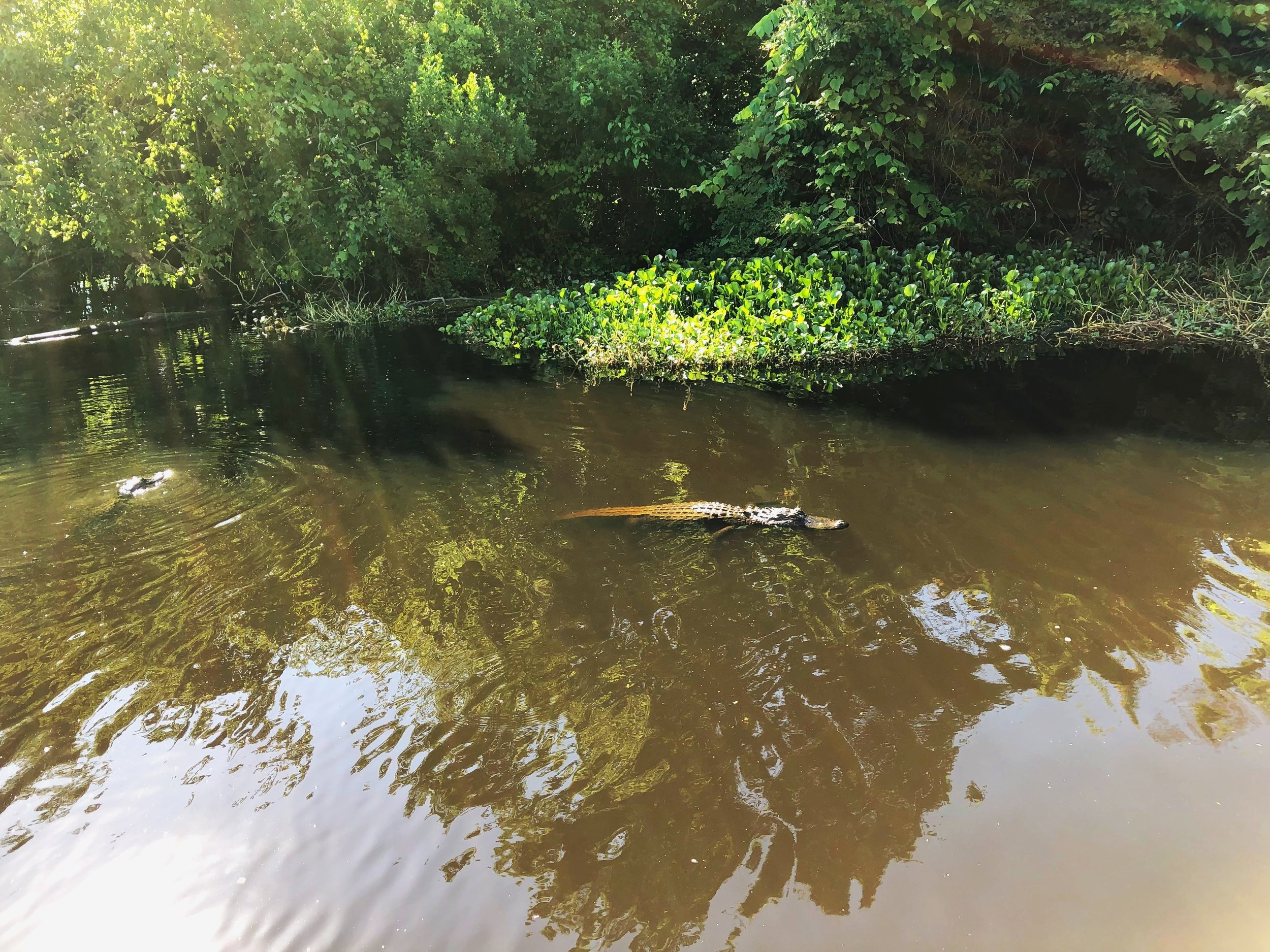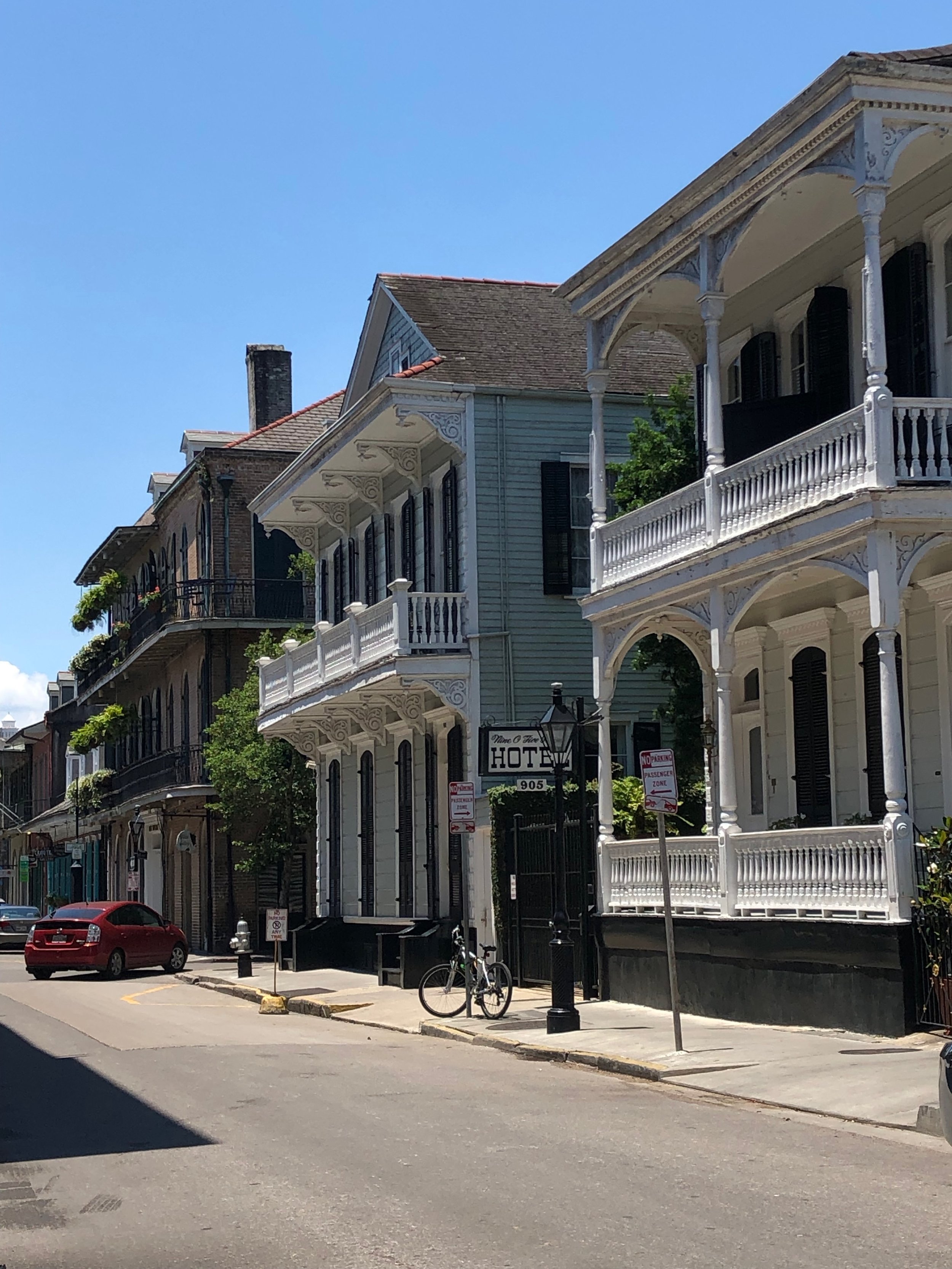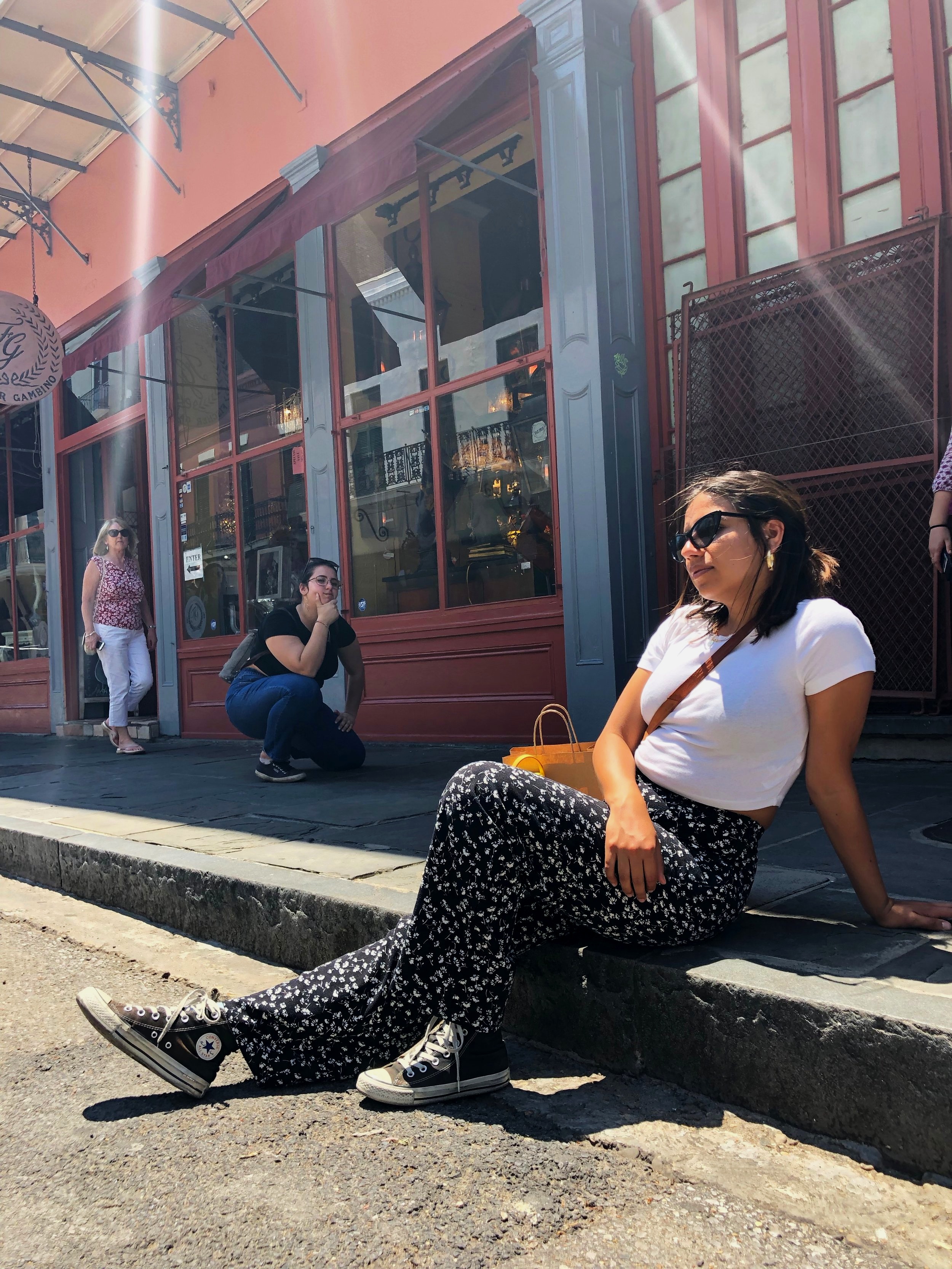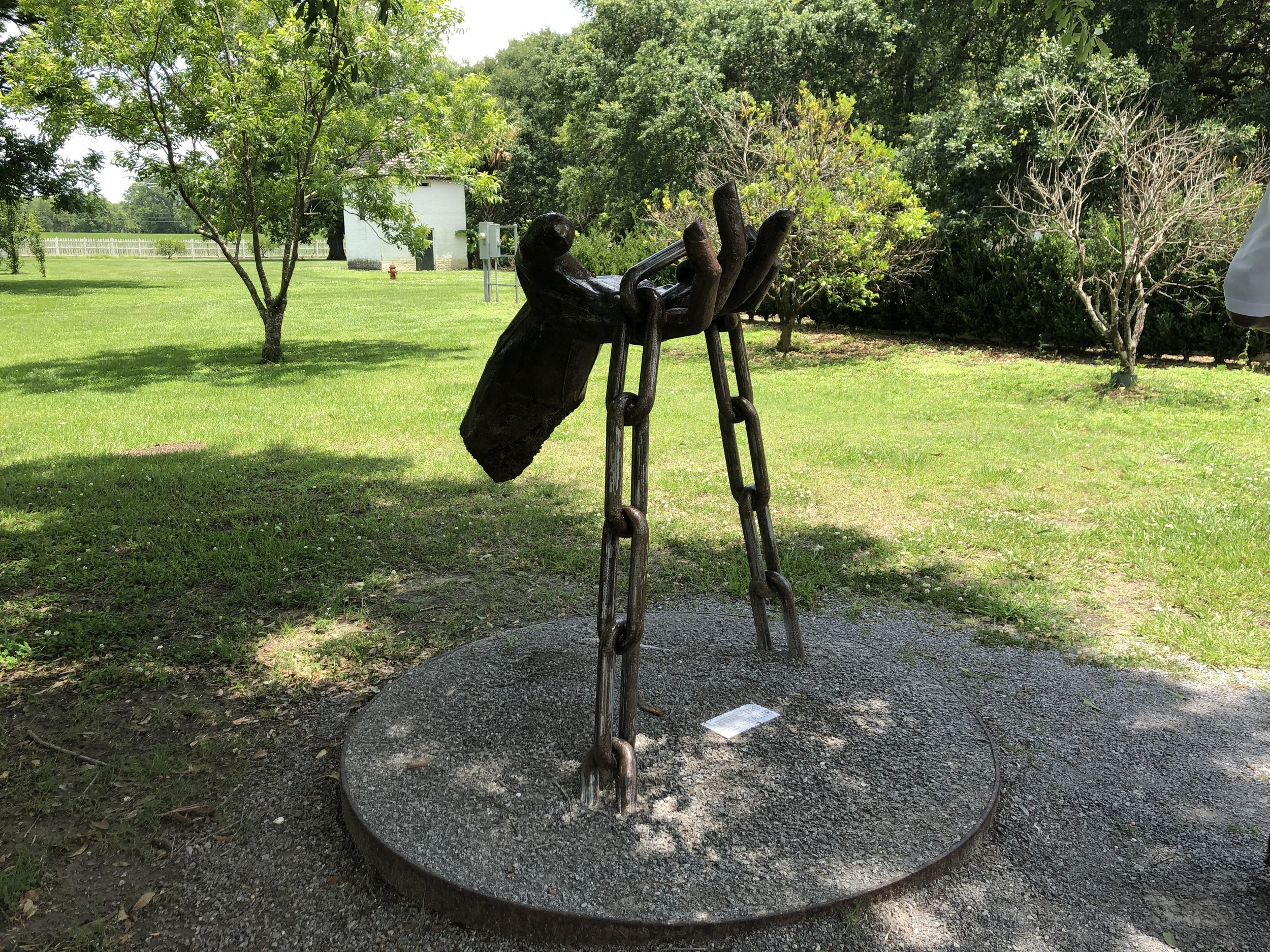A Lesson Before Dying reminded me to love the life I live
All Hands on Duck
Taken at the Ernest J. Gaines Institute at the University of Louisiana at Lafayette
I remember looking at the syllabus a couple of days before leaving for this trip to grasp a basic understanding of the order of things we would be doing. I made sure to have the books or at least figure out how I could Amazon Prime them to the hotel in time for each deadline. I saw that we would start our journey in Grand Isle, move to New Orleans, then go to Baton Rouge and Cajun Louisiana for a couple days, until we end our trip back in New Orleans. All of this seemed pretty random to me at the time, but now that we’ve arrived at our last novel in the series of 6 that we were assigned, I understand just how carefully this trip was curated. All of the novels we’ve read have led up to the most heart-wrenching, emotional one: A Lesson Before Dying by Ernest J. Gaines.
We arrived at Baton Rouge on Memorial Day and the city was practically empty. Almost every restaurant was closed and there were barely any people or cars on the streets. It was such a stark contrast from the lively and always bustling streets of New Orleans, but a good place to get a lot of reading done and a necessary change for the novel. A Lesson Before Dying takes place in the late 1940s in a small town north of the capitol along False River. The novel tells the story of a black man named Jefferson who is accused of and convicted for a crime he didn’t commit and is given the death penalty. Grant Wiggins, the local school teacher, is given the job by his aunt and Jefferson’s godmother Miss Emma to make sure he dies a man, with pride and dignity. Out of all our experiences with bookpacking so far-this has probably had the most real life connections to the story.
Side by side picture: an archive of the draft on the left, the published copy on the right
In the towns of New Roads and Oscar, we had the opportunity to visit the courthouse and jail that inspired the ones written in the novel, actually meet Dr. Ernest J. Gaines and ask him questions about the novel, his life, and his writing process, and also look at archives of his writing and previous drafts of the book. I think something that has become esspecially apparent on this trip was how much we as readers offer interpertations of a book that were not held or intended by the author. This isn’t necessarily bad as it can make a book relatable across generations, but it is also important to stay true to the original purpose of a novel. For example, I had asked Dr. Gaines if the character of Vivian in the novel was based off his wife Dianne and their relationship. He simply responded, “No, but she did maybe look like her”. This made the book almost even more real in a sense because it showed how the book wasn’t based off Gaines’ personal life since he wasn’t using it to share his personal story. In addition, going to the Gaines Center and having the opportunity to physically flip through the drafts of his hand written notes and edits showed just how meaningful each word and phrasing was to creating the final picture. Some changes were so miniscule side by side but emphasized a completely different aspect of the characters or the plot. It encouraged us to see how meticulous the process of writing that Gaines described to us when we talked with him and that we experienced while reading the book truly was.
The most impactful part for me personally was when we visited the jail, where Jefferson stayed and where Grant and other families went to visit Jefferson every week. This is where a large part of the novel takes place and essentially how the reader learns about Jefferson’s state of mind. Just an hour before our visit, I read the part of the novel that included Jefferson’s personal diary in which he jotted down his thoughts on the last days leading up to his execution. Here are a couple of things that were written:
“this was the firs time i cry when they lok that door behind me the very firs time an i jus set on my bunk cryin but not let them see or yer me cause i didn want them think rong but i was cryin cause of bok an the marble he giv me and cause o the peple com to see me cause they hadn never done nothing lik that for me befor”
“i dont want sleep at nite no mo jus catnap in the day while they got lite and they got noise cause i dont want drem bout that door ever time i shet my eyes”
“sun goin down an i kno this the las one im gon ever see but im gon see one mo sunrsise cause i aint gon sleep tonite”
Reading Jefferson’s diary and imagining what it would be like to be in such an impossible situation was incredibly difficult. Then going beyond the written words: walking through the actual jail cells, seeing where people would be hung, how small of a space it all was and feeling the closeness of the walls and the strong grip of the horrible heat slowly suffocate you was unbearable even for 20 minutes…I can never fully imagine how someone would endure it for hours, days, years. It was in this moment that I understood why this book was last, and why we had to leave light and breezy New Orleans in order to shift and force our mindset to appreciate the heaviness of the novel. This was the peak of our course in empathy. While we will never be able to fully place ourselves in Jefferson’s shoes (he only had two- one for work, and one for church) but, the lesson he learns is a universal one. The lesson the characters in the novel and the reader realizes is that no matter how hopeless a situation is and how hard the struggle is to find faith, there are people who love you and when you can receive and accept that love, hope can be found.
Another reason this book came at the perfect time in the trip is because we had the ability to truly get to know and care about each other. I was reading Jefferson’s diary on a dock where a mother duck was providing shade for her ducklings, they all cuddled close together underneath her until they were ready to go for a swim in the lake. And it made me realize I had my own friends here to love and support me too. They were there to wipe my tears, understand the sadness, and give me a much needed cuddle.
“‘The only thing I believe in is loving you.’”
Beautiful Chaos
People treat noise like it’s a negative word, like it’s the antithesis of music, but I don’t think noise always has to be a bad thing. New Orleans is noisy and that’s okay. It’s full of beautiful and loud noises, musicians busking in the French Quarter, cars honking at pedestrians, trollies passing in the streets. Some of the sounds are comforting and others are far from it but that is part of the city’s charm. There is another unique aspect to noise, it isn’t always an external phenomenon, just like sounds can be noisy, so can thoughts, and that is what I kept in mind while reading Michael Ondaatje’s “Coming Through Slaughter.”
In one word, it was a whirlwind full of chaos, creativity, and pain. It follows the tumultuous life of barber and jazz musician Buddy Bolden, a man whose genius was just as captivating as his personal demons.
“He was the best and loudest and most loved jazzman of his time, but never professional in the brain. ― Michael Ondaatje, Coming Through Slaughter
”
It was not an easy to read. It felt confusing and at times all over the place but that’s what jazz music is. After listening to the jazz band at Preservation Hall, I felt that I could understand the novel that much more. Jazz is essentially a beautiful chaos, sounds that shouldn’t go together but somehow does. This is the style or lack of the novel followed. It mimicked the syncopatic and improvisational essence of jazz.
“But there was a discipline, it was just that we didn’t understand. We thought he was formless, but I think now he was tormented by order, what was outside it. He tore apart the plot—see his music was immediately on top of his own life. Echoing. As if, when he was playing he was lost and hunting for the right accidental notes. ― Michael Ondaatje, Coming Through Slaughter
”
Seeing Daniel Pritzker’s film “Bolden” further emphasized the chaos that was Bolden’s life. Although, it was incredibly confusing and somewhat graphic, I loved the artistry in the transitions from Bolden’s madness to the flashbacks to his life. The film was essentially plotless but then I thought to myself, does life have a plot? The circle of life, particularly for humans, ebbs and flows by way of extrinsic and intrinsic motivations. While Bolden’s life is largely unknown, it is clear that Bolden was a pioneer in the creation of jazz music.
Seeing how ingrained jazz music has become to Louisianans is remarkable. What largely started as experimental improvisation has taken on a life of its own. I don’t think I would have recognized its importance had I not been on this bookpacking experience. The Sunday parade we attended seemed so immersive and full of life. Everyone was dancing and smiling no matter the heat. People joined and fall away as the parade moved on but the joy in the air was palpable. Music is an emotional experience and combined with jazz’s history and the strong community ties, I can absolutely understand the crowd’s response. You can’t help but move your feet or snap your fingers, it energizes you in a way that one can only understand if you can experience it in its true form.
Music is such an important aspect to New Orleans, hearing musicians busking in the streets sharing their art through sound that somehow can convey all the emotions of the human experience. It is just as much a part of New Orleans as it is to the novel. “Coming Through Slaughter” feels torn between two worlds, just like Bolden, and just like New Orleans. In Bolden’s case, the madness prevailed but New Orleans feels different. It is not simply one mind but an amalgamation of many. I don’t know which world will prevail, the historical or the modern, or if they will continue to exist together in harmony but I hope that jazz always means as much to New Orleans as I saw it that on that Sunday parade.
Enjoying the Everydayness
“I don’t find life gloomy...to me, books and people and things are endlessly fascinating.”
Reading Walker Percy’s The Moviegoer while being in its setting proved to be a similar experience to reading Kate Chopin’s The Awakening while being in Grande Isle. Like the first location and book of this Maymester, I was reading the story in a place that I could find nothing but appreciation for. Grand Isle had been beautiful, relaxing, and welcoming. New Orleans was colorful, lively, and exciting. I thoroughly loved both places. And yet, on both occasions, I was surprised to find myself reading a story about a person who had been terribly depressed in those places.
The protagonist of The Moviegoer, “Binx,” establishes fairly early on in the novel that he intends on dedicating his life to a “search,” the essential goal of which would be to find the meaning of life. Binx lives in constant fear of succumbing to “everydayness.” He is unhappy in the repetitive simplicity of his life in Gentilly, with his constant visits to his aunt and cousin in their Garden District mansion. Binx sets about trying to find something better—his life’s purpose.
photo stolen from Cheyenne
While this exposition excited in me the most hopeful expectations of having the meaning of life revealed to me in a single novel, I found that as the book went on, Binx was getting no closer to succeeding in his search. Instead, the burden he struggled with only seemed to get heavier and heavier, as his cousin Kate’s depression was added on to his own. There was no drastic change in Binx’s life at the end of the novel; no solution to life’s mystery. The change was only a small one. Binx becomes codependent with his cousin Kate, who also suffers from a depressive feeling of a lack of purpose in life. The two realize that there isn’t really any hope in the searches that they wage on life. They can scour for answers and meaning for all of their lives, and still come up empty-handed, or they can accept that all that they really have in life is one another. They settle for the latter, and they live their simple lives together, the knowledge that each loves the other being their only crutch to keep moving forward.
This ending saddened me a bit, especially since I had formed such high expectations for the ending when I had first started the book. I felt deeply for Binx and his cousin Kate, whose struggles I had come to form an understanding for after having read the story of Edna in The Awakening during our stay at Grand Isle. But rather than settling at the conclusion that people hurt on the inside regardless of their seemingly enjoyable environments, I took the outcome of The Moviegoer and used it as a lens to look through at my own life. The result was an immense gratefulness.
There is much to say that I am grateful for in my life—in fact, there is far too much. So I will narrow it down, simply to this Maymester alone. Binx lived in discontentment, and fear of the everydayness. But despite his devotion to his search, he is left only with the small consolation that he loves his cousin Kate and that she loves him too. Even in just the short few weeks that I have been on this trip, I realize that my life contains so much more than that.
I don’t have just one Kate. After knowing my fellow Bookpackers for only three weeks, I know that I have at least twelve Kates of my own. Everyone here cares for me, and I for them, and already I know that I have twelve times the reason to carry on than Binx did. And within these short few weeks, I have ran out onto the beach at five am, to watch the sunset with these people. I have sat in cafés with them, and had playfully heated discussions about which Disney movie is better: The Lion King or Tarzan. I’ve sat in hotel rooms with them in the middle of the night laughing until there were tears in my eyes. I’ve experienced the nightlife of the French Quarter with them for the first time in my life—an outing I will never forget. I’ve gotten to know their favorite riddles, their tastes in television shows, and their dancing styles. I’ve made twelve good friends.
Photo break from dancing during the second-line parade
And while my heart hurts no less for Binx, and the people who live in the nicest of places but are troubled by persistent and unbearable inner turmoil, I can also be more appreciative of the inner joy that I find within myself. While at the end of The Moviegoer, Kate is barely able to handle a ride alone on the streetcar, because Binx encourages her that she can do it, I can ride any streetcar to any place, fully knowing that I have my Bookpacking friends, who will all be expecting my return, so that we can go out together and have another adventure. If this has become my everydayness, then I have nothing to fear at all.
A Lesson Before Seeing
This novel had the greatest impact on me. Not only were the characters very real, but I felt the issue of recognizing someone for who they are is an issue today. Everyone should read this book and take the opportunity to meet Dr. Gaines while he is still alive.
“I was not there, yet I was there. No, I did not go the trial, I did not hear the verdict, because I knew all the time what it would be. Still I was there. I was there as much as anyone else was there.”
These very first lines of the novel, A Lesson before Dying, by Earnest J. Gaines set up an issue that stood out to me throughout the novel. Describing his experience at the trial of Jefferson, a man sentenced to death for being in the wrong place at the wrong time, Grant Wiggins felt removed from the environment. He is looking, but not seeing. He is listening, but not hearing what is being said.
In the trial, Jefferson’s defense attorney places him as less than a man, an African American thing, a hog. The rest of the novel is Grant convincing the imprisoned Jefferson he is a man, a human being, before his death. This word defined Jefferson for the jury who sentenced him. The issue of looking yet not seeing is what I took away from this novel.
“Gentlemen of the jury, look at him—look at him—look at this. Do you see a man sitting here?...Do you see anyone here who could plan a murder, a robbery, can plan—can plan—can plan anything? A cornered animal to strike quickly out of fear, a trait inherited from his ancestors in the deepest jungle of blackout Africa.”
Grant’s aunt does not look at him because he does not practice Christianity as she would like. Grant is effectively condemned in her eyes for one decision of his.
Gropé, who is murdered in a shootout, did not like Brother and Bear from the start, just by looking at them. They had intended to rob him. He truly sees who they were and meant to do and died because of it. Only Jefferson is left standing and is sentenced to death for murdering Gropé.
Jefferson’s own godmother during court is “not even listening. She had gotten tired of listening” (4). She later tries to get involved and impose her will on saving Jefferson so she can feel good, but she was not even present in the courtroom.
In the streets of New Orleans, we walk by homeless people, beggars, and scammers hoping to scrape out a meager existence. Veterans and youths tap dancing away.
Looking has to do with seeing, with recognizing one another.
“I had told her I was no teacher, I hated teaching, and I was just running in place here. But she had not heard me before, and I knew that no matter how loud I screamed, she would not hear me now.”
Grant, who disliked teaching, felt this angst to get out of the city and go somewhere else. Yet, in teaching Jefferson to believe in himself as a human being who is worthy, Grant also learned his own worth. In trying to see and understand others, we can also grow.
The issue of looking but not seeing is present historically but also has repercussions today.
We often in seeing confine what we see to a term-homeless, slave, a statistic. We judge books and people by the cover. As the book wrestles with Jefferson being seen no more than a hog, we struggle to go against being seen as mere stereotypes. We are human beings.
Taking Dr. Gaines work further, I took the work to mean we need to go beyond our senses. This can be related to knowing but not understanding or even doing. We know not to litter, we know to recycle, yet we are fine with destroying our planet. We know racism is a problem, yet we don’t understand it fully and deal with it. What separates us from animals, from being a hog, is our mind. We can look, but it is our brain that processes that information and uses it, it translates it into seeing. If our head is not in the right place, as many characters were in the novel, we do not see and comprehend what is presented to us.
This book and the experience along with it will be my most memorable part of this bookpacking journey. No literature classroom including this novel could help me truly understand how little we see how little we understand. Being in a foreign place like New Orleans and Baton Rouge shocked my mind into seeing the city and the people around me. No statistic or academic language can make me feel what I saw and heard. That is the beauty of bookpacking, being on the ground and empathizing with those we meet.Book packing allows you to not only be on the ground to experience the place and see sites of interest, but you can see manuscripts and visit authors unlike any other way of access.
Yesterday, we got to meet Dr. Gaines, his wife Dianne, and the director the Gaines Center and her assistant. Interestingly, he lives on the very plantation he grew up on. The church on his property is the church he learned in between grinding seasons. He first got his creative streak writing letters for the elder sharecroppers. He eventually moved out to California to get educated but got drawn back to Louisiana for a teaching position in Lafayette. He moved back as he found himself coming more and more to the graveyard his relatives are buried, where he now welcomes people each year to maintain the the graveyard with him before exchanging stories and food. He continues to write and I could really see his passion and how writing has become him. His role model growing up, with eight siblings, was his aunt who raised them. She was handicapped and crawled around the house taking care of them. Ernest was truly an inspiration and it was an honor to meet him.
Read On!
An original manuscript of Jefferson’s journal entry, my favorite part of the novel
The very church on the plantation where Ernest learned as a child
Haply I Think on Thee
Our first days away from our beloved New Orleans found us in Baton Rouge, sleepy thanks to Memorial Day, at a hotel next to the gorgeous Mississippi, where we were to read Ernest J. Gaines’s A Lesson Before Dying while exploring the State Capitol building and visiting the small town nearby where the novel was set. A Lesson Before Dying is about Grant, a young teacher grappling with the immense task of convincing Jefferson, a wrongfully convicted 21-year-old awaiting execution, of his own humanity—all under the hopeful eyes of a struggling community.
While reading this book, we had the privilege of immersing ourselves in the text by exploring the very places where the novel is set. We visited Point Coupée parish to see the prison cells where Jefferson would have had to live his final weeks—miserable little boxes, sealed by cruel metal bars and walls of bleak, flaking paint. Shockingly, this horrible place had only been retired as a prison in the 1980’s. The atmosphere of the prison was smothering, suffocating us due to its lack of air conditioning, and intimidating us with walls decorated with mold and wasp nests. Stepping into those cells, and having them close on us, trapping us inside, made Jefferson’s experience feel very real. I tried to stay light-hearted at the time, not allowing myself until much later in the day to reflect on the despair and helplessness that Jefferson must have felt in that cramped, hot cell. I found the arithmetic scribbled on the walls— “53 days left,” it said—quite disturbing, and I wanted to get out. It’s easy to forget that inhumane places like these still exist, that we still lock people up, reducing their freedom on this vast planet to about 4 by 8 feet of cement. And then I thought of Jefferson, sentenced for a crime he did not commit, and sent to this awful place with the belief embedded in him that he was not a human but a hog. This put Grant’s fear and hesitation into perspective—how do you transform someone who believes that they are as lowly as a hog, reducing themselves to eating on their knees with their hands behind their back, into someone who believes firmly in their own humanity? How do you convince someone to walk with their head held high to the electric chair? We all left that little prison—whether we revealed it or not in our outward disposition—uneasy and remorseful over the experience. I think we were all thinking of poor Jefferson and the inner tumult he must have been facing in that grim place. Visiting the prison made Jefferson’s ultimate transformation into a man even more astounding and impactful—I understood then what made him a hero.
The next day, we were lucky enough to meet Dr. Ernest J. Gaines in his home on the False River. We asked him questions about A Lesson Before Dying, his path to becoming a writer, and—my favorite part—his relationship with his wife, Diane, who was constantly keeping him on track when his answers started to drift. It was a truly special experience, which helped me understand the characters and message in the novel more. Interestingly, Dr. Gaines shared that he never put himself fully into any one character. He also gave us insight into his decision to allow Reverend Ambrose, a somewhat difficult character to support when reading, to rise up at the end of the novel when he, not Grant, was at the execution. His decision showed that, though an educated man himself, Dr. Gaines seemed to value belief—in people, in community, in God, even—over cynicism. We would soon discover that even more as the woman in charge of his archives, Shalon, showed us all that Dr. Gaines had done for his community. She took us to the restored church where the fictional Grant taught the plantation children, where she explained the significance of sharecropping and the poor circumstances of its unfortunate participants.
Throughout this experience, it became clear that Dr. Gaines both like Grant and Reverend Ambrose in his contribution to his community and simultaneous faith in its future. As we explored the town, we noticed the disturbing remains of an unsavory history—a celebratory statue of a confederate soldier, proudly waving his flags, and a memorial to a Native American, described on his plaque as a “savage.” Perhaps even more disturbing was the consistent erasure of black history, the history of those whose blood, sweat, and tears built that very town. Dr. Gaines and his colleagues are on the front lines, doing everything they can to prevent their history from disappearing. Shalon took us to the plantation graveyard—a tiny plot of land surrounded by thick grass, which was the only place plantation workers were allowed to bury their dead—to show us first hand how easy it was for black history to be erased and how important it was to maintain it. The graveyard had almost been demolished by tractors, if Dr. Gaines himself had not helped save and preserve it. Shalon raised a thought-provoking question to the group: “what makes a graveyard? How do you know you’re at a graveyard?” We hesitated to reply because we knew the answer wasn’t pretty, so she repeated the question. I eventually responded, “headstones… graves” and she confirmed; plantation workers didn’t have the money to afford marble headstones, relying instead on impermanent organic materials like wooden crosses to mark the graves of their loved ones, which resulted in the decimation of their burial sites. People who didn’t know the area would carelessly build over these graveyards without a second thought. Most heartbreaking is that Dr. Gaines’s beloved aunt, who had never walked her entire life but had to drag herself on the ground all the while raising a flock of children, is buried somewhere in that patch of land in an unmarked grave—dear to so many and so strong, yet lost somewhere in the dirt. I thought about how I had taken for granted the simple privilege of knowing where my loved ones were buried, to have a place to visit them, to honor them. The idea that so many had that opportunity stolen from them made me angry and remorseful. We left the graveyard carefully, avoiding large spiders and itchy plants, ruminating on what Shalon had told us. She had also explained how sharecroppers were essentially trapped in their “jobs,” as they weren’t paid in US dollars but instead in currency specific to that plantation, which they could only use at the local plantation store. It’s with these stories that I began to relate with Grant and his former teacher Mr. Antoine in their utter cynicism—they were surrounded by the constant reminder of slavery and the notion that it hadn’t ended, just simply taken another name. I’m sure that Dr. Gaines felt similarly in his youth and perhaps even now, so I only admired him more for never ceasing to write about hope. Where Mr. Antoine died pessimistic about the fate of his community, Ernest Gaines lives like the reformed Grant, perhaps not entirely relieved of cynicism, but never ceasing. Like Grant would continue to teach the story of Jefferson, Dr. Gaines continues to tell the stories of the brave people of his community and teach the history he refuses to let be erased.
Our final discussion on A Lesson Before Dying was an emotional one. Though about a specific community facing a gut-wrenching tragedy, this novel carries a universal message. Ultimately, it is about allowing oneself to be loved and believing in ones humanity. It is about finding hope and happiness, not in your material possessions or tangible accomplishments, but in the people that love you. That is how Jefferson walked to that chair a man. Wrapping up our discussion, our professor, Andrew, left us with the Shakespearean sonnet he goes to when he feels he needs this very message. Coincidentally, I recited this sonnet years ago in theatre but realized when Andrew spoke it that I had never truly understood it. As I looked around at my new friends and a professor that truly believed in me, I finally got it. I am good and human and worthy because of them and because of my friends back home and because of my family. Without much further ado, I leave you with this:
“When, in disgrace with fortune and men’s eyes,
I all alone beweep my outcast state,
And trouble deaf heaven with my bootless cries,
And look upon myself and curse my fate,
Wishing me like to one more rich in hope,
Featured like him, like him with friends possessed,
Desiring this man’s art and that man’s scope,
With what I most enjoy contented least;
Yet in these thoughts myself almost despising,
Haply I think on thee, and then my state,
(Like to the lark at break of day arising
From sullen earth) sings hymns at heaven’s gate;
For thy sweet love remembered such wealth brings
That then I scorn to change my state with kings.
”
The Buddy Boldens of This Generation
Bittersweet Interpretations
A Café of One’s Own
Buddy Bolden and Poetry
“It was a music that had so little wisdom you wanted to clean nearly every note...”
It is not an uncommon occurrence that I should find myself sitting or walking somewhere, and I hear or see something and immediately feel an urge to write about it (hence, the creative writing degree I’ve chosen to pursue). It can be the urge to write about a subject as monumental as going off to college, or something as mundane as the sight of a pigeon sitting contentedly upon a train. From the significant to the everyday, the world around me seems to beg to be written about. And when it begs, I try to comply.
Since arriving in New Orleans, the world has been especially loud—especially needy. And I’ve tried to be receptive, but we’ve been bouncing from one place to the next, from one emotion to another, from one author to a different one, and I’ve discovered that it has been hard to keep up. I scratch out a few lines, about those random subjects that the world seems to make so noticeable to me, but before I have really had time to finish the lines or make them better, another subject is pervading my senses and altering the course of my pen. As a result, nothing very promising has resulted from the poetry I’ve tried to write on this Bookpacking trip thus far.
I’ve been a little disappointed about this, but I have come to a new revelation through our studies of the jazz pioneer Buddy Bolden, who we read about in Coming Through Slaughter and watched a biography of in the movie Bolden. Buddy Bolden played as he went. His music was “formless,” composed of “accidental notes,” because he was “tormented by order.” He had no sheet music to follow, nor any one tune that he rehearsed and played over and over. There is not a single, complete song that is attributed to be his. Instead, he improvised every time, playing crazy notes and little blurbs that didn’t seem to go together, but at the same time blended into one another so harmoniously that an entire new genre of music was inspired by it. People grew to love what Bolden played—those wild little blurbs of song that somehow strung together into something beautiful. I thought about Bolden’s music, jumping from one melody to the next, and, as he describes, filling different pockets of space in the air and assuming different shades of colors. It somehow reminded me of my attempts to write during this trip. I thought that, if art such as Bolden’s, which was so unconventional and so all-over-the-place, can still be praised as genius and heralded as the foundation of much more beauty to come, then maybe my poetry can be seen in a similar favorable light.
Here are some very-unfinished lines of poetry that I’ve scratched down throughout this trip. I’m trying to be more proud of them.
sleeping bag on the seashore
my ears strain to hear sirens
of both definitions
since both might remind me of home
I lie and listen beneath
a dark sky illuminated only
by the oil derricks in the distance
and not by the stars
I am miserable at sunrise
the upcoming sun
is too impressive of a sight
for me to possibly compete
I lie hidden in the dark
i watched a bird
fly through the french quarter
sent frantically a-winging
by the cry of a tenor sax
can this bird make it through the city
even in so heavy of air?
where the sounds of life float higher
than he’d ever dare to soar?
can this bird escape the iron
working balcony to sky
enclosing all life with the sound of the horns
preventing you ever from leaving?
blurry photo of Nighttime New Orleans, taken from the Ferry returning from Algiers.
you have an october brain
cobwebby like a corner
foggy as dawn and dusk
cheerful yes but also beware
that monsters there will snarl and scorn
should you wander into their lair
the shadows jumping from the gas lamps
compete against each other to catch
the corners of my worried eyes
Conclusion: You don’t need to follow a formula in order to produce something great. These are my blurbs. My attempts at making music. First drafts of sheet music that I don’t ever intend on using, because the best performances come when you’re not reading from a script. They are unfinished; they aren’t what they’re “supposed” to be. They are unimpressive scraps of poetry that never make a completed song…but having become inspired by Buddy Bolden and his aberrant and offbeat creation of genius, I think that might be okay.
#selfie
Existing in the Mutable New Orleans
“It is that one finding oneself in one of life’s critical situations need not after all respond in one of the traditional ways.”
I started to read Walker Percy’s The Moviegoer back in New Orleans, spending afternoons out on the balcony and pondering about my own “search” in the blazing sun. Being on this trip, I’ve been reminded of the foundation that raised me to be passionately invested in my relationships. Having been consumed by this “search”, I dismissed the importance of bonding with those I have come across. Now, it is as though I have to make up for the days I spent dwelling over the parts of myself lost in the void of the past. I recognize that the need to nurture the people to whom I grow attached will always be ingrained in me. My family is familiar with my vulnerable nature, and they have warned me, many times, to stop giving more than what is asked of me. The separation from that foundation has been injurious, as my overwhelming ability to provide what there is left of my passionate nature has turned out to be one of the biggest setbacks I could have possibly experienced.
Like Binx, to my surprise (a poorly timed surprise), I hadn’t acknowledged that I was in the middle of an existential crisis. In seminar, Andrew spoke about the depths of Binx’s relationship with Kate, stating that the nearness in whom one seeks comfort is possibly the only form of contentment one would desire when facing universal traumas. This resonated with me because I thought that I had been incapable of healthily expressing my purest affections in past relationships, being left alone to cope with my traumas; and in the meantime disapproving my own idea of intimacy to appease the persons from my past. I was simply misunderstood; I tried to suppress emotions I attempted to embrace for the first time.
Having read the novel a second time, Binx’s existential crisis provided a deeply reflective experience in which I simultaneously analyzed my own growth and regressive behavior as I walked the French Quarter. After the Korean War, Binx refused to settle for any mundane purpose, but seldom set any expectations of his own, which hindered his opportunities to become immersed in the unexcitable possibilities lain before him. He committed his entirety to the everyday experience, being observant of his environment and peers without latching onto some kind of purpose. I believed his “search” was meaningless, as I could not imagine how someone with such suppressed passions would be impressed with the mundaneness of everyday life. It dawned on me, after finishing the book, that I had suppressed my passions, missing out on many excitable possibilities when given the freedom to explore the mutable city. From this, I learned that there are many aspects of myself that exist as tension, colliding with one another, and with an equal demand to be embodied under trying times. On this trip, circumstances required that my present self be aligned with my emerging self. I was left to reconsider old wisdoms and embrace new knowledge, and entered a state of ennui that lasted for days. During that period, I had to preserve wisdoms that helped me endure traumas, but also let go of wisdoms that no longer served a purpose. In the same breadth, I had to become receptive of knowledge that was to guide me through a healing process, but retreat from knowledge if it did not produce an effectual process in growth.
Kate’s understanding of Binx’s ennui was an overlooked form of affection. Though she was capable of seeing through his purposeless behavior, her perception on life amplified the division that complicated their sense of unity. It was a painful realization. After being impressed by this realization I decided to stop dwelling on the failed relationships, believing that I had the strength to embrace the individuality necessary to restructure the ways in which I would like to ascend in my writing abilities. That has not been the case. Though Binx’s relationship with Kate disheartened me, understanding the need for a companion during dark times, I came to accept that I am both Binx and Kate in some degree; my present self relying on my emerging self to solidify my mental fortitude when hopelessness comes in waves. There were many nights when I walked around New Orleans to cleanse my mind of the horrors that I had not been able to accept. The city’s energy was extremely mutable, and was at times too overwhelming to process. I also spent those nights on the balcony of my room, contemplating over the progress in internal growth, and consequentially, my commitment to my writing career. I am not yet prepared to exercise abilities that have been presented to me under terrifying circumstances. But I have become aware of the sympathetic approach I must take to understand why the present and emerging selves have had such a paralyzing effect on me.
A collection of Gay and Lesbian poems purchased at Librairie Bookshop when taking a reflective walk; located in the French Quarter.
Here’s some advice to all my future selves:
Let unfamiliar experiences consume you, even when you are frustrated with the person you are becoming. There may be aspects of yourself, entrapped within, that could reveal excitable possibilities worthy of exploring. And you must remain vulnerable to those possibilities so that you may release any tension that you did not know you harbored. It does not mean that the release will alleviate the overwhelming impressions of the unfamiliar. Do not set out on your “search” without becoming of yourself when enduring the unfamiliar. When you have healed, exert the tenderness you feel within yourself, and towards your gentle and lively peers keeping in mind that your presence is still impressionable. You have taken on the purpose to guide, remaining, always, a student of experience. You do not know the answers and that is okay. If you do not discover what you seek, preserve your modes of survivability and passions that led you to that disappointment or shortcoming. Romanticize what sets your passions ablaze, because the impressions that have emerged are what will remind you of the comfort you seek in times of terror; they will settle your anxious heart when it is time to absorb your reality as it is. Retreat from what is left of your weakest self, but also, do embrace what will become of your forthcoming self.
Scoo-pa-di-doo-doop Scee-bop-bahp Scai-ai-ai-ya
Part 1: Night
I came into this trip somehow having convinced myself that because it was the summer and because I was in a fun city and because this class involved a lot of writing which is something I liked, that I could immediately hop out of the depressive cavern I had been in all year. Since August, I had regressed to a point of struggling to complete even the simplest of homework assignments, missing several days of class in a row, spending entire days in my room with the blinds closed, only leaving at night if at all. Two semesters prior, I had dropped a writing class the night before a paper was due, and last semester I had failed to start a ten-page report for one of my toughest engineering classes, sentencing myself to another “W” in my transcript and an extra semester of school. Needless to say, entering this Bookpacking class, I was not in the best shape to complete the multiple reading and writing assignments we were to be assigned. I had gotten so accustomed to and debilitated by the anxiety surrounding any given task that even sitting in front of an open laptop or notebook made my stomach churn and my fingers shake and my heart start to beat faster. Come this Bookpacking experience and I decide that somehow, I was going to put my anxiety on pause, to defer my personal madness—my depression, my academic paralysis, my perfectionism, my irrational fears, my black-and-white thinking—until after the trip. I sure fooled myself, alright. Even in the first week I felt it poking out of its cage, probing—I had already stayed up until 5AM to finish reading The Awakening and pulled a quasi-all-nighter a few days later to finish my first blog—but I still was managing enough to not trigger any alarms. I was having fun, loving my new friends, and breathing in the city. Then came the due date of the first essay—the first writing assignment I’d have to do after almost a year of barely completing an assignment; and I cared about it—a lot. I had mounted an overwhelming pressure on myself to prove, through these blogs and essays, that I was in fact capable, despite all the evidence I had gathered throughout the year saying otherwise. We had been reading Michael Ondaatje’s Coming Through Slaughter and like its tormented protagonist, Buddy Bolden, I began “swimming towards the sounds of madness.” I was unraveling. Yes, still participating, maintaining my deceivingly sunny disposition, but unraveling, still, under the twisting iron balconies of the French Quarter.
Being back in the South, in a place that often reminded me of my youth in Florida, brought back beautiful memories of a childhood that I felt I had betrayed—what went wrong, I wondered. I suffered a painful nostalgia. I felt for Buddy, who before his disastrous fall from grace and sanity, too had shared happy memories with his family, inspired to play the cornet from watching the Second Line Parade with his father. Walking around New Orleans, grappling with these feelings, I noticed the city had a mysterious edge to it, something that fills you with both joy and a profound sadness—something that sways with your mood like the Spanish Moss that clings to the live oak. Amidst bright colors, romantic fairy lights, hanging plants, and vibrant shops of antiques and art and crystals, lingers a melancholy irony of an impoverished people surrounded by aloof tourists; the palimpsest of slavery, Jim Crowe, and Katrina; and the wandering eyes of zombified characters, spilling into the French Quarter from Canal Street like jetties into the ocean. Roaming those whimsical streets on my own, struggling dually with a difficult workload and self-judgment for not being able to handle said workload, I was tossed around by the schizophrenic current of a bipolar city. Reading about a brilliant man who redefined music as we know it and despite all this went mad—and was immortalized in said madness—made me nauseous and sad and scared. I thought myself a decent writer—good, even—but I hated myself and my mind—a labyrinth of sealed pipes, I thought—for holding back my talents, for restraining me from basic work, for enveloping me in dark thoughts. It was an anxiety with no cure, a depression with no relief, and an outward appearance so unassumingly cheery that no one would ever know. I kept trying to convince myself that this city was fine and happy and wonderful while trying to convince myself that I was fine and happy and wonderful, that I had somehow been able to snap out of my anxiety-induced-procrastination—a “procrastination” that had long ago mutated into a much more nefarious paralysis—and that everything was okay; that I could decide to write a blog or an essay or read a book and then sit down and do it. But I was wrong. As I walked down Rampart street, passing Storyville and Congo Square, where Bolden dragged his intoxicated legs long ago—cornet in tow—dripping in sweat from the smothering affection of the Louisiana heat and humidity, I wondered if I too was “tormented by order, what [is] outside it”, and if like Bolden I would one day also go irreversibly mad; and if that was worth the chance of creating beautiful art.
Part 2: Day
Luckily, my friends came to the rescue, providing constant support and encouragement. Some noticed my inability to work like my peers, and to others I made small confessions. I realized that I had to open up about my personal madness, not defer it; that I could pursue my art without descending into a helpless pit. It took a bit more courage to admit all this to myself, and even more to talk about it with our professor Andrew, but I’m glad I did. I was scared of letting people down, but I recognize now that it is far better to confront these issues upfront, rather than let them fester—something that Buddy Bolden did not have the opportunity to do, relying instead on alcohol and other vices. Amidst the turmoil and pain and melancholy floating about the streets of New Orleans, there also exists a pervasive musicality and humor—a joy that stretches beyond racial and socioeconomic bounds—that I had the privilege of experiencing; alleviating, somewhat, my inner turmoil.
Our time in New Orleans—about two and a half weeks—was one of music, dancing, and happy surprises. I got into an almost daily habit of walking down St. Charles street from the Lafayette Hotel until it became Royal Street, stopping to people watch or enjoy the performances of scrappy tap dancers who had cleverly fashioned themselves tap shoes out of old sneakers. My fellow bookpackers and I discovered before us a city of jazz, born from the brilliant and mad mind of Buddy Bolden, moving in a syncopated rhythm, vibrating with its trills and trip-oh-lets of happenstance and serendipity.
Despite the intoxicating madness of the Big Easy, there was still plenty of opportunity to relax over some beignets and a cup of coffee, and each of us eventually found our own little nooks for work and contemplation. Mine was Café Beignet, either inside where a guitarist with a straw hat played under the pixie-light-lined sign and palm leaf painted ceiling; or outside in the patio on a wobbly iron chair, petting the cat who shared my taste in quaint coffeehouses and breezy outdoor sitting areas. In the late afternoons, you could expect a street performer to perch himself against the fence, working in tandem with the constant buzz of the city to create an atmosphere that was somehow both vibrant and relaxing. I enjoyed doing my reading or writing there, but mostly would find myself sketching or coloring with my childish stack of colored markers, greeting fellow Bookpackers as they came in and out.
Improvisation, the invention that made Buddy Bolden the father of Jazz—a departure from the melody while maintaining the harmony—is the invisible force that governs New Orleans. Here, daily life is a cacophony of beautiful and bizarre occurrences, a seemingly formless melody. On one of my many afternoons sitting outside Café Beignet, I watched a rugged street performer with a handsome face, dented straw hat, and guitar with mitten charms dangling from its tuning pegs, sing songs in English and Spanish with a charming country twang. A man riding a red moped down Royal St. was momentarily stopped in front of the café by traffic—he had in his left hand, a large beer bottle wrapped in a brown paper bag and in his mouth, less teeth than most. To my happy surprise, he joined the street performer in song, harmonizing loudly while improvising bluesy adlibs, their complementary voices resting in my ears with a satisfying buzz. This lasted for just a few moments, and then Moped Man drove off. Packing his guitar and lighting a cigarette, the beautiful singer set off in the sun to another spot, where passersby would be, hopefully, more generous. The café cat had come back after a rather traumatic encounter with a visiting dog and I watched him readjust himself in his usual hangout, snuggling between a brick enclosure and the fence, still a bit frazzled but recovering from the ordeal.
The most special treat of the trip so far was crowding into a tiny room with high ceilings and musty air, sitting uncomfortably on the padded floor while smiling tourists sat behind us on benches, to watch the 45-minute Preservation Hall jazz show. Shoulder to shoulder, in that little venue on St. Peter Street, we were swept up by what felt like 5 minutes of immersive joy. The trombonist with an infectious smile mouthed the words and swayed with the music, the trumpet player—a resounding leader—sang with an insecure stance but a confident voice, the piano player improvised brilliantly, the saxophonist made my friend Tara swoon (she named her blog post in honor of him), and the drummer played with such relaxed swagger that I felt cool just watching him perform. We left that experience flushed with delight, wishing it had lasted for a few more minutes, hours even.
---------------
I love this city and I love this trip. Though I am still recovering from a difficult year, I am happy to be doing that here. An exercise in empathy and immersion, Bookpacking through Louisiana has been a true privilege, and the opportunity I needed to learn more about myself and reconfigure my mindset. Now onto to Cajun Louisiana, where more adventure awaits!
To the Streets
In order to fully understand and appreciate the vibrant city and culture of New Orleans, it is imperative to learn about the history and people that created it. We started our second week in the city by visiting the Whitney Plantation. Unlike other plantation tours offered in the South, the Whitney is the only plantation with the purpose to share the stories of the enslaved people born and raised there and the history of slavery. Our tour guide Ali was exceptional at tying slavery to traditional economic systems in addition to racism. He explained how the work force was first comprised of indentured servants from Europe but moved to African Americans and the Triangular Slave Trade because they were economically more profitable. Slave owners not only physically manipulated and damaged people but emotionally and mentally as well by ripping them away from their home, family, and culture and putting them in an entirely new place. However, an innate characteristic of humanity is having compassion for other human beings. People who believed in the enslavement of others stripped all aspects of what makes someone who they are in order to view them solely personal property. It was only when they dehumanized African Americans were they able to conquer them.
Despite all this manipulation, the slave communities never lost hope and so they were never fully conquered. They tried to salvage as much of their culture as possible and share it with the family they created. One of the biggest ways slaves protected their culture was through music. Using instruments like drums, banjos, flutes, etc. blues was created to depict the pain and suffering African Americans were experiencing during slavery. Blues with the addition of hymns, work songs, gospel, and traditional marching band music all combined together to give birth to jazz. Some slaves were given Sundays off of work and would gather at Congo Square, which we had the chance to visit, to sing and dance.
In the novel, Coming Through Slaughter by Michael Ondaatje we get to learn about the life of Buddy Bolden who most give credit to as developing jazz into how it is played today. Buddy or “King” Bolden is described as, “…the best and the loudest and most loved jazzman of his time, but never professional in the brain”. He never played a song the same way twice. He would just let the power of his mind drive how he would play the notes usually resulting in some kind of ordered chaos that would be heard as a, “…siren twenty blocks away”.
““Then silent. For something’s fallen in my body and I can’t hear the music as I play it. The notes more often now…Half dead, can’t take more, hardly hit the squawks anymore but when I do my body flicks at them as if I’m the dancer till the music is out there. Roar”. ”
Buddy got his start in parades and in his first parade, “He walks out of the crowd, struggles through onto the street and begins playing, too loud but real and strong you couldn’t deny him, and then he went back into the crowd”. And almost fittingly, a parade is also the place Buddy had his worst mental breakdown. He was, “coming down Iberville, warm past Marais Street” and while his story in the novel is seen through many different character’s perspectives, the reader gets a glimpse into the madness from Buddy’s point of view. At one point during the parade Buddy thinks,
Route for the Second Line Parade - Sunday, May 26th
A little south of this route is the corner of Iberville and Marais— where Bolden performed.
I was able to actually see a traditional parade, one similar to that which Buddy would have performed in, called the Second Line Parade. This parade occurs every Sunday and lasts for four hours with a different social club being featured each week. The group I had the chance to see were known as the MoneyWasters. It was amazing to see how everyone came together to just celebrate life and music with no regards to the blaring heat or general functionality of the streets. Recently, we also had the chance as a group to watch Bolden- a movie about Buddy Bolden, at the Prytania Theater in the Garden District where the protagonist (Ignatius) of another book we read in this course (A Confederacy of Dunces) came to watch movies. Bolden was filmed through Buddy’s memories and perspective, switching between flashbacks, his time in a mental asylum, and a Louis Armstrong radio broadcast. Being able to read the words, walk the same streets, and watch a visual depiction that illustrate Buddy’s rise to royalty and successive spiral into madness allowed me to have a better understanding of the character, jazz, and New Orleans.


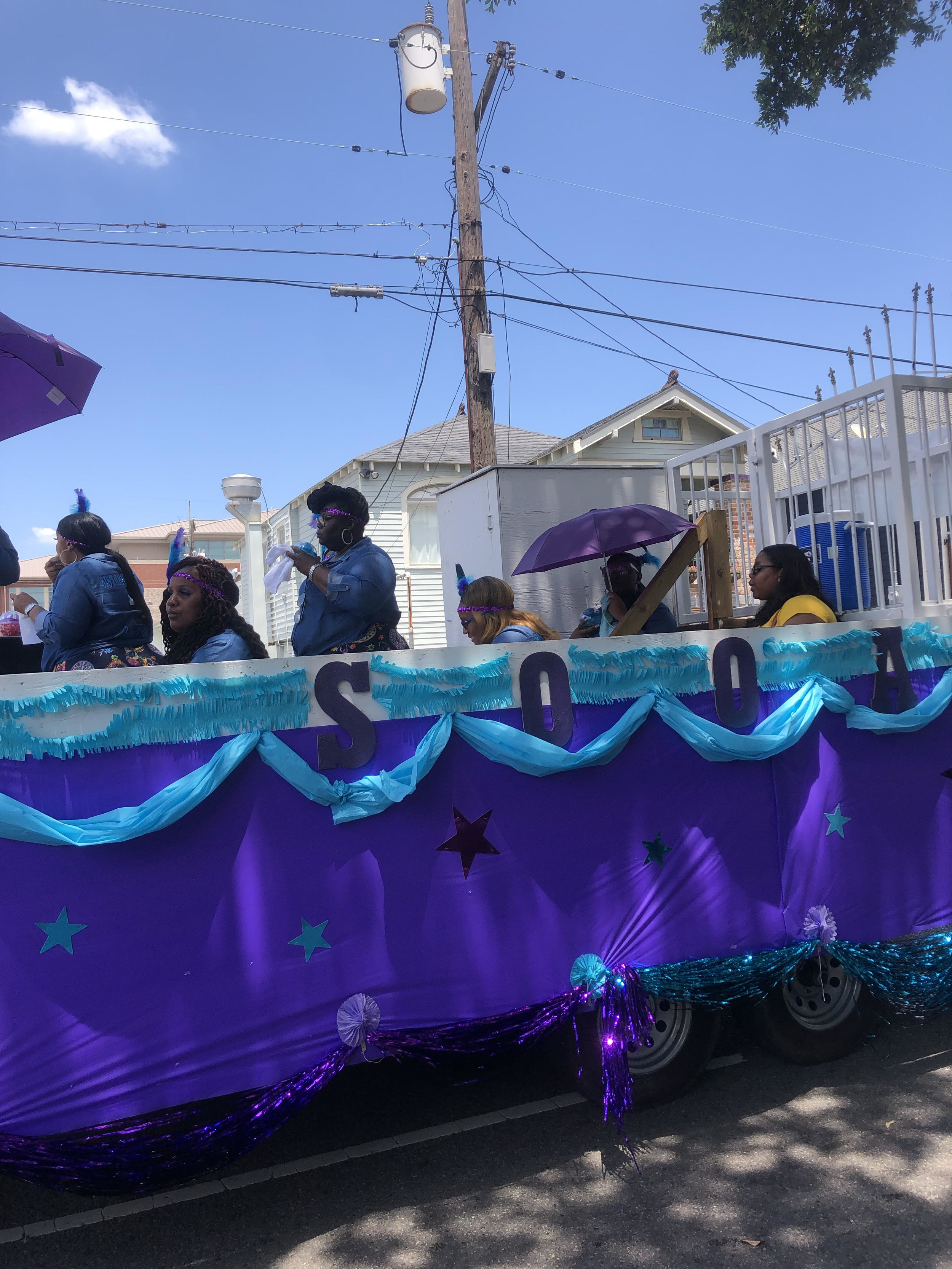
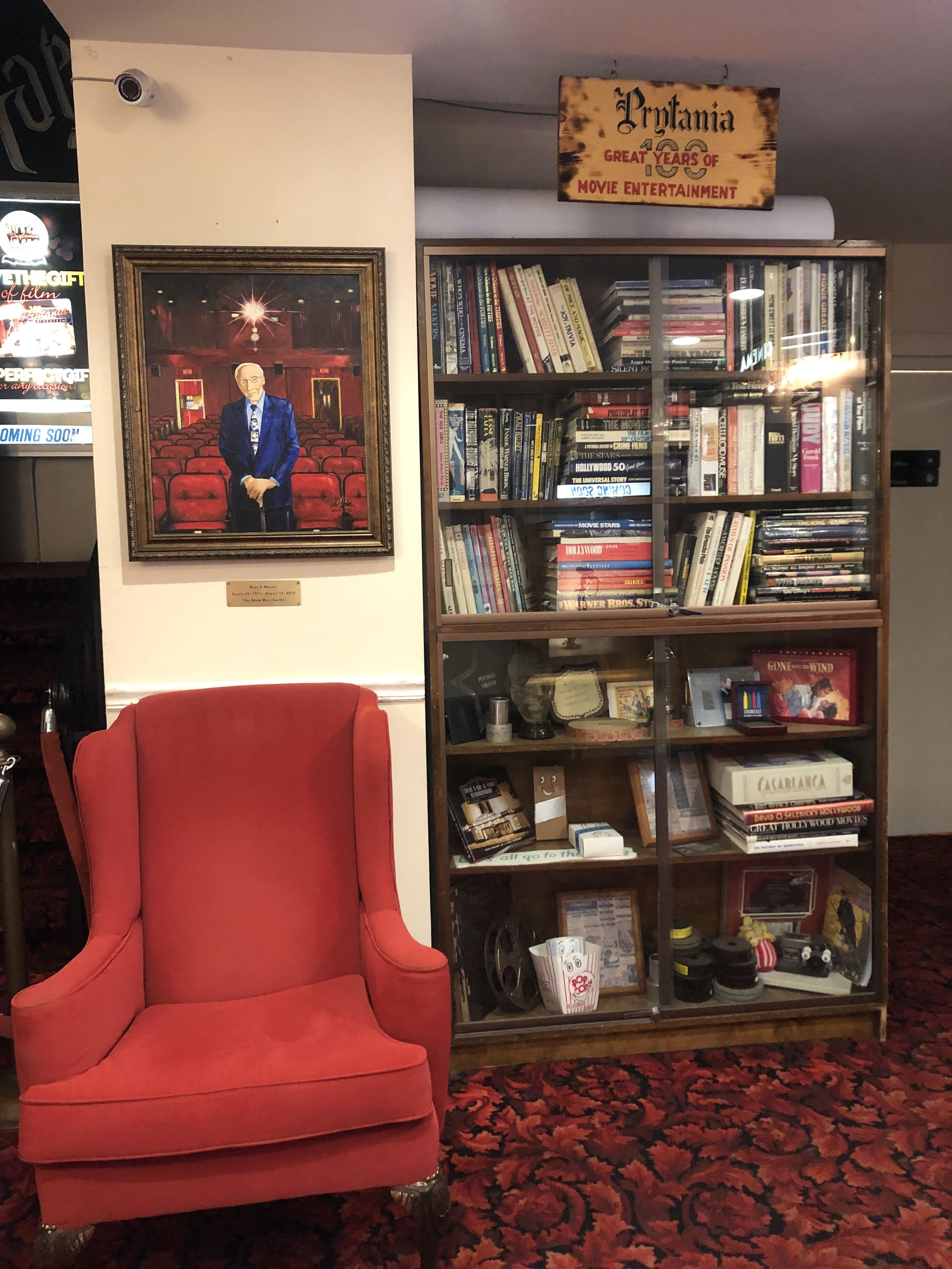
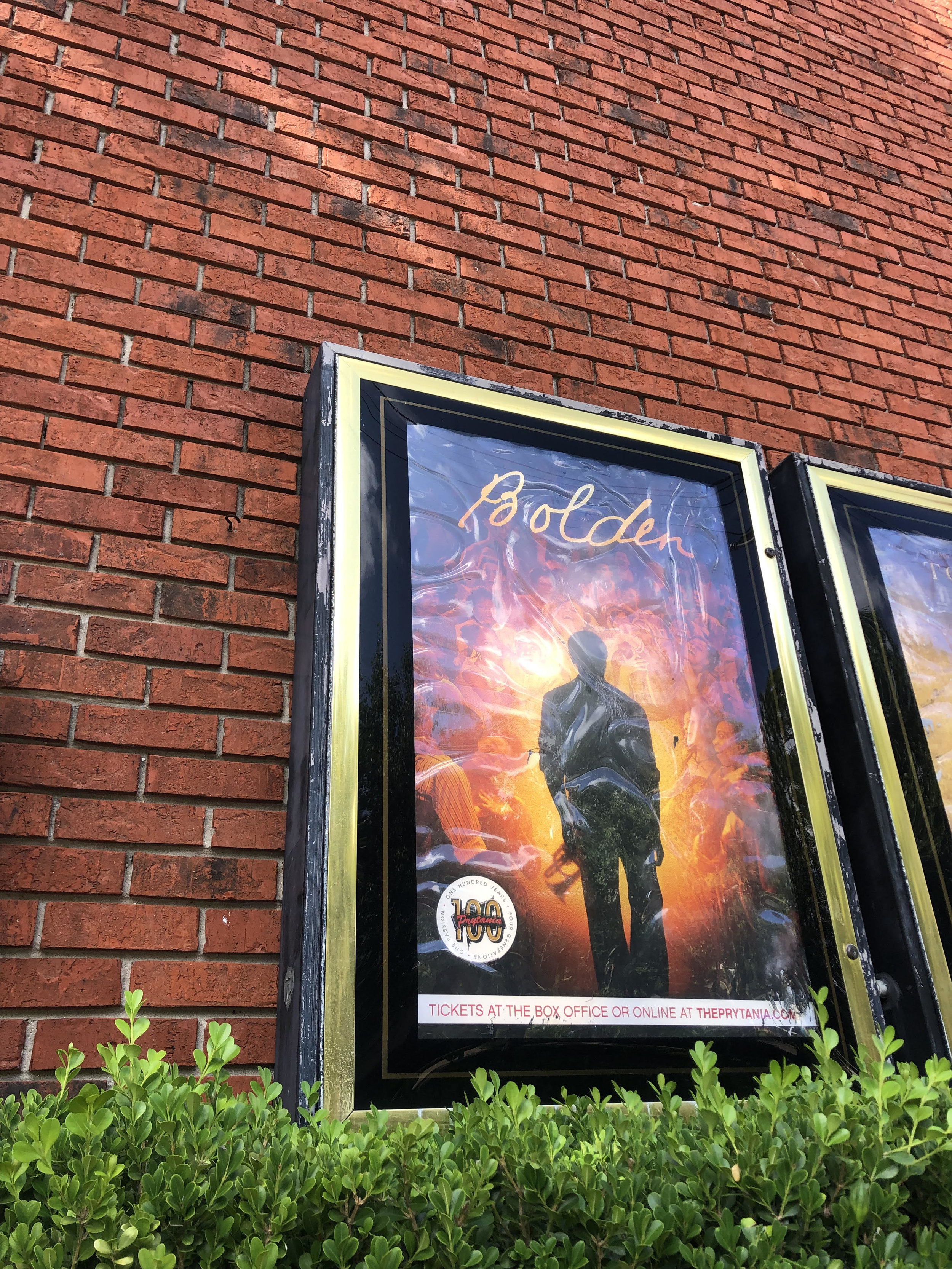
As I stood on the sidelines of the parade in awe of these two boys dancing in the front of the band, a club member pulled me aside to explain what they were doing. He told me about how this parade happens every Sunday and that all the floats and costumes I was seeing today would only be worn today, tossed, and then the start for something bigger and better would begin for the next year. He gave me the opportunity to slip under the rope to get a closer view and better videotaping of the two dancers. Before the parade moved forward in its celebration he told me, “Right there- is history. You just viewed History with these two boys, that video will become history”. And I believe him. It made me wonder if the people who watched Buddy Bolden perform, to the point of insanity, even had an idea of the impact he would have on a whole genre of music. Bolden didn’t simply play beautiful, intricate music, but truly played the culture of the city.
““There was pain and gentleness everything jammed into each number”. ”
Just as you can walk down Royal Street at night and see masses of homeless people and hear their muddled, drunk slurs, if you walk two blocks further down you will see the elegance of the moonlight reflecting off the beads hanging down from the balconies while listening to a beautiful women singing ‘At Last’ by Etta James. The deep pain and incredible joy jazz is able to create mirrors the existence of Buddy Bolden and the essence of New Orleans. Jazz takes things like the pain from a history of slavery and blends it with the resilience of a people who recovered and became better from a disaster like Hurricane Katrina into one mesmerizing melody.
Interview with a Stranger
In the days before coming to New Orleans, our group begun reading “Interview with the Vampire” by Anne Rice. This book does an astounding job at painting a picture in the mind of the reader of an old New Orleans in a world where Vampires exist. Great descriptions of a gothic and gloomy-feeling New Orleans that engage the reader, especially when I can look out the window of the little café—at which I am reading the book—and see rain clouds begin to pour rain that remind me only of the number two pencils I used to use in elementary school. Rain here in Louisiana is unlike the rain I see in California—It’s sporadic and strong, whereas California rain begins light and gradually gets stronger, but hardly ever as strong as this rain. Although this book—to me—was hard to read at times because of what I can only describe as pedophilia (I’ll explain this a bit more following this paragraph) between a vampire with a 5-year-old little girl’s body and two vampires with older male bodies, it was an overall good book and I can appreciate why it sells really well in bookstores all around New Orleans (two of the bookstores I went to were fresh out of copies).
On my claim of pedophilia in “Interview with the Vampire:”
A vampire by the name of Claudia was converted into a vampire at the age of five, and because of the way the vampire conversion method works in “Interview with the Vampire,” her body never aged past that, although her mind does. Despite it being made clear that she is an adult stuck in a child’s body, I cannot refrain from finding it repulsive that she is spoken of in a sexual manner on several occasions throughout the book. This was the largest obstacle I came across as I read this book. Apart from this, I thoroughly enjoyed reading “Interview with the Vampire” for the famed book it is.
One Conversation: Stranger to Friend
Much like the style introduced at the very beginning of “Interview with the Vampire,” I decided to conduct my own interviews with strangers I meet while in New Orleans. Not only do I want to get a sense of what people think of New Orleans, regardless of whether or not they are locals. In a separate blog, I will be conducting similar interviews with members of my bookpacking group. I find it very interesting to pick at peoples’ brains and explore the many diverse points of views people have. I don’t enjoy having scripted conversations, and therefore I will be playing all of the conversations by ear, letting my questions flow out according to the situation. I believe this will come off as more genuine and more comfortable for both parties. In an ideal world, I would have gotten pictures with my conversation buddies, but I did not want to impose too much, as they were already kind enough to agree to being in my blog.
To kick off my stranger to friend series, I will be introducing Chris, who I met at a place called “Lucy’s Retired Surfers Bar & Restaurant.” Lucy’s is located nearby our bookpackers living quarters, the Lafayette Hotel on St Charles Ave. right next to the Lafayette Square, which hosts weekly community concerts on Wednesdays (more on the great sense of community I have felt in Louisiana later).
Lucy’s Retired Surfers Bar & Restaurant, New Orleans.
Source: https://media-cdn.tripadvisor.com/media/photo-s/05/fa/23/9a/lucy-s-retired-surfers.jpg
Chris
I met Chris when I headed over to the bar at Lucy’s and sat on the barstool right next to him, he was the only one sitting at the bar who was there alone and looked like he was willing to engage in a chat. Chris appeared to be in his early to mid 40s. As I sat there looking at their shelves deciding what cocktail I would like to order, I looked over to him and noticed him glancing at the television every now and then as highlights of the Boston Celtics and Milwaukee Bucks game ran on ESPN. “You much of a basketball guy?” I asked. “Yea, basketball’s pretty cool,” he replied. “Assuming you don’t root for these two teams normally, who would you root for to win this series (referring to the NBA playoffs that were going on at the time) and why?” I asked. To which he replied “well…I’d love to see the Celtics take it all and that’s mainly because I actually live in Boston, ha-ha.” “Oh! That’s cool, I am also rooting for the Celtics because I became a fan when they played the Lakers while I was in middle school going against all my friends who rooted for the Lakers. I like choosing the opposing team to my friends because it makes things much more fun. It’s partly why I am a Clippers fan, but you know how they ended up (as usual)…How is life in Boston? How do you love being part of a winning city (referring to the continuous victories of their teams: Patriots, Celtics, Red Sox)?” I replied. “HA! Well I gotta say it’s pretty great, but I’m a Saints fan. I was born in Louisiana and I’ve always been a Saints fan…So the Clippers huh? Ouch.” “Yep, I’m a Clippers fan who is salty that we never got a chance to do anything really significant while we had a great lineup with Lob City (referring to DeAndre Jordan, Chris Paul, and Blake Griffin core) ha-ha. I’m actually a Saints fan myself, despite spending my entire life in Los Angeles. I never warmed up as closely to the Rams and I would have rather seen the Saints take on the Patriots in the super bowl, but they were robbed (referring to the 2019 Rams and Saints game prior to the super bowl)!” “Really? That’s interesting. I guess you have to root against the Celtics here with me then!” We continued talking about sports for a while longer and then I transitioned to speaking about what it was like to live in Louisiana growing up. “What was it like growing up here? Are people always this nice here?” I asked. “It was nice, definitely a completely different vibe from Boston, but lots of friendly people in both. Not the biggest fan of the weather here. Things haven’t changed too much here from when I was a kid, a lot of the same.” I then asked him something I always like to ask people I converse with at bars. “Okay, looking at only the bottom shelf, if you had to choose one bottle to drink for the rest of your life, which would it be?” “that Absolute Vodka on the rightmost corner” he said as he pointed at the bottle. “What about you?” he asked. “Oh, always the Jameson. I love that stuff more than anything in this entire bar, actually. Can’t really ever go wrong with it.” I replied. “So, are you not a whiskey guy?” I asked. “No way. I pretty much only drink vodka ever. Can’t stand much else.” He asked me what I was doing there wearing USC gear and I explained the idea of bookpacking and found out he went to Florida State University. Him and I ended up staying at the bar conversing until closing and ended up telling me to give him a call if I was ever in Boston.
The Anonymous Woman at Lucy’s
In the same bar, Lucy’s, I met a woman who agreed to be a part of my blog, but would like to go on unnamed. I walked over to the bar to order a Jack Daniels with Coke, but ended up getting called from a few barstools away. I walked over and this woman, who appeared to be in her early thirties, said to me “I’ll give you five-hundred dollars if you take that jacket off and give it to me.” “What, are you planning on throwing it away? UCLA girl or do you just not like SC?” I replied. “No no no! I love USC, I actually wanted it for myself. A lot of my family went to USC, but they ended up rejecting me when I applied. I was devastated and sort of never got over it. I performed average in high school and scored less than ideal on the ACT. So, what do you say, will you sell me your jacket?” to which I replied “I’m sorry, but I can’t sell it. This jacket actually belongs to my roommate’s father…he let me borrow it because I own nothing like it.” “WOW! You wouldn’t sell it for five-hundred dollars? You can buy a few of those with that! Come on, you can buy him a new one, one for yourself, and keep the rest! However, I respect that. I was actually just joking! Had you accepted my offer, I would have gone down to my real price of fifty dollars ha-ha. How ‘bout the hat? I’ll give you thirty and a drink for it.” “Not for sale either! This is my favorite hat and it’s really sweaty, you don’t want it.” She asked me what I was doing there and I explained the bookpacking concept to her, which she loved. “Wow, now I’m even more sad that I didn’t get into USC! That sounds like such fun!” she said. “Are you from New Orleans?” I asked. “No, but I visit at least once a year with my friends” she replied. “What do you think of New Orleans?” I asked. “I love it here! This city never seems to sleep when it comes to night life and throwing beads off of balconies is the most fun! You definitely have to try it if you haven’t yet” she said. We ended up having a very entertaining conversation about college football and even had one of her friends join us. As the night grew older, she went to close out her tab and I noticed the Buffalo Bills logo on her credit card. “No way! Nobody ever recognizes their logo! I actually work for the Buffalo Bills franchise. I’ve been a fan ever since I got the job. “Wow that’s amazing! That explains your vast knowledge of football” I replied. Although her friends were calling for her to leave with them, she made time for giving me advice on possibly exploring a career within the sports industry.
Louisiana and the Sense of Community
Because I wear USC gear a lot of the time, I often get questions along the lines of “what brings you all the way over here?” And when I explain the concept of bookpacking to them, they love it and ask more questions about it. I am extremely blessed to have the opportunity to do this as part of coursework for school.
The most precious thing that I have gotten on this trip thus far is a great sense of community and the famed southern hospitality. As I’ve interacted with people in Louisiana, I couldn’t help but to notice how much of a sense of warmth I get. Everyone here is so kind and willing to engage in conversation. Having lived in the greater Los Angeles area all my life, I am not accustomed to greeting every single person you walk by. Whether it’s a simple smile with a head nod or an enthusiastic “hello,” you can’t pass someone by without at the very least acknowledging each other. And I’m finding myself unable to express how much I love this apart from reciprocating the genuine greetings. This is far better than any old souvenir. This is something special that becomes part of you and I cannot wait to bring this back with me to California and hopefully brighten peoples’ days.
A Bite of Impulsion on Bourbon Street
“I had seen my becoming a vampire in two lights: The first light was simply enchantment; Lestat had overwhelmed me on my deathbed. But the other light was my wish for self-destruction. My desire to be thoroughly damned.”
This is a short story inspired by Anne Rice’s “Interview with the Vampire”:
Wednesday, November 17 2021 — 2:13 a.m.
It’s been two years since I was last exalted in my search for the most bittersweet forms of intimacy. After my former lover left me, it was important that I, during that lonely period, explored the spectrum of emotion to a severe degree. I lost myself many times but always managed to be strung through my mental traumas by a thread of an unpromising purpose. As I was incapable of being of myself, my thoughts were possessed by terror, and somehow comforted me into the most darkest realities. I endured the terror, resisting beliefs that were never my own because they did not contribute to the solidification of my mental fortitude. This cycle lasted up until the summer of 2019, when I arrived to New Orleans to immerse myself in the very culture wherein many literary icons kicked off their careers; Tennessee Williams, Kate Chopin…
Williams. Have you read his plays? Streetcar? And would you consider yourself a contemporary soul of the literary bohemia? Were you immortal then?
Easy, Mr. Molloy. I admire that you, such an impassioned journalist, bleed with eagerness. Be patient, and I shall answer all that you wish to know to the best of my abilities… No, I have not read Streetcar. I have only read a short collection of his poems. And, no, I do not consider myself a soul of the literary bohemia. I grew up in an era of advanced technology. It pained me to witness the loss of childhood essence. It is difficult to exist in the “now”, as a writer. Rapid productivity leaves me no time to make sense of the chaos. I am useless, by nature, because, as I mentioned before, I resist beliefs that were never my own. Let me mention one more thing before I begin to tell you of my last night as a mortal.
Of course.
I never expected for my desires to become corrupted by dark wisdoms. I found that they no longer aligned themselves with the course of this journey. It was on my last night as a mortal that I learned, admittedly inebriated and vulnerable, my time on Bourbon Street would be the last bite of life I would ever taste. Having once been terrified of Bourbon’s mutable nature, I used to walk amongst my own kind, immune to the modes of happiness, excitement, or sadness that penetrated my numb heart. It is strange, this “after-life”, because I can taste a glimpse of life when I devour it; and for just a moment I am aroused with emotions from my past. I lean towards my master’s darkness, my tongue now infused with wisdoms I once feared. I am of myself, but with no hope and a widened perception of possibility. Forgive me for being so severe in this moment of reflection, but as it will always be something from which I must suffer time and time again, I am learning how to sense the nearness of circumstances that will challenge my weakest convictions before it is time to redefine what there is left of my selfhood. Here I go; to let you, Mr. Molloy, take a bite into my truth.
Thursday, June 6 2019 — 11:00 p.m.
I began to sweat profusely in my third hour on Bourbon Street, naturally unbuttoning my long sleeve shirt as beads were flung overhead. Limp hands spilled cups of alcohol as they rose under balconies welded with fleur de lis. I watched the beads shift their shapes through the luminescent dark sky with a seductive elegance that compelled me to raise my arm. I had a firm belief that I was the intended receiver of such repulsive flattery. The sweat, trickling down my collar bones, teased a drunken passerby who was pale in complexion but expressive with lust. This gentleman — my master, rather — enchanted me just before he reached up for the beads, crushing them in his palm before beating them against my chest. His soft hazel eyes met mine with a hunger that left me paralyzed amongst the savages of the night. The multitude of voices called my attention to everything. And as I breathed in the sounds of chaos, my heart thumped irregularly. I watched him meander through the swarm of drunks. I could not place my attention on anything but his alluring guidance. The voices blended into one ferocious roar, so I scuffled through the crowd in a desperate attempt to closely follow behind. My eyes shifted in many directions, in secret want of my master; but in a matter of seconds, I was deeper into Bourbon Street, alone and misguided.
I rushed past neon lights emitting beams over daunting faces; deathly stares electrified with reds, greens, yellows. There was no space to recollect myself, for even the petite woman, with a fear-stricken vulnerability, wobbled through maddening men with such difficulty. I wished to join her, and to speak to her about the dangers of our being alone. But a large man who overlooked the weaker savages of the night grabbed ahold of her waist and led her through to the back with an air of possession. His electrified stare blinded me, so I retreated back to the street and wandered about. Many gaping mouths shouted obscenities at my face. I was sure that my life would end there; only, I did not imagine it to happen the way that it did. I nudged past a group of men fist-pumping at two blondes who lifted up their blouses. I applauded them, not for the courage, but for their power in draining the men of their manhood as they walked away with a dignity which was worth more than the plastic beads that spun in the air; those are the kind of savages I like to prey on at night.
I saw my master waiting patiently in the dim corner of a bar, wiping red liquor off his lips; his lustful glances arousing my desires. I held my head firmly, feeling my neck veins pulsate with terror, and narrowed my eyes as I approached him. I grabbed a napkin from the bar counter to pat my gleaming collar bones. And with a forced sense of arrogance I rolled my neck slowly to the soft tempo, daring him to take note of me. I want this, I thought to myself. I was vulnerable, in a pitiful sense. And desperately wanted to be lain to rest by my master. Had I known then that I had submitted to his dark wisdoms with a premature attachment, I may have spared myself the amplified modes of emotion I felt after he converted me to an immortal being.
A bar stool became available beside my master. I sat on it, my legs crossed with a fierceness meant to repel his domineering arrogance. It was a gamble for life, in all honesty, for the Aztec tattoo, clawed across my chest, betrayed his subtle desires for me. He stepped forward, staring deeply at my chest, when I lowered my eyes to avert his passion. But it was too late. I had subconsciously unbuttoned the rest of my shirt, communicating that I was at his mercy. He understood, as he brushed his hand across my Aztec tattoo, that I meant no harm because I was incapable of causing any. I closed my eyes and swayed to the incongruent sounds of Jazz, when he leaned into my neck, breathing gently “Be mine on this night.” The bartender slammed his palm on the counter and shouted at me to order. My master walked out. Double shot of whiskey to down, before I followed my master with a starving curiosity.
Out on Bourbon, from a distance, I noticed that he had an effect on the drunkards; they seemed to disperse from his path, which gave me enough room to stumble behind without losing sight. He stopped at the corner of St. Anne, and turning left where Marie Laveau’s House of Voodoo stood tapped his long white nails on a pillar as he stared up to the moon. The warm air slowed my pace. I halted, inches from him, losing my balance on broken cement; my heart beating irregularly at the sight of his luscious curls. I looked up to the moon to join in the wonderment when I heard an indiscernible snap from a distance. I looked down both directions of the street panicking when the desolate sights blurred into fragments of dark spaces. My vision stabilized when I spotted him on top of a balcony that was bordered by a black gate with coiled bars. I ascended, running my fingers on the railing, when he turned to me and guided me to the edge with his hand on the back of my neck. Rubbing his cold thumb over where he would claim my life moments later, he whispered, “Do you wish to know of possibilities?” I nodded as he softly brushed his fingers over my eyes. Then, he kissed my neck once, sighing with gratification as he dug his nails into my back. I couldn’t shriek, but I gripped onto his curls hoping he would remove them. He shushed me; I remained silent. “Tamed passions,” he said. “They escape when wounds are left unattended. And what I sense from you, my boy, is your rage in loneliness. I feed on the most vulnerable flesh, but I promise to cleanse you of loneliness. You will become mine tonight.”
Wednesday, November 17 2021 — 2:59 a.m.
Mr. Trejo, what… what happened to you that night?
Call me Leonel, Mr. Molloy. My Master, he sunk his teeth into my neck. With one arm wrapped around my waist, and the other clasped into my hand as I weakened from the drawn blood. When he released, I leaned over the balcony to vomit. I stared out to Bourbon Street, knees trembling, and listened to the music fade in and out. I remember thinking nothing of its chaos as the darkness expanded before my eyes. Immortality is an existence in which I must feed on the vulnerable; my master taught me that. I awoke the following morning, here; a plantation of ruins hiding unbearable historical tragedies.
What kind of historical tragedies?
Enslavement of African peoples; displacement of Indigenous peoples. I have yet to unravel them on my own terms, but for now I am to oversee the property, tending to vagabond night walkers when they drop by to rest from sunlight.
May I ask? Does your master own the property that you oversee?
No. My master was a victim of the owner himself. I will say this to you, as Sir Louis de Pointe du Lac many a time reminded your great grandfather, Daniel. You mustn’t be so shy to ask questions. You know, I picked up the Molloy scent the moment you stepped in front of that gate. If you’ve come here to seek what ruined your grandfather, I am afraid you have interviewed the wrong vampire. I do not meddle in familial matters.
Well… I am not exactly a Molloy by blood.
I understand, Mr. Molloy. Regardless, the vampire with the answers is not myself, nor my master. Sir de Pointe du Lac is the one you seek. Ask him anything you’d like to know. He stands there, right behind you.
New Or-lee-ans? New Or-lens? Naw-Lins?
On Tuesday, we arrived excitedly—and with aggressively rumbling stomachs—to New Orleans, ready to start exploring the various cultural pockets the city has to offer, while reading Anne Rice’s Interview with the Vampire, Michael Ondaajte’s Coming Through Slaughter, and other novels set in the Big Easy. We were more than anything, ready to eat. But that is beyond the point. We began carving into Interview while on the long car ride into the city from Grand Isle. Our first three days there would be spent looking through the eyes of Anne Rice and her vampire protagonists, observing first, the European influences that give New Orleans its Gothic and ornate charm.
“There was no city in America like New Orleans. It was filled not only with the French and Spanish of all classes who had formed in part our peculiar aristocracy, but later with immigrants of all kinds, the Irish and the German in particular. Then there were not only the black slaves, yet unhomogenized and fantastical in their different tribal garb and manners, but… the free people of color… who produced a magnificent and unique caste of craftsmen, artists, poets, and renowned feminine beauty. And then there were the Indians, who covered the levee on summer days selling herbs and crafted wares.”
Louis describes a diverse and exotic city—relatively compact yet brimming with a “medley of languages and colors,” full of enough fascinating characters that a Vampire could blend in comfortably. Such a description seems initially as fantastical as the bloodthirsty subjects of Rice’s novel, and yet one quick stroll through the French Quarter—with its Spanish architecture but otherwise French influence—or the Garden District—with its “magnificent Grecian houses” and eerie above-ground cemeteries—proves otherwise. Louis’ perspective couldn’t be more grounded in reality. That being said, there is no better way to show the endurance of New Orleans’s diverse bizarreness and colorful characters than to recount some of the strange and whimsical experiences I have had thus far. The following vignettes vary in tone and seriousness, as does the history and culture of the Big Easy.
----------------
I: “Applejacks”
On the night of our arrival, a few of us, though ravenous, held up the rest of the group, insisting on buying postcards for our family members immediately. A bit disoriented from hunger and general misunderstanding of our new home, we found ourselves walking along the grimy epicenter of neon-lights and unsolicited conversations with zombie-like strangers: Canal St. We explored the kitschy and somewhat scandalous merchandise of Voodoo Mart, finally settling on two of the more tasteful postcards from the options on display. Voodoo Mart didn’t sell stamps, however, so we set off along the flickering lights and uninterrupted stares of Canal St. towards a place that did.
We found ourselves at a convenience store that sold small stamp packets, hastily gathering change to make our purchase and finally find food! As I was gathering my things, I noticed that Cameryn, a fellow bookpacker standing outside the store, was filming in my direction. I made some funny faces until my stomach dropped and I felt the presence of the real reason for her videoing. Two pointed objects put sharp pressure on my shoulder and something fluffy flapped excitedly, tickling my ear. To my horror, I see in my peripherals that a pigeon had landed on my shoulder and was now comfortably adjusting itself on my new white blouse. I felt his wing on my ear and wondered dramatically if this was how I would die. My bookpacking peers found this hilarious, naturally. My face was puckered in horror, my chin bunching as I fruitlessly attempted to move my face away from my unsolicited companion. The pigeon’s owner—or friend, perhaps—was an ill-fed, dirty blonde man with hunched, skinny shoulders sticking out of his sleeveless, tattered shirt and rugged, black-denim vest. I turned to him slowly, afraid that whatever movement I made would trigger my new pigeon-friend’s bowels. “God favors you,” he said, pointing his finger at me. “He’s blessed, you’re lucky, God favors you, you are blessed.” I asked him to please remove his pigeon off my shoulder. “He’s a pigeon-dove, actually, and his name is Applejacks.” He effortlessly picked up Applejacks’ fat body and placed it on his own shoulder, turning one last time to me, nodding reverently at my blessed-ness, before leaving to say hello to a friend wearing ill-fitting jeans, no shirt exposing a massive cross tattoo on his lower stomach, and carrying what was either a cane or a samurai sword.
II: “Around the Corner”
It was our first full day in the city and our group was roaming the French Quarter, appreciating the quaint streets so lovingly described by the sensitive vampire Louis, peering through the various openings and tunnels in brick walls that showed glimpses of mysterious yet inviting garden patios shaded by sleeping palmetto leaves. As we walked down Royal Street, the very road on which Louis and his vain and ruthless companion Lestat lived, appreciating the gorgeous view under an oil-painted sky, a black van with a blue stripe slowed down next to our group and a rather gaunt driver with sports sunglasses resting on a hat of oily, thinning hair stuck out his head and announced, “There’s weed around the corner, come stop by later, we got cannabis, joints, CBD oil…” and pointing a malnourished finger at each of us, said with matching rhythm, “weed, weed, weed, CBD oil, weed, weed.” We remained still for a moment as he drove away, and then broke into bewildered chuckles. Only in this city can you be at one moment, appreciating gallery-lined streets on a quiet day, and then almost immediately be accosted by drug dealers announcing their goods like one would a free concert, or ice cream. Needless to say, we did not attempt to locate the weed around the corner.
III: “Interview with the Vampire”
There’s a real vampire shop on St. Ann street.
IV: “Soft-Serve”
Note: In this vignette, I attempt to channel my inner Ignatius J. Reilly, protagonist of another book we read for this course, A Confederacy of Dunces by John Kennedy Toole. Granted, I fail miserably. Enjoy.
For existing in such a hot climate, New Orleans does not appear to have any decent ice cream shops. Sure, there is the occasional fudge or candied apple store with a few neglected rows of hard-scoop ice cream also for sale, but no amount of looking will find you a freshly made waffle cone, and don’t even bother asking around for a cake cone. Chocolate and vanilla swirl? Forget about it.
One might respond indignantly, “but what about so-and-so gelato shop on such-and-such street?” I hesitate to respond, knowing that some wrong opinions just can’t be changed. I turn slowly to the asker, the enlightened words whispered from my barely parted lips, “my friend, gelato will never be soft-serve.” Oh, how at that moment I envied their blissful ignorance.
Continuing my fervent search down Royal St., I found a total of zero ice cream shops and instead, at least fifteen art galleries and five shops dedicated entirely to selling chandeliers and chandelier-adjacent crystal atrocities. At this point, I’m desperate and incredulous.
Depleted and morose from my futile search, I settled on some homemade chocolate from a store that doubled as an antique shop. To my utter horror, the attendant was busy selling a lamp to another person! Unable to wait any longer and at my wit’s end, I exited with a huff.
From this experience, I can only conclude that New Orleans holds lighting fixtures to a much higher esteem than ice cream. A total disgrace!
V: “Coin Shop”
During a loan trek down Royal St., I stopped by a vintage weapons and coins shop, noticing that the store clerk was a young woman with short hair and blunt bangs, maybe just a few years older than me, slumped on a stool behind the counter, looking nowhere in particular, with an unprovoked expression. I wondered whether she had always lived in the city, and what brought her to working at that bizarre little store, which sold coins darkened by age for more than one-hundred dollars.
VI: “Street Poets”
Walking down Royal Street on a particularly crowded and sunny day, we took delighted note of a wonderful New Orleans street tradition. Poets sporadically lined the streets, hunched over bare-bones typewriters on little folding tables, crafting poems on any topic on the spot. Our bookpacking buddy, Kayla, asked one with a nicely groomed mustache and a turquoise machine to write her a poem about love. According to him, he was from Illinois but with “a lot of kin in Kansas” and had a speech impediment that made his l’s and r’s difficult to say. We asked him to read his piece out loud—a rather twisty piece of poetry, speaking more on shyness than passionate love, but altogether quite thoughtful considering the 10 minutes it took to write. Proud of this particular piece once he had heard it out loud, he asked if Kayla would email it to him later, rushing back to his typewriter, flipping the poem around, and immortally printing his gmail onto the back of the paper.
VII: “La Vie en Rose”
After a long day of roaming the French Quarter with my class, I decided to set off by myself in the cool afternoon, listening to Interview with the Vampire as I walked the same streets on which Louis, Lestat, and Claudia lurked in the night. I settled on the Café Beignet patio, under the shade of a melancholy live oak, listening to the ladies next to me gossip and watching the young man a few tables away playing video games on his computer while communicating strategy to his distant companions through a large green headset. Rarely have I been able to just sit and look out, not since a tumultuous academic year of self-doubt and constant inner dialogue. In that moment, I was not necessarily at peace, but at least mentally silent, finally allowing my mind to quiet down and let the sounds and pictures in front of me take full control. A saxophone player leaned on the fence separating the patio from the sidewalk, back towards the subjects of my observation, and filled my quiet mind with a sweet rendition of La Vie en Rose. I happily forgot where I was and what I was doing, just for a minute or two.
VIII: “You Dropped Something”
Having sweat through all my available blouses, I was walking with my friend, Tara, to the H&M on Decatur street when we hear, “Ma’am! You dropped something… ma’am, ma’am!” We tried to ignore the voices, thinking they might be con-artists or clever loiterers, but hands patting pockets and detecting genuine concern, turn around just in case. The voice, belonging to a stylish young man popping seemingly out of nowhere, says “you dropped… A CONVERSATION WITH ME,” reaching out his hand. We turn around instantly, laughing at our own naiveté and with great admiration for a pickup line we would surely be using later.
IX: “You Are My Sunshine”
Tara, Kayla, Alex, Cameryn, and I were walking back from brunch one Saturday morning, relieved that the rain had stopped right as the check was paid. The sky was clearing up, pouring light on Royal St. at its most vibrant thus far. Whether it was the blessing of Applejacks the pigeon-dove, or the general serendipity that seems to float through New Orleans on any given day, we all shared a tingly, happily feeling that luck was approaching. There was a lightness to the air, and we all felt an inexplicable whimsy. We had watched a show of bubbles dance outside the restaurant window earlier, seeming to celebrate our arrival, and tingly feeling rising, happened upon a musical block party on our way back. A brass band was playing on a stage, in front of which Baby Dolls danced, calling on the audience to sing along. Together, we sang “You Are My Sunshine,” clapping and two-stepping, looking up at the sky and around at each other, so grateful in that moment to be in a city where one can happen upon so much happiness at any moment’s notice, unplanned.
----------------
Such was the city of New Orleans. Just in the first three days, I found myself face to face with the charm, humor, and unapologetic weirdness of a city that embraced every facet of itself. New Orleans is unique, transgressive, and surprising like no other city I have ever visited. No wonder Anne Rice spoke of it with such tenderness—the people are as colorful as the buildings lining the French Quarter, its history as ornate as the ironwork on the city’s notorious balconies, and its eclectic citizens as warm and delightful as its famous beignets. Never a more interesting cast of characters have I met than in New Orleans.
“This was New Orleans, a magical and magnificent place to live. In which a vampire, richly dressed and gracefully walking through the pools of light of one gas lamp after another might attract no more notice in the evening than hundreds of other exotic creatures…”
Lively Living in New Orleans
I Met a Vampire in New Orleans
“The air here in New Orleans is different; it’s sticky, heavy with the perfume of culture that stings the nostrils and fills your lungs with electricity while the trills and whines of flavorful jazz penetrate your ears. Before venturing to the city, just hearing its name plants a tiny, luminous seed in your imagination that doesn’t need water to grow, only anticipation. Where Grand Isle can lull you into a comfortable sense of tranquility, New Orleans proves to be a passionate removal from that.
“Interview with a Vampire is set in New Orleans (along with the plantations of Louisiana, and an adventurous stint in Europe) and follows Louis, a young indigo plantation owner who thinks he wants one thing: to die. His death, however, comes with a catch – immortality from the generous hands of the vampire, Lestat. Louis takes us through years and years and years of New Orleans, retelling a story unlike any human could.
“As a human, Louis’ life on his plantation was meaningless – his brother’s death weighed too heavily on the boy’s shoulders which caused him to unsuccessfully search for life’s answers at the bottom of a bottle. This behavior naturally invited violence, with the hopeful possibility of reprieve from Louis’ damnation: his death.
“Enter Lestat, the mysterious savior in need of a companion – an apprentice of sorts – who rescues Louis from a mugging and gives him the incredible gift that every mortal dreams of: everlasting life.
“Lestat wanted to reintroduce Louis to the world, to show him New Orleans through the eyes of a vampire, a nocturnal city rife with the ichor of life free for the taking, a city where a vampire could disappear without even trying. To be honest, I feel sorry that Louis could not see the city as it is today. Still, his recollection of the city is bittersweet – beautiful in his ability to transport you into a different era yet depressing in his newly discovered love for humanity. A man suddenly appreciative of the beauty of mortality after becoming immortal. But, I digress.
“For most mortals, a conversation with a vampire is fascinating for the simple fact that history is changing before their very eyes, it’s evolving with perfect clarity, allowing you an opportunity to live hundreds of years ago just as another human did. Could you imagine walking down Bourbon Street with Louis, avoiding horses and carriages as gas-lamps flickered overhead like dancing motes of fire? Or wading through streets filled with suits and corsets flowing in and out of cabarets like colorful debris after a heavy rain? This was of course a result of the influx of inhabitants flooding the city, bringing with them an endless night that blanketed the city in an ethereal blanket of pleasure. Unfortunately, Louis found this to dampen his love for mortals – their incessant raucous, the choking numbers, the ease and sheer anonymity of preying on unsuspecting victims where one would disappear and another would take their place immediately. And luckily this growing dislike of humanity allowed Louis to expand his palette and finally eat something bipedal – the rat phase was quite revolting. Still, for all his brooding, Louis did part with some worth-while advice: “…our eternal life was useless to us if we did not see the beauty around us.” And there was beauty — the apartment Louis and Lestat lived in was the epitome of beauty, adorned with crystal chandeliers and Oriental carpets, painted Chinese vases, delicate marble Grecian gods that danced under the songs of golden canaries. And the beauty of freedom for Louis, for it was in this apartment that he murdered Lestat — his friend, companion, and savior.
“Today, the beauty of the old world is hidden beneath a haze of iridescent lights, squished between towers of glass that scrape the sky. Even the welcoming shudder of passing streetcars is drowned out by traffic and blaring car-radios. The marble tombs of the deceased that slumber peacefully in Lafayette Cemetery are no longer interrupted by grave diggers burying plague victims, they’re interrupted by street peddlers selling cheap wares and tour guides attempting to out-do one another.
“But still, the history is here – and that is truly a comforting feeling. Everywhere you look betrays a nook where Capote wrote or a bar that Hemingway drank in. Where you can step into Preservation Hall and be asked to just watch and listen without the urge to capture what you’re experiencing, to live in the moment of that extant jazz. Gothic mansions rise behind the modern businesses of Magazine Street, reminding you the past is never far away. No matter where you walk, if you look upwards you’ll find people drinking, smoking, reading at a table on their wrap around balcony, jazz playing all night through open parlor doors, and the sound of life forever on the wind. It’s the reason why New Orleans is so fascinating, because its history refuses to leave. Because it still deserves its place in the city.”
“Wow, interesting story,” I said to the man, not wanting to be rude as we waited alone for the streetcar. “Are you a writer?”
“I didn’t tell you?” he asked with a sharp smile. “My name is Lestat.”
Would I be a Vampire?
Would I be a Vampire?
The deeper connotation of the Southern gothic literary style in “Interview with a Vampire”
As a tween during the height of the craze behind the Twilight series as well as growing up watching the television series the Vampire Diaries, I have obtained a mild fascination with vampires and their folklore over the years. I was very excited to read Anne Rice’s “Interview with the Vampire.” Its cover boasts that it is “the spellbinding classic that started it all” and I was curious to discover it for myself.
The novel follows the vampire Louis as he retells his life from human to vampire along with those that he has loved, loathed and lost. Throughout his prolonged existence, he grapples with his sense of self and what he must do to survive. The story’s setting traverses several areas of Louisiana including the bayou, swamp, plantation, and city. The trip’s itinerary perfectly encapsulates the Southern gothic style by allowing us travel in and out of the city to perceive the variety of locations in the novel.
It is the second week of bookpacking and we left the Grand Isle and started our trek to New Orleans with a brief visit to the bayou with the “Cajun Pride Swamp tour.” It very much sets the scene for several scenes in the novel. It provides me with the visual images that are so intricately described in the story, though I don’t always recognize it at the time.
In my case, bookpacking allows for a very reflective experience. At the time we see some of the sites, I do not always understand their relevance, but I go into the situation with an open mind. For example, during the swamp tour, I had not yet reached the portion of the novel where Louis and Claudia attempt to kill Lestat and deposit his body in the bayou, but I was able to understand its pertinence and draw on all that I had seen during the tour. I remember the gators gliding through the water, ordinarily hunters rather than prey, but when Lestat occupied their territory, they became his prey so he could survive. I would not have been able to understand Anne Rice’s vivid descriptions had I not been on the tour. Although it is a clear tourist attraction, its scenery enhanced my experience reading “Interview with the Vampire.”
After we depart the swamp and bayou, we travel to the infamous city of New Orleans. It is different than I expected but beautiful nonetheless. The French inspired architecture of the Garden District and French Quarter make me feel as if I am walking through a different time. The opulent style of architecture makes me very aware that they do not make buildings like that anymore, as made evident by the skyscrapers in the distance that can’t be ignored. I try to imagine a time when skyscrapers had not yet existed and drift into Louis’ mindset as a vampire having seen New Orleans’ metamorphosis. The city is such a beautiful place full of history, mysticism and nostalgia. It doesn’t deny its history and I appreciate that. The same can be said of the Whitney Plantation.
The Whitney Planation is a solemn place not because it is lacking in beauty but because if one did not know their history, the beauty would disguise the atrocities committed there. The tour guides at Whitney Plantation do not allow the beauty to serve as a façade. The group follows our guide Ali in silence, absorbing his every word. He makes sure to emphasize that they are not slaves but rather enslaved peoples. “Slave” is a dehumanizing term and all those who suffered its atrocities deserve an identity rather than being reduced to a piece of property. Human beings are not property and saying “enslaved people” recognizes the historical process and institution of enslaving people.
I very much appreciate their choice of language. The United States is a nation built on the blood of minority groups and people of color and if people do not recognize that, it is a choice that is not only historically illiterate but perpetuating ignorance. Our tour guide Ali points out slavery’s connection to the systemic inequality of today as it exists in the prison industrial complex. His references strongly resonate with me because it very much puts the South in perspective for me and brings a deeper meaning to the Southern gothic style.
““Evil is always possible. And goodness is eternally difficult.”
― Anne Rice, Interview with the Vampire”
As Andrew stated, the Southern gothic style is full of “opulence and a state of decay,” along with more figurative connotations. As Cameryn mentioned in class today, it symbolizes the disempowerment of the power and prestige of the South. Behind all the emotions and prose in Rice’s writing, there are Louis and Lestat, metaphors for deterioration. While Louis’ ideology modernizes, he recognizes what he is and the evil nature within him, Lestat decays, unable to exist in his former “glory” if he does not have someone to subjugate. The ways of the old South could not succeed without the enslavement of African-Americans and the tropes of Southern Gothicism are a metaphor for the decay and disempowerment of this ideology.
““The world changes, we do not, therein lies the irony that kills us.”
― Anne Rice, Interview with the Vampire”
So, would I like to be a vampire? Most likely not, an endless existence watching those I love die does not seem like something I would enjoy, but it was a pleasure to live through Louis and understand the metamorphosis of New Orleans. Until next time…


